


Pakistan's edible oil consumption stands at 4.7 million tons (FY21) and it is projected to grow to 5.9 million tons in 2025-26. The per capita consumption of edible oil is 24 kilograms. Moreover, the import of oil seeds accounts for $3.8 billion per annum in the import bill.

Dalda has become Pakistan's leading edible oil company. To keep our legacy alive, we believe in promoting local edible oil seed crafts by training farmers all over Pakistan. Dalda has successfully trained 200 farmers in the field of production
technology of sunflower oil to increase their per-acre yield. Hence, our initiative to promote local edible oil seed crafts has multiple benefits. While it creates advantages for local farmers, it also contributes to the increase in the domestic production of edible oil seed, benefitting our loyal consumers.

Dalda has built various research and development (R&D) centers in Pakistan. A 24-acre R&D center, equipped with state-of-the-art machinery and modern agricultural techniques was built in Gharo, Sindh. Moreover, a 6-acre R&D center equipped with state-of-the-art machinery and modern agricultural techniques was built in Tando Jam, Sindh. Quality work centered on sustainability and innovation is executed in our R&D centers.
In Gharo and Tando Jam our work is primarily focused on researching and developing oil palm, sunflower oil, olive oil, canola mustard oil, soybean oil and value additional crops such as chilli and other vegetables. Furthermore, our work at the R&D centers branches out in different fields such as seeding, experimentation, yield evaluation, training manuals, awareness and seminars for local farmers and farmer’s yield evaluation.
Our future mission is to expand and reach deserving farmers all over Pakistan, as well as be the leaders in quality and innovative techniques in edible oil production.
Wide gains have been registered within local farming communities due to our initiatives. Moreover, by providing local farmers with skills and opportunities, smaller farms can be preserved and livelihoods can be sustained. This furthermore has a beneficial cyclical effect on the economy.

Complete details regarding the agriculture research project.




We are working to approach NGOs and philanthropists who are interested to join hands as it will ensure a smooth and effective future educational programme. Pakistan has perhaps the highest number of donors that contribute to and support the underprivileged communities in the population. People are very generous and God-fearing but want to ensure their funds are in safe hands. DFT is a well-organized venture to identify the most talented and God-gifted students who become big contributors provided they're given financial support to complete their education.
Got anything to discuss?
Feel free to contact us anytime from anywhere.
Question: Importance, Pre-Requisites, Job Opportunities and Educational Institutes:
Answer: ⬇
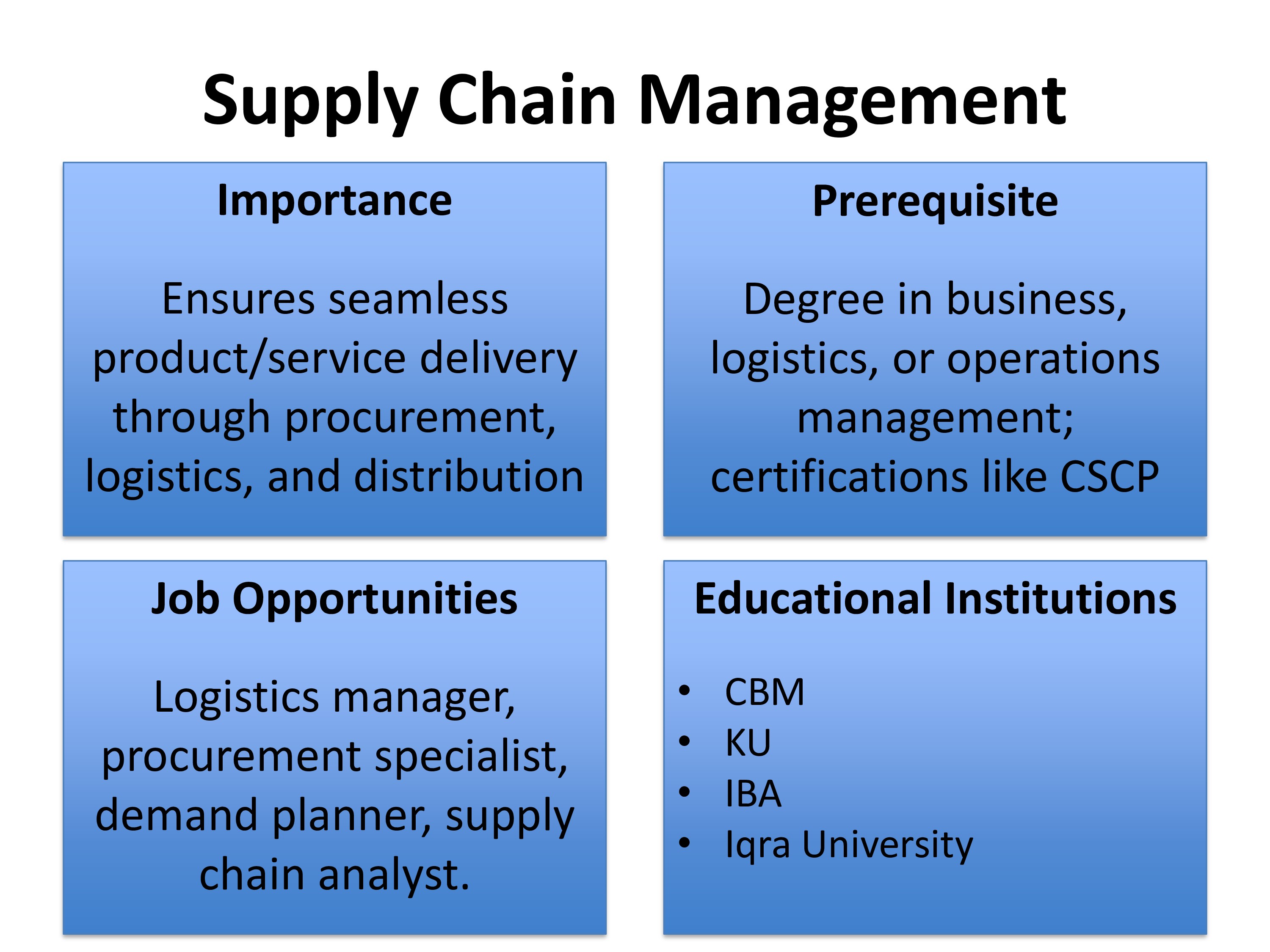
Question: Recent Research Areas & Top International Companies:
Answer: ⬇
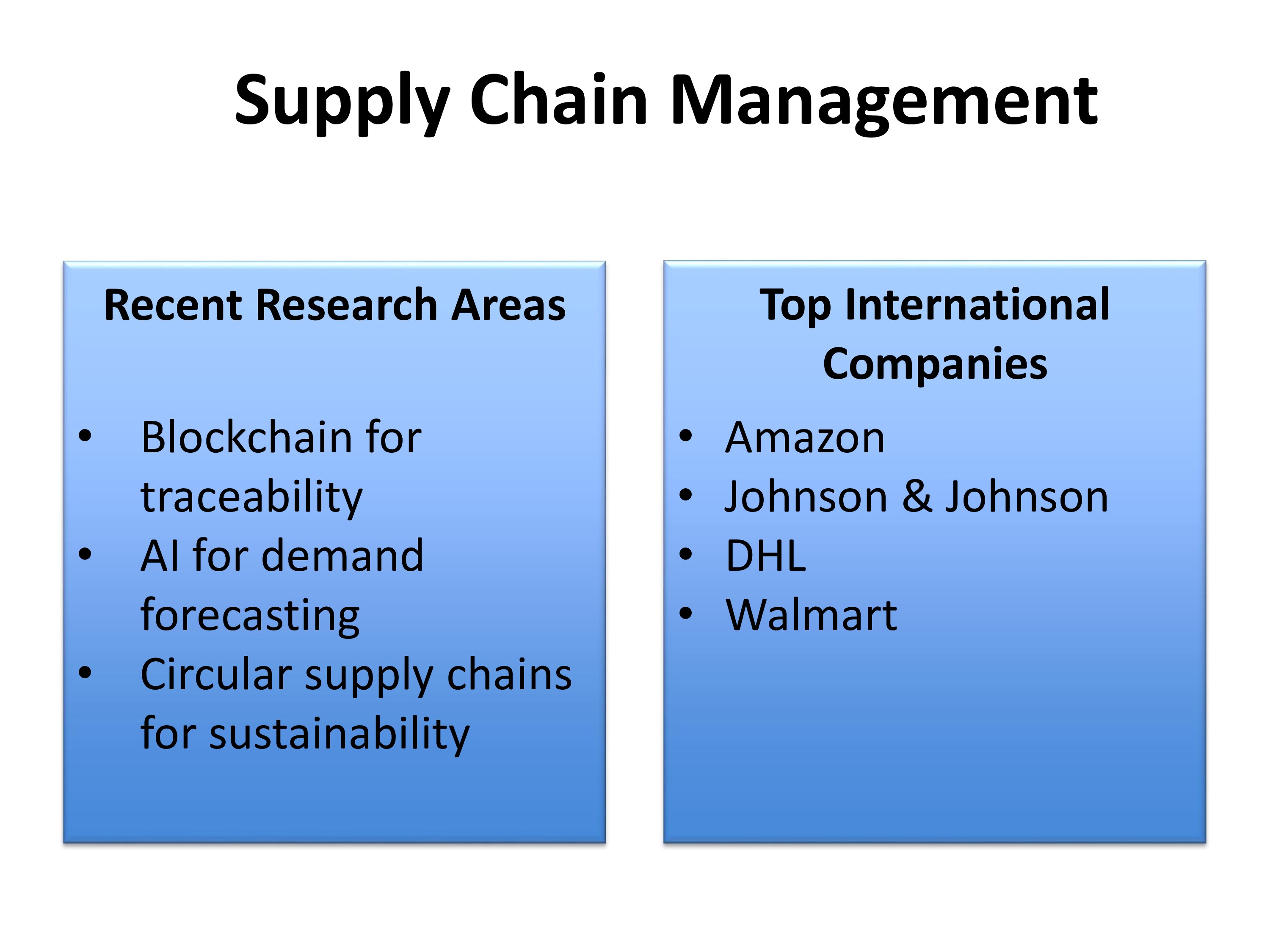
Question: What is the importance or significance of the subject nationally/ internationally:
Answer: There are several key reasons which signifies the importance of SCM in both national and international, one of the most important reasons are SCM ensures the smooth flow of goods and services, which is essential for economic growth. It enables businesses to produce and distribute products efficiently, contributing to overall economic stability and growth. International supply chains allow businesses to take advantage of a wider range of resources and markets, fostering innovation and economic interdependence. Efficient supply chains allow businesses to source materials and labor from the most cost-effective locations.
Question: It's implication in society and corporate sector:
Answer: Supply chain management (SCM) has significant implications for both society and the corporate sector. For society it improves standard of living, job creation, sustainability and creates better infrastructure. While on the other hand in the corporate sector SCM increases efficiency , reduces costs & risks, and creates a competitive edge in the global marketplace.
Question: Sub section of this field:
Answer: SCM sub divided in mainly 7 fields: •Procurement •Inventory management •Production Planning and Control •Warehouse Management •Logistic Management •Demand Planning and Forecasting •Returns Management
Question: Opportunity areas for jobs and business with this education:
Answer: An education in Supply Chain Management (SCM) opens doors to a wide range of job opportunities and business ventures. Some of them: Procurement Manager/Buyer, Logistics Manager, Supply Chain Analyst, Inventory Control Specialist, Operations Manager, Supplier Relationship Manager, Demand Planner, Supply Chain Consultant, Third-Party Logistics (3PL) Provider, Supplier Management Services
Question: Utilization and Function of Procurement:
Answer: 1) Function: Focuses on acquiring goods and services needed for production at the best price and quality. 2) Utilization: Manages supplier relationships, negotiates contracts, identifies new suppliers, and ensures on-time delivery of materials. 3) Importance: Efficient procurement ensures that companies acquire high-quality inputs at competitive prices, thereby reducing costs and maintaining supply continuity
Question: Students career growth and its comparison with other fields:
Answer: SCM offers a promising path for students with its high demand & diverse opportunities. SCM & Computer science Both offer high demand and strong salaries. Both involve problem-solving and analytical skills. CS has a steeper learning curve initially and focuses on software development and systems engineering. SCM is more business-oriented, dealing with logistics and operations.
Question: Financial attraction and its comparison with other fields:
Answer: Supply Chain Management (SCM) offers a compelling financial package with its high demand, competitive salaries, potential bonus & career progression. With its comparison to Sales, commissions can lead to very high earnings, but can also be quite volatile depending on performance. SCM offers a more stable income stream. Marketing salaries can vary depending on the specialty, but SCM offers a potentially clearer path to advancement with increasing compensation.
Question: Other attractions besides financial benefits:
Answer: Beyond the financial perks, Supply Chain Management (SCM) offers a range of attractive features, like it is Dynamic and Evolving Field, creates Tangible Impact, focuses on problem solving & sustainability.
Question: Research Work and Future Offshoots:
Answer: The field of Supply Chain Management (SCM) is constantly evolving, driven by technological advancements and the ever-changing global landscape. a) Research work: Digital Transformation, Sustainable Supply Chains, Resilient Supply Chains. b) Offshoots and Emerging Fields: Supply Chain Analytics, Supply Chain Cybersecurity, Urban Logistics, Human-Machine Collaboration.
Question: Best Educational Institutions:
Answer: Determining the "best" educational institution for Supply Chain Management (SCM) depends on several factors, including your location, budget, preferred learning style, and career goals. Locally CBM, Karachi University, IBA, Iqra University provides extensive SCM Programs and course outline.
Question: Scope of job in government, private sector, multinational companies or at international level:
Answer: The scope of jobs in Supply Chain Management (SCM) varies depending on the sector you choose: 1) Government: Focus→ Public sector procurement & distribution. Examples→ Logistics Officer, Procurement Manager 2) Private: Focus→ Industry-specific supply chain management. Examples→ Supply Chain Manager, Inventory Analyst 3) MNCs: Focus→ Complex global supply chains. Examples→ Global Supply Chain Manager, Import/Export Specialist 4) International: Focus→ Cross-border flow of goods. Examples→ International Trade Specialist, Customs Broker
Question: Recommendation Considering Pakistan’s Economic Conditions:
Answer: Yes, it is a growing field with dynamic sub fields. SCM provides a financially attractive career option with good growth potential, making it a strong choice for those seeking a secure and rewarding professional path. While there may be some economic challenges, the long-term outlook for SCM in Pakistan appears positive. If you're interested in a dynamic and rewarding career path, then SCM could be a great choice for you.
Question: Additional Information or Advice for the students pursuing this field:
Answer: There are some additional points to consider while pursuing SCM career , use job boards like Rozee.pk or LinkedIn to see the current demand for SCM jobs in Pakistan and the specific skills employers are looking for. Consider specializing in an area like e-commerce logistics or sustainable supply chains, which could be particularly relevant in the Pakistani market.
Question: Recent Research Areas & Top International Companies:
Answer: ⬇
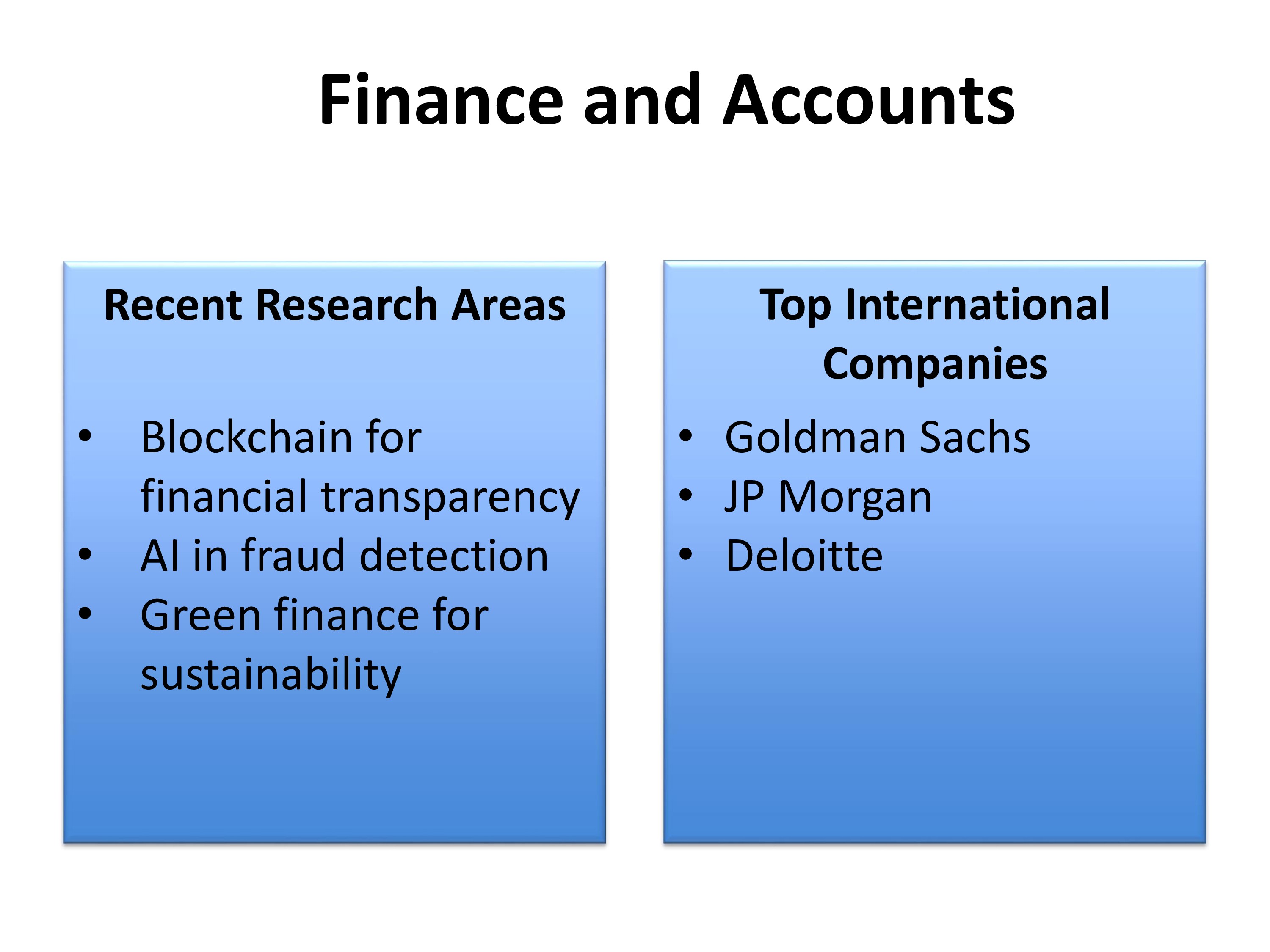
Question: Importance, Pre-Requisites, Job Opportunities and Educational Institutes:
Answer: ⬇
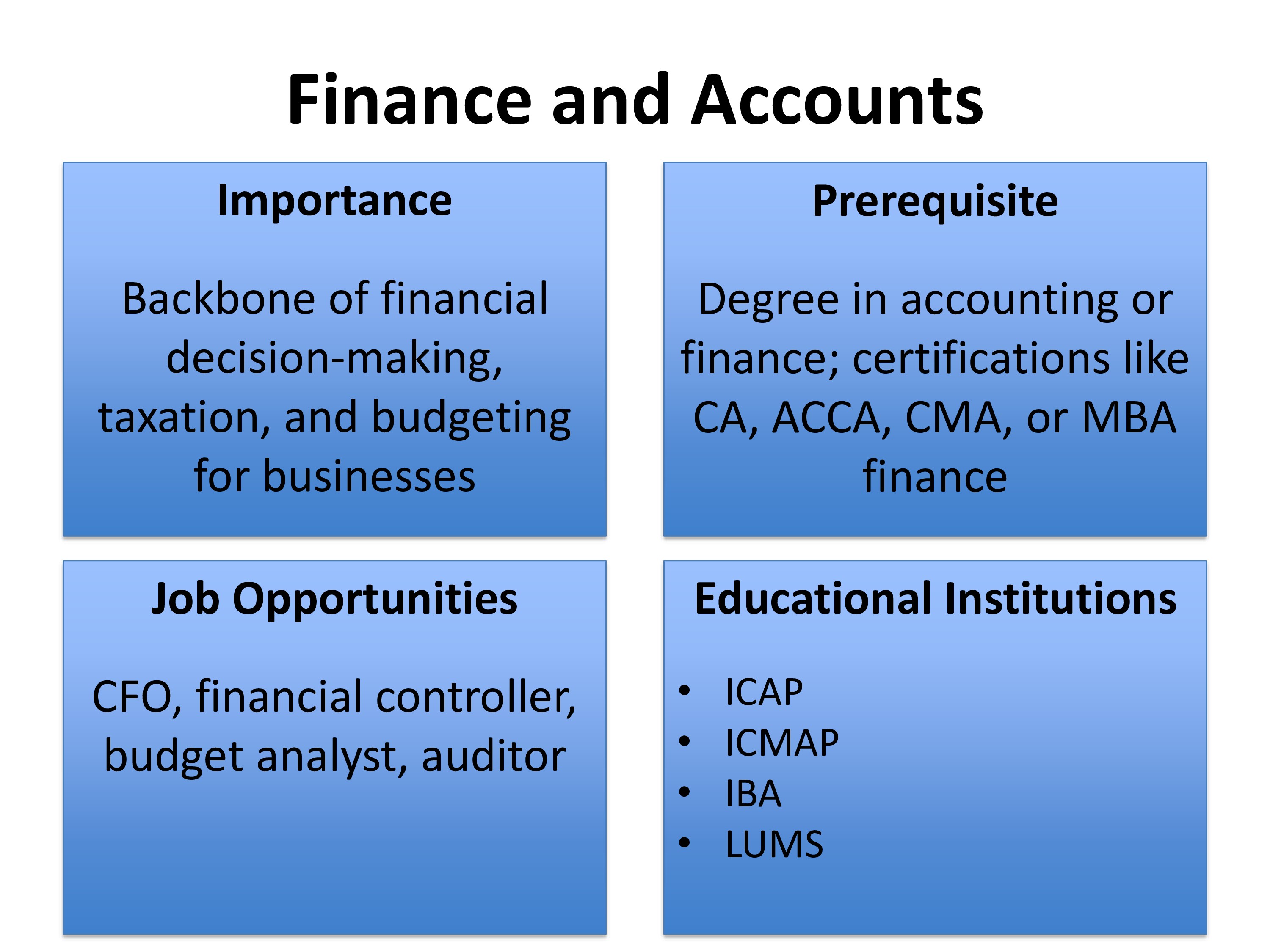
Question: Importance or Significance of the Subject Nationally/Internationally:
Answer: Finance and Accounts is an essential requirement for all business and Service houses. There is a very good demand for CFOs, Financial Controllers and Cost & Management Accountants in Pakistan and abroad.
Question: Implication in Society and Corporate Sector:
Answer: Finance & Accounts is the backbone of any business and it positively impacts on our society and corporate sector to increase wealth.
Question: Subsections of This Field and Their Utilization:
Answer: Sub sections of Finance and Accounts are Costing, Taxation, Treasury, Budgeting, Financial Accounting, Management Accounting etc. and all these subsections are equally important and one can specialize in any sub section as per their interest
Question: Opportunity Areas for Jobs and Business:
Answer: One can do Chartered Accountancy, Cost & Management Accountancy, MBA or BS and easily get initial job of Deputy Manager after acquiring qualification leading to CFO, Financial Controller, Head of Finance, Director Finance etc.
Question: Students’ Career Growth and Comparison with Other Fields:
Answer: In this field there are unlimited opportunities available in Pakistan and abroad as compared to other fields. Financial capabilities is very much important for one’s personal / professional life and enhance decision making capability.
Question: Financial Attraction and Comparison with Other Fields:
Answer: After acquiring qualification one can get job very easily with starting salary upto Rs. 100,000 and gradually grow as per experience and skills.
Question: Other Attractions Besides Financial Benefits:
Answer: Finance person can take decisions easily as compared to others. He can evaluate all his actions in the financial way and to calculate risk involved in his planning / decisions.
Question: Research Work and Future Offshoots:
Answer: In the field of investment banking and Accounting Standards there is a good research work has been done and already in place which enhance capability and efficiency.
Question: Best Educational Institutions:
Answer: ICAP, ICMAP, IBA, LUMS, IoBM are good institutes for finance degrees.
Question: Scope of job in government, private sector, multinational companies or at international level:
Answer: There are lot of opportunities available for finance person.
Question: Recommendation Considering Pakistan’s Economic Conditions:
Answer: I recommend CA or ACMA qualification based on my experience.
Question: Additional Information or Advice for the students pursuing this field:
Answer: If you work hard in your studies and allow reasonable time for study and research then you will be succeeded.
Question: Recent Research Areas & Top International Companies:
Answer: ⬇
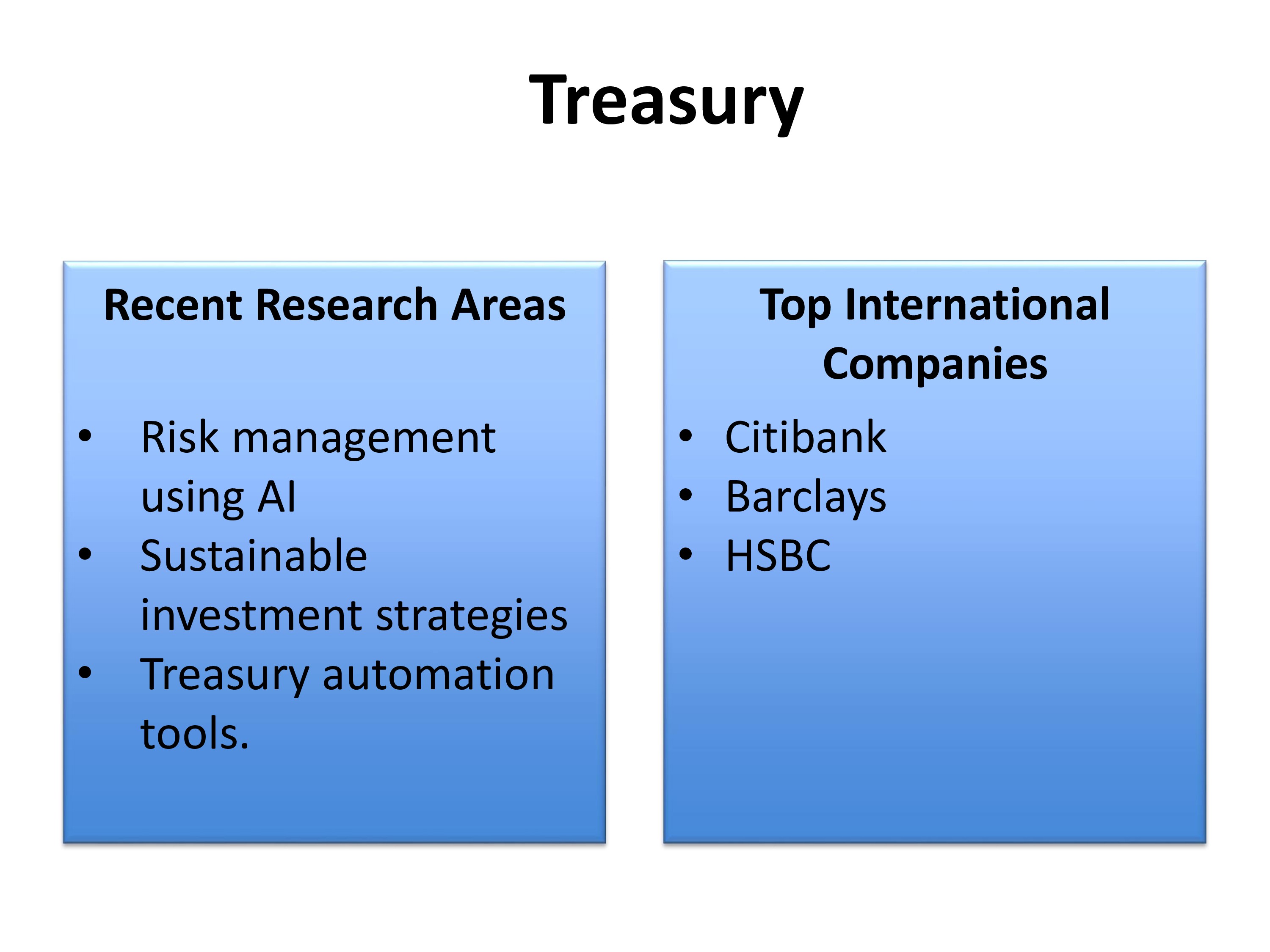
Question: Importance, Pre-Requisites, Job Opportunities and Educational Institutes:
Answer: ⬇
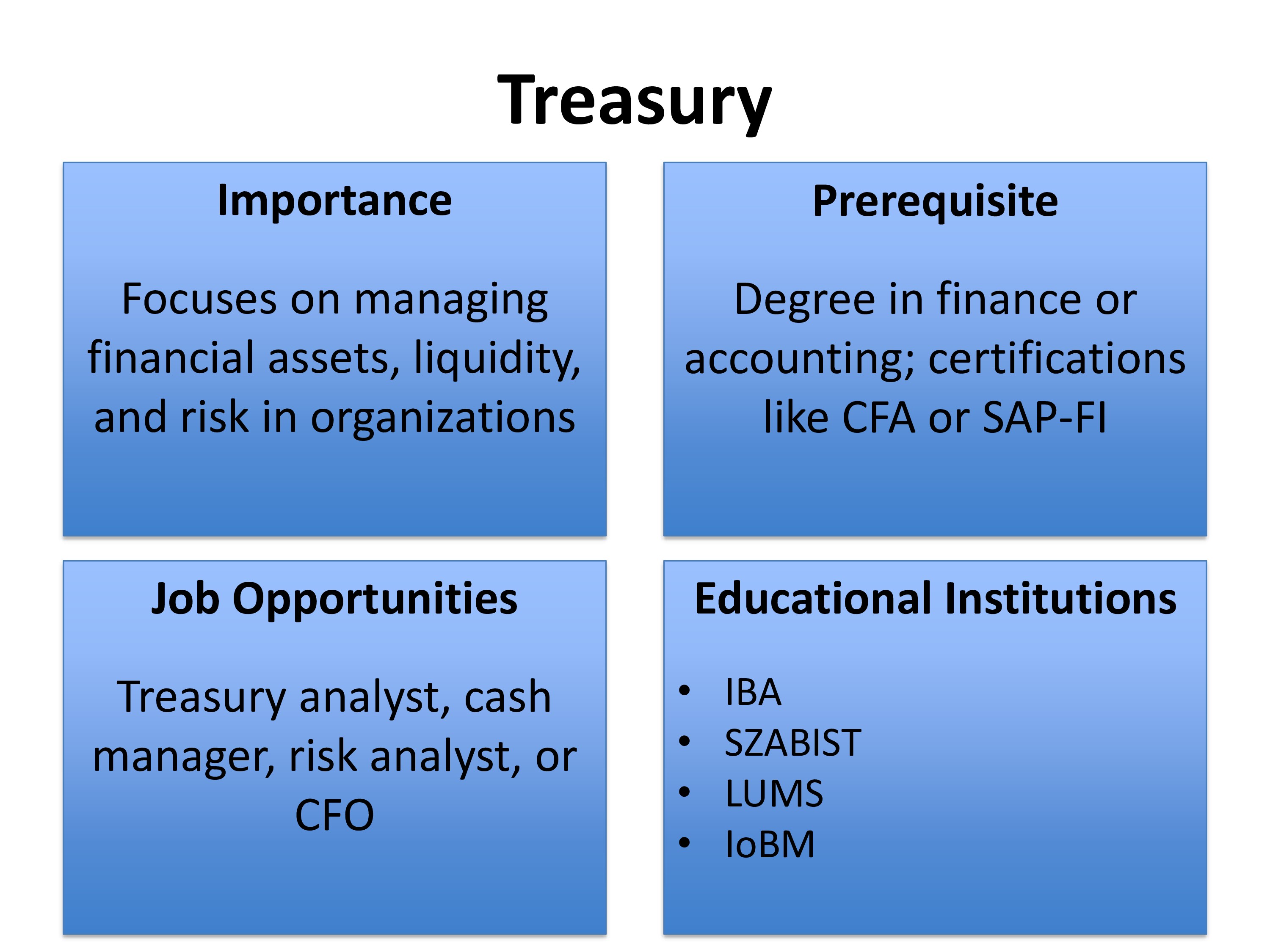
Question: Importance or Significance of the Subject Nationally/Internationally:
Answer: Treasury management is the act of managing a company’s daily cash flows and larger-scale decisions when it comes to finances. It can provide governance over a company's liquidity, establish and maintain credit lines, optimize investment returns, and strategize the best use of funds. As a company raises, earns, or uses cash, treasurers or senior financial officers ensure that there is working capital to maintain operations and reduce financial risks. Hence it is a critical department of any organization.
Question: Implication in Society and Corporate Sector:
Answer: The corporate treasury function is crucial in ensuring a company has the necessary resources to meet its financial obligations, support growth, and achieve its objectives.
Question: Subsections of This Field and Their Utilization:
Answer: Front office: Negotiates and deals with banks/all stakeholders Back office: Handles the operations of the department such as documentation, timely booking of loans, charges etc.
Question: Opportunity Areas for Jobs and Business:
Answer: Treasury is a core part of any organization’s financial department. Treasury operations differ in banks and other organisations. Banks have larger treasuries divided into sub departments such as money market, forex, treasury operations. Whereas corporate sectors have smaller treasuries.
Question: Students’ Career Growth and Comparison with Other Fields:
Answer: Working in treasury requires exceptional analytical skills, particularly financial and numerical skills. Excellent computer skills with programs such as MS Excel, Access, and Power BI are critical as you will work with and analyze large amounts of data. Effective time management is required as you work on regular day-to-day activities and longer-term projects. You need to be detailed-oriented but able to translate this detail into a high-level commercial view. You will need strong communication and interpersonal skills to work successfully with diverse internal and external stakeholders, including businesses, external funding providers, and regulators.
Question: Financial Attraction and Comparison with Other Fields:
Answer: Working even in junior treasury roles will see you earning a competitive salary. As you progress in your treasury career, your compensation will increase significantly, reflecting the critical strategic importance of the treasury function within an organization. Working in treasury offers many benefits, which have increased in recent years as the treasury function becomes more critical to large, complex organizations. Further, working as a treasury professional is industry-agnostic, as all medium-to-large organizations require expertise in treasury management. As your treasury experience grows, you may have the opportunity to move into treasury management roles before progressing to senior business positions, such as financial director or chief financial officer.
Question: Other Attractions Besides Financial Benefits:
Answer: Fast paced dynamic job which requires presence of mind and on the spot decision making abilities.
Question: Best Educational Institutions:
Answer: Local universities: Iobm, IBA, Szabist
Question: Scope of job in government, private sector, multinational companies or at international level:
Answer: Every organization where public, private local or international maintains a treasury department, hence scope is vast.
Question: Recommendation Considering Pakistan’s Economic Conditions:
Answer: Yes I would
Question: Additional Information or Advice for the students pursuing this field:
Answer: Training courses in SAP power BI are helpful.
Question: Importance, Pre-Requisites, Job Opportunities and Educational Institutes:
Answer: ⬇
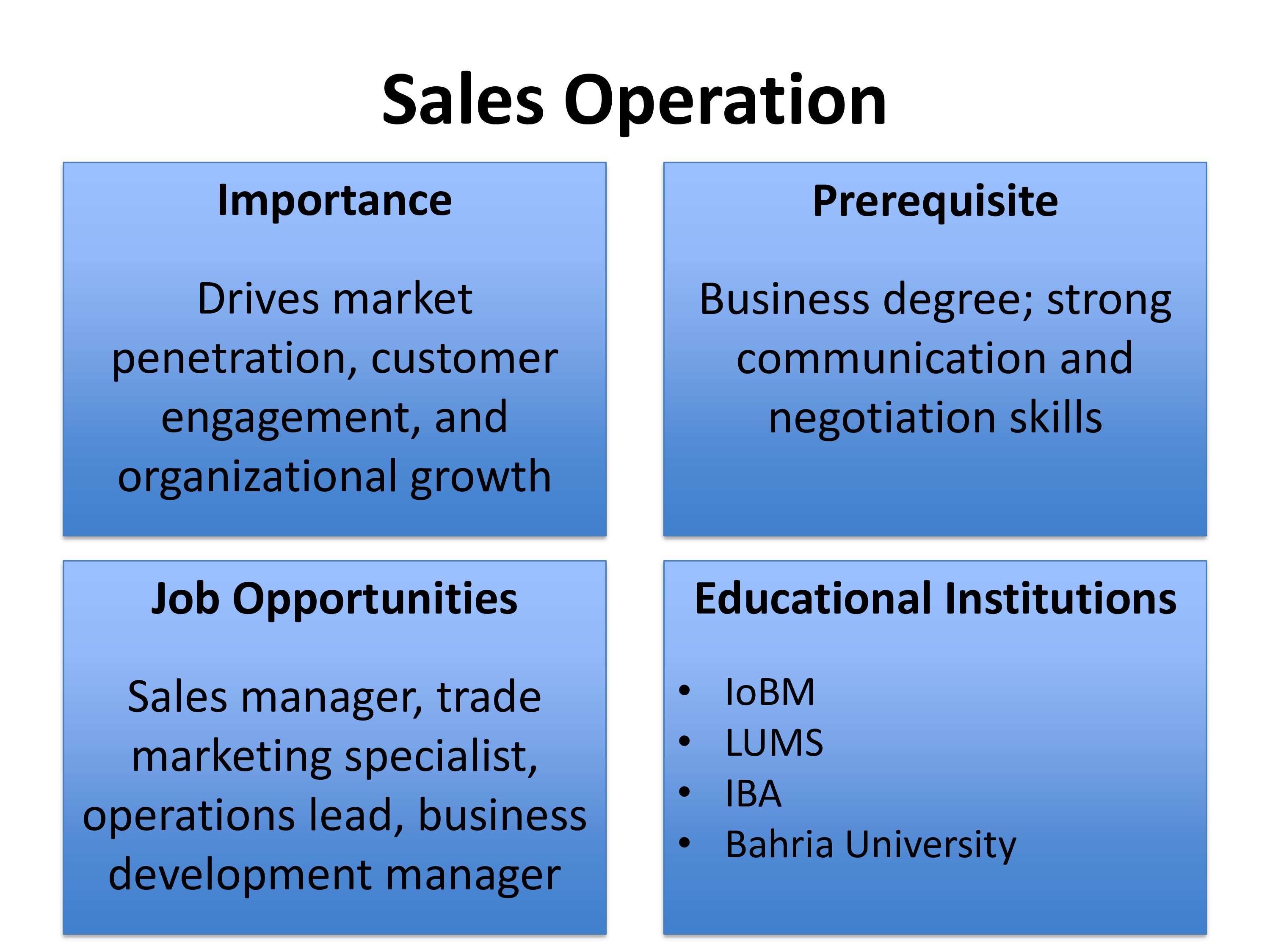
Question: Recent Research Areas & Top International Companies:
Answer: ⬇
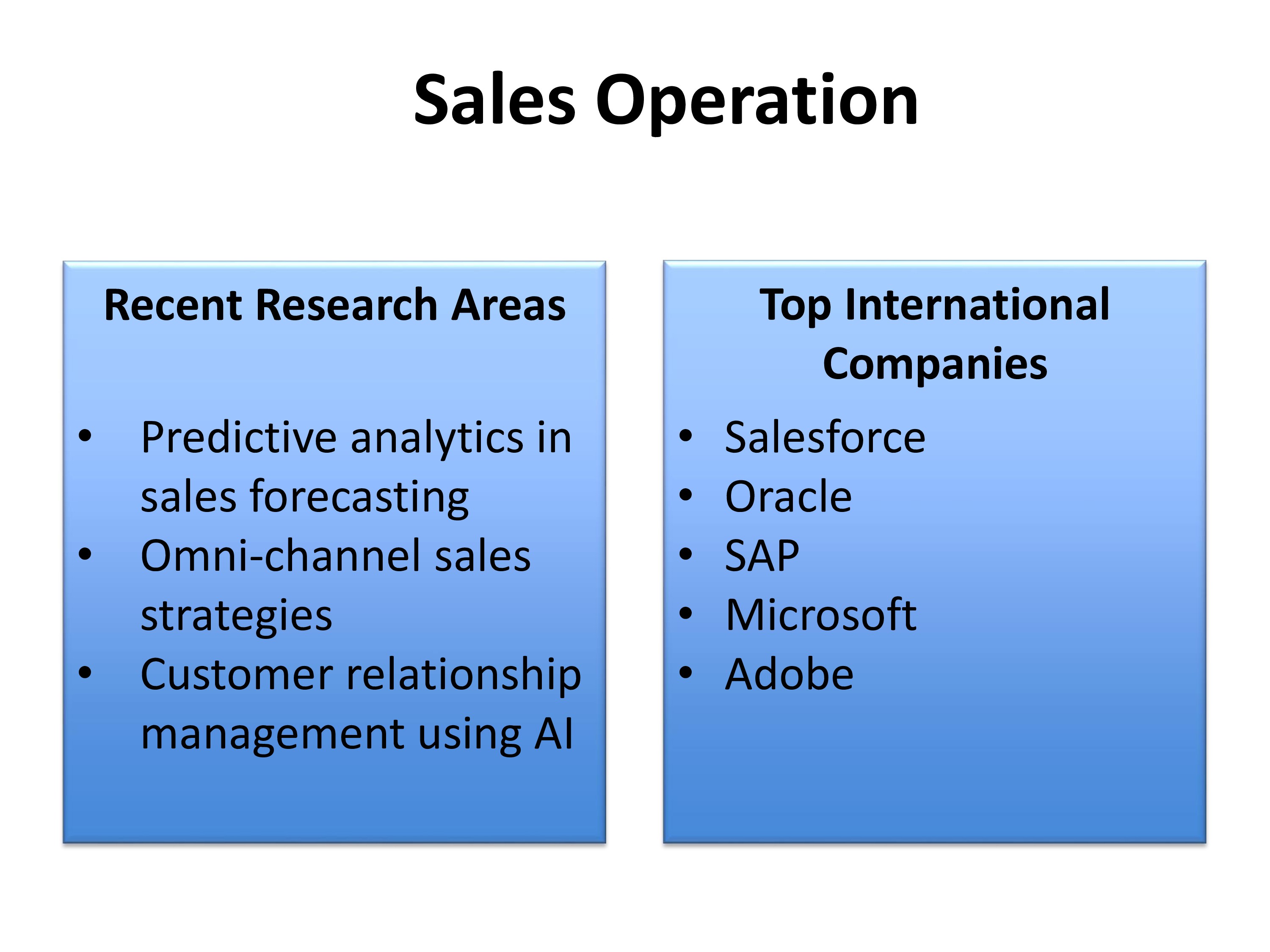
Question: Importance or Significance of the Subject Nationally/Internationally:
Answer: Sales and operations play a critical role in driving the economy, they ensure the movement of products and services for customers, contributing to business growth, market expansion, and taxation contribution to the exchequer. Sales is at the core of customer engagement, market positioning, and competitive advantage.
Question: Implication in Society and Corporate Sector:
Answer: Sales affect all aspects of society, from consumer behavior to corporate profitability. In the corporate sector, effective sales strategies help companies penetrate markets, achieve financial objectives, and foster innovation. asides, sales also support job creation, provide consumers with access to goods and services, and generate economic activity.
Question: Subsections of This Field and Their Utilization:
Answer: Subsections include Retail Sales, Corporate Sales, B2B Sales, Channel Management, Sales Operations, and E-commerce Sales. These segments/channels ensure targeted strategies are employed for different market needs and that companies can optimize operations, profitability, and customer satisfaction.
Question: Opportunity Areas for Jobs and Business:
Answer: This field offers vast opportunities in sales, trade marketing, modern trade, marketing, and supply chain. Students can work in diverse industries, including FMCG, technology, pharmaceuticals, and financial/banking services.
Question: Students’ Career Growth and Comparison with Other Fields:
Answer: Sales field provides rapid career progression, as performance is measurable and often rewarded through KPIs. Compared to other fields, it offers dynamic career paths, allowing professionals to develop leadership skills and network across various sectors.
Question: Financial Attraction and Comparison with Other Fields:
Answer: Sales roles typically offer attractive financial rewards, including performance-based incentives, which often exceed the earning potential of non-sales roles. Compared to administrative or technical fields, financial growth in sales can be significantly faster and higher.
Question: Other Attractions Besides Financial Benefits:
Answer: Besides financial benefits, sales roles offer personal growth, traveling opportunities, interaction with diverse trade segments and channels, professional development, leadership opportunities, and the ability to influence business outcomes. There’s also the reward of building strong customer relationships and contributing to market expansion.
Question: Research Work and Future Offshoots:
Answer: Research in sales focuses on consumer behavior, data analytics, digital transformation, and salesforce automation. The future holds significant advancements in AI-driven sales processes, predictive analytics, and omni-channel strategies, all of which will shape the evolution of this field.
Question: Best Educational Institutions:
Answer: Institutions like IBA Karachi, LUMS, LSE, Bahria University, NUST, and IoBM offer excellent programs in management sciences with a focus on sales and operations.
Question: Scope of job in government, private sector, multinational companies or at international level:
Answer: Sales professionals have vast opportunities across government, private sectors, and multinational companies. Technical sale personnel having specific skillset have high international demand.
Question: Recommendation Considering Pakistan’s Economic Conditions:
Answer: Yes, I would highly recommend pursuing this course. Despite economic challenges, sales remain a crucial function for business sustainability. With the rise of consumerism and consumer demand, sales expertise will be increasingly vital in the evolving economic landscape.
Question: Additional Information or Advice for the students pursuing this field:
Answer: My advice to students is to stay adaptable, focus on developing strong communication and negotiation skills, and embrace technological advancements such as AI and data analytics. Sales is a dynamic field where persistence and relationship-building skills are key to long-term success.
Question: Importance, Pre-Requisites, Job Opportunities and Educational Institutes:
Answer: ⬇
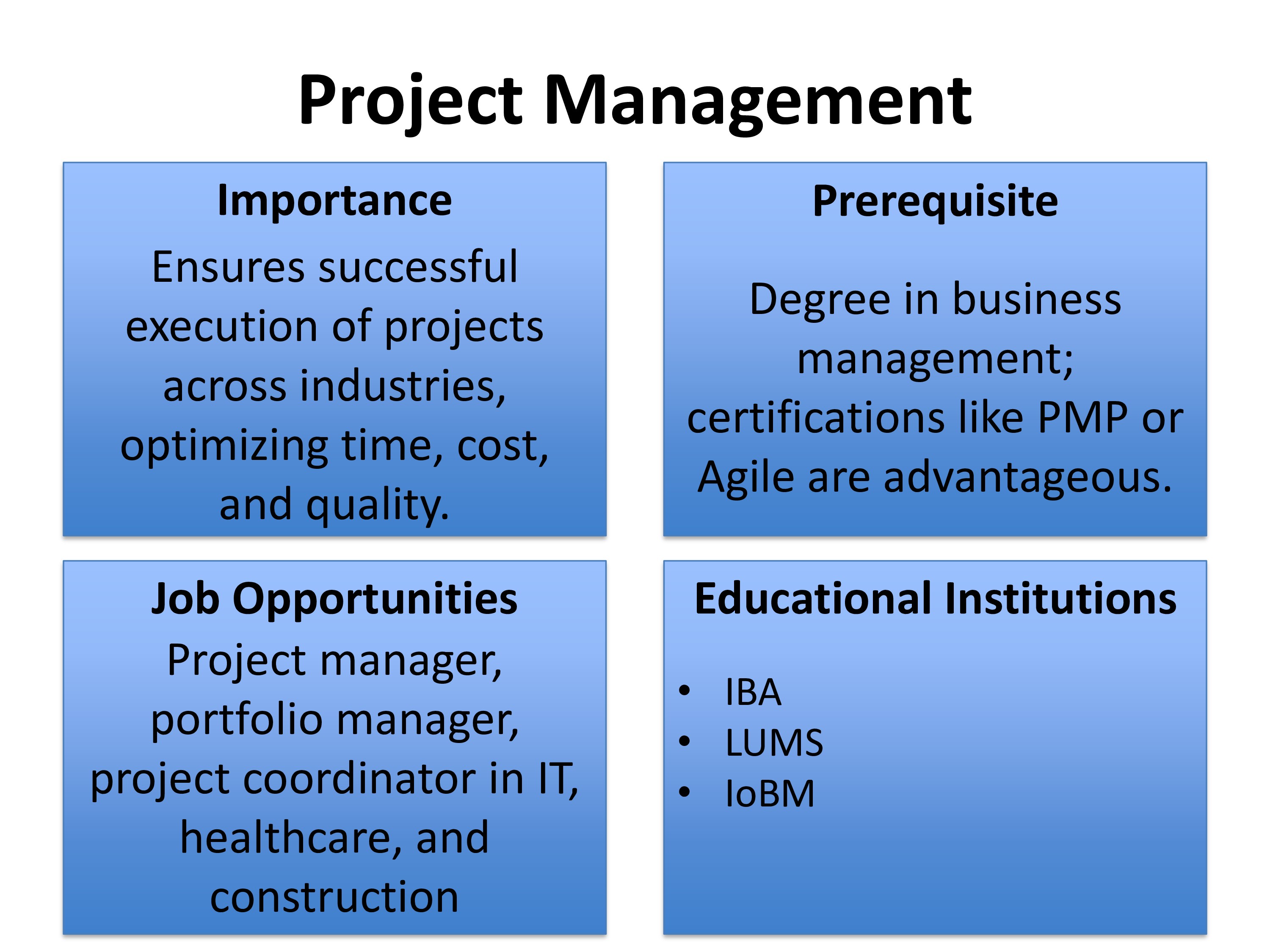
Question: Recent Research Areas & Top International Companies:
Answer: ⬇
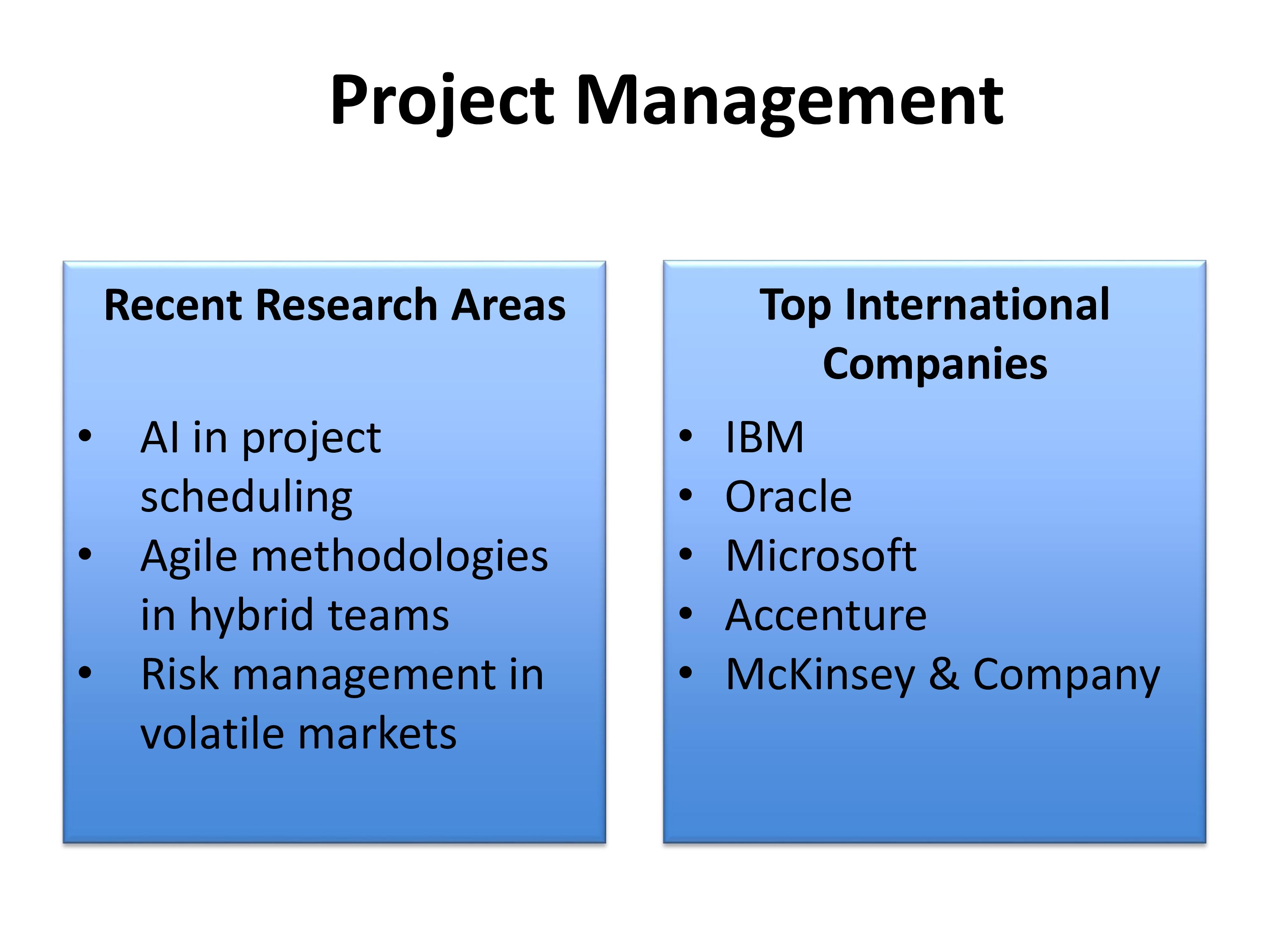
Question: Importance or Significance of the Subject Nationally/Internationally:
Answer: Project management is crucial for the successful execution of projects across various sectors globally. It ensures that projects are completed on time, within budget, and meet the desired quality standards. On an international scale, it is essential for large-scale projects involving multiple countries, such as infrastructure development, IT projects, and multinational corporate initiatives.
Question: Implication in Society and Corporate Sector:
Answer: In society, project management helps in improving the execution of public sector projects, such as healthcare, education, and infrastructure, leading to enhanced public services and quality of life. In the corporate sector, it enables to optimize resource utilization, minimizes risks, and enhances customer satisfaction.
Question: Sub section of this field and their utilization:
Answer: Agile Project Management: Used in software development and industries requiring flexibility and on-time delivery. Lean Project Management: Focuses on minimizing waste and maximizing value, prevalent in manufacturing and production. Six Sigma: It is aimed at improving quality by identifying and removing defects, widely used in manufacturing and service industries.
Question: Opportunity areas for jobs and business with this education:
Answer: Opportunities exist in diverse sectors, including IT, construction, healthcare, finance, and government. Some of the roles that can be given as; Project Manager Portfolio Manager Project Coordinator
Question: Students’ Career Growth and Comparison with Other Fields:
Answer: Career growth in project management can be rapid, especially with certifications like PMP (Project Management Professional). Project managers often advance to senior management roles due to their strategic and leadership skills. Compared to fields like engineering or finance, project management offers diverse industry applications and a balanced career progression.
Question: Financial Attraction and Comparison with Other Fields:
Answer: Project management is financially attractive, with salaries often higher than average in many sectors. Certified project managers, especially those with PMP certification, can command premium salaries. While fields like IT and finance may offer high entry-level salaries, project management provides strong long-term earning potential and growth.
Question: Other Attractions Besides Financial Benefits:
Answer: It depends on person to person; however, project management offers: Variety: Exposure to different industries and types of projects. Leadership Opportunities: Developing leadership and strategic thinking skills. Global Opportunities: The skills are transferable internationally, opening doors to global careers.
Question: Research Work and Future Offshoots:
Answer: Current research focuses on areas such as agile methodologies, sustainability in project management, and the impact of artificial intelligence on project processes. Future research may explore more on digital transformation, remote project management, and advanced project analytics.
Question: Best Educational Institutions:
Answer: Locally, LUMS and IBA and IOBM. Other than Pakistan, Massachusetts Institute of Technology (MIT), Stanford University, University of Oxford, University of Melbourne, Australia
Question: Scope of job in government, private sector, multinational companies or at international level:
Answer: The scope is vast, with opportunities in government projects such as Planning Commission of Pakistan (infrastructure, public policy), private sector (IT, finance, construction), multinational companies (global project teams), and international organizations (UN, World Bank).
Question: 11. Would you recommend this course as per your experience and current economic conditions of Pakistan?
Answer: Given the current economic conditions of Pakistan, project management is a highly recommended field. There is a growing demand for skilled project managers to oversee infrastructure projects, IT initiatives, and business transformations. The skill set is valuable across multiple industries, providing stability and career growth.
Question: Additional Information or Advice for the students pursuing this field:
Answer: Project management offers a versatile and rewarding career path with significant opportunities for growth, financial reward, and professional satisfaction.
Question: Importance, Pre-Requisites, Job Opportunities and Educational Institutes:
Answer: ⬇
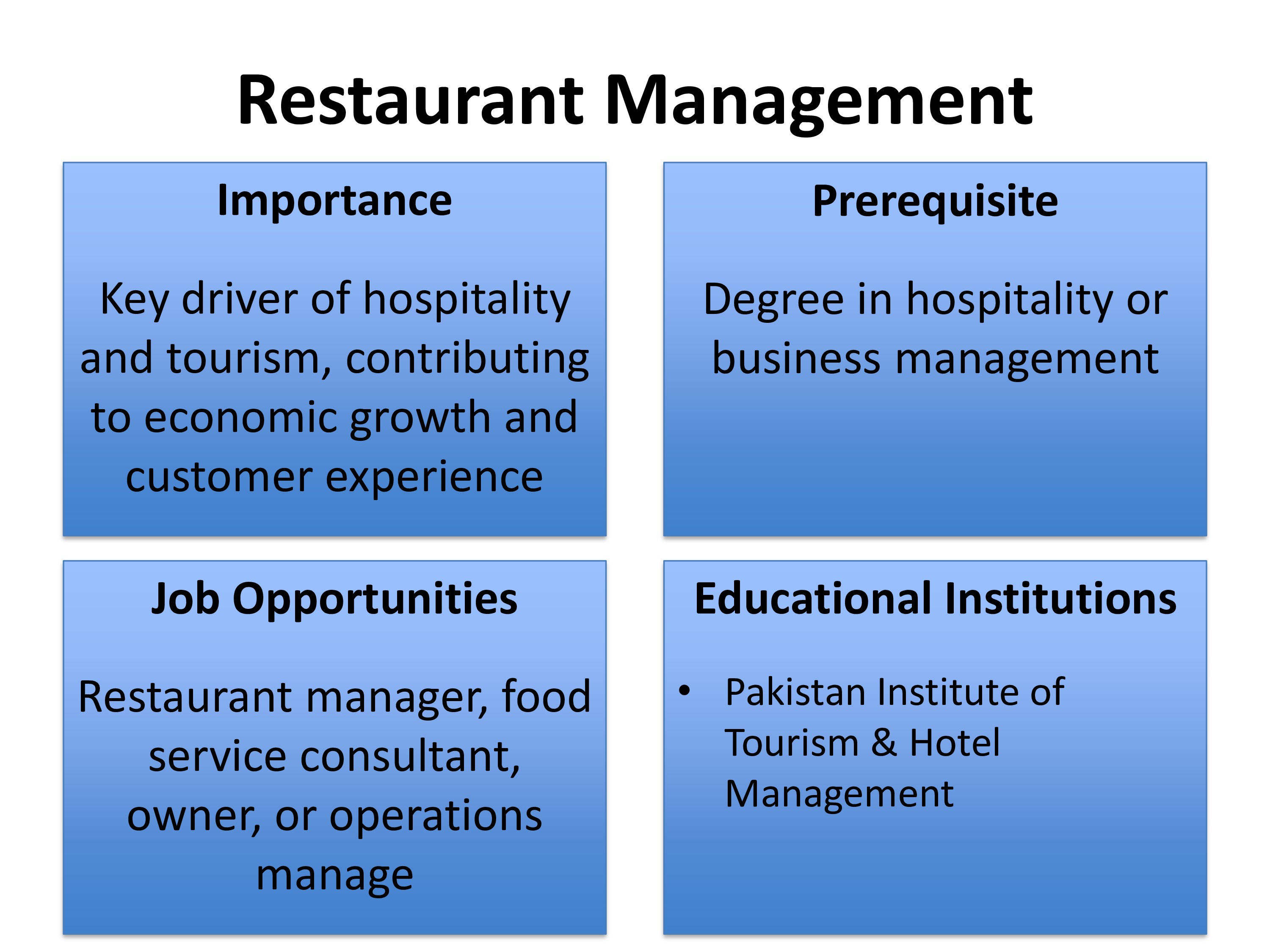
Question: Recent Research Areas & Top International Companies:
Answer: ⬇
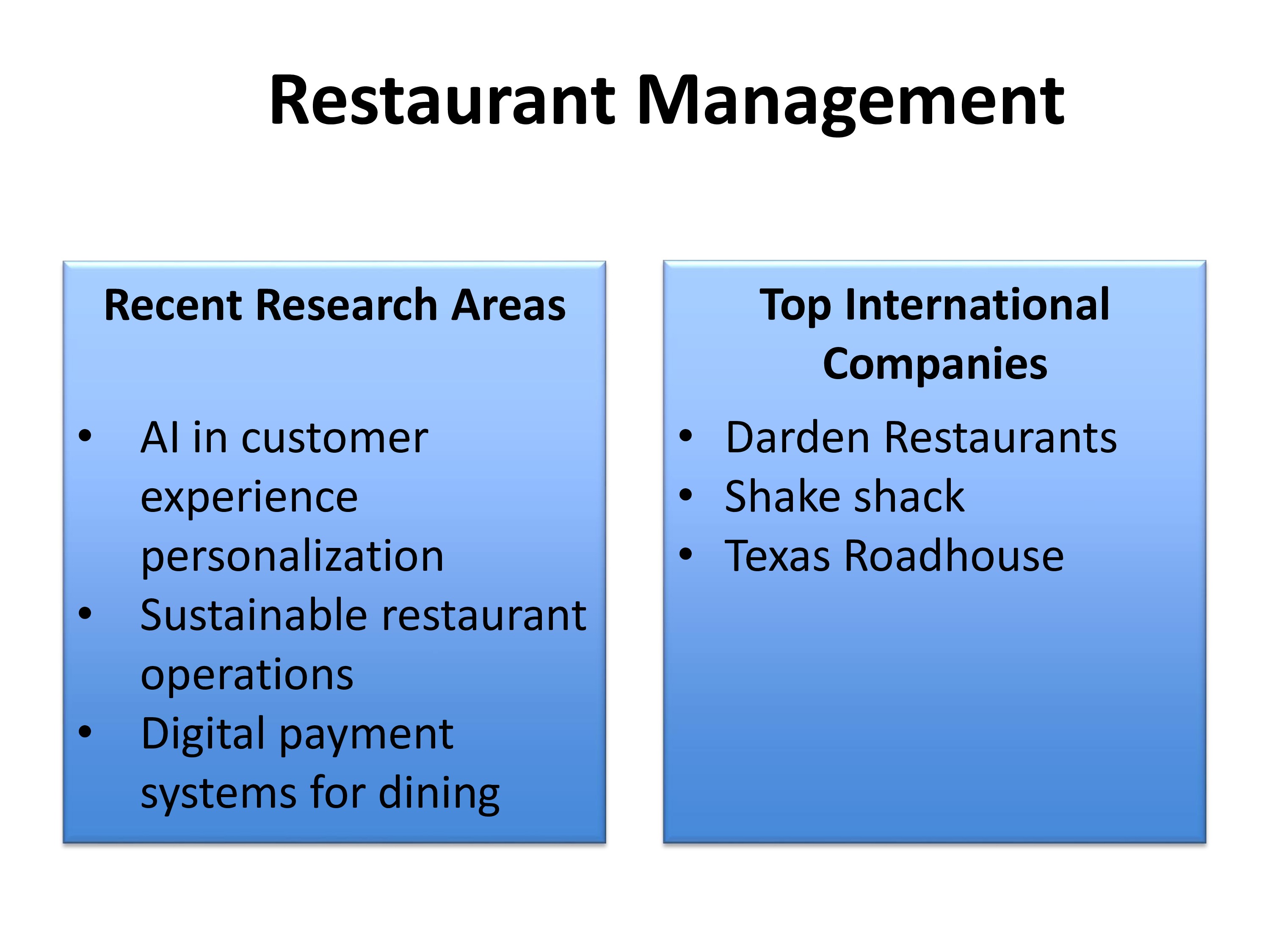
Question: Importance or Significance of the Subject Nationally/Internationally:
Answer: Restaurant management is crucial both nationally and internationally as it plays a significant role in the hospitality industry, which contributes to economic growth, job creation, and cultural exchange. The industry is a key driver of tourism and local economies, influencing consumer spending and trends globally.
Question: Implication in Society and Corporate Sector:
Answer: It influences employment, lifestyle, and corporate success through customer satisfaction, brand reputation, and adherence to safety and sustainability standards.
Question: Subsections of This Field and Their Utilization:
Answer: Key areas include operations, marketing, human resources, and finance. Each is essential for smooth restaurant functioning and profitability.
Question: Opportunity Areas for Jobs and Business:
Answer: Opportunities range from restaurant ownership to roles in management, consulting, and food service in hotels, cruise lines, and more.
Question: Students’ Career Growth and Comparison with Other Fields:
Answer: Restaurant management offers diverse career paths and growth potential, often quicker than other fields like finance or engineering.
Question: Financial Attraction and Comparison with Other Fields:
Answer: While starting salaries may be modest, successful restaurant managers and owners can achieve substantial financial rewards.
Question: Other Attractions Besides Financial Benefits:
Answer: Beyond money, this field offers creativity, leadership opportunities, and the satisfaction of creating memorable dining experiences.
Question: Research Work and Future Offshoots:
Answer: Research is focused on sustainability, technology in dining, and customer experience. Future trends include AI integration and eco-friendly practices.
Question: Best Educational Institutions:
Answer: Cothm, Pakistan Institute of Tourism & Hotel Management, Greenwich etc.
Question: Scope of job in government, private sector, multinational companies or at international level:
Answer: There isn’t much scope in government sector as there are many eateries operating under govt sector. Multinational companies usually have openings for the position.
Question: Recommendation Considering Pakistan’s Economic Conditions:
Answer: Yes. It is recommended to take the course to get an idea of the job.
Question: Additional Information or Advice for the students pursuing this field:
Answer: You will learn everything with time.
Question: Importance, Pre-Requisites, Job Opportunities and Educational Institutes:
Answer: ⬇
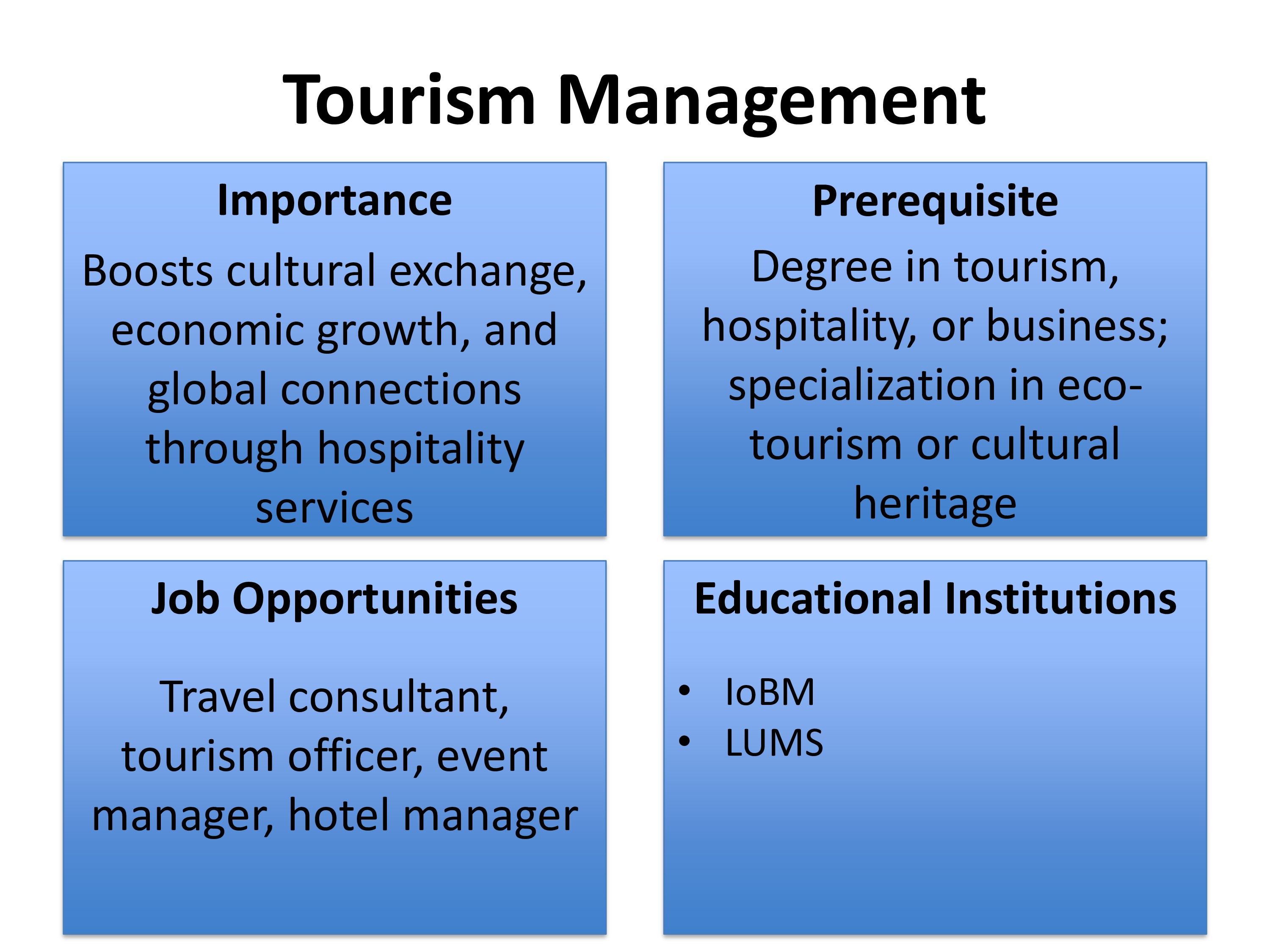
Question: Recent Research Areas & Top International Companies:
Answer: ⬇
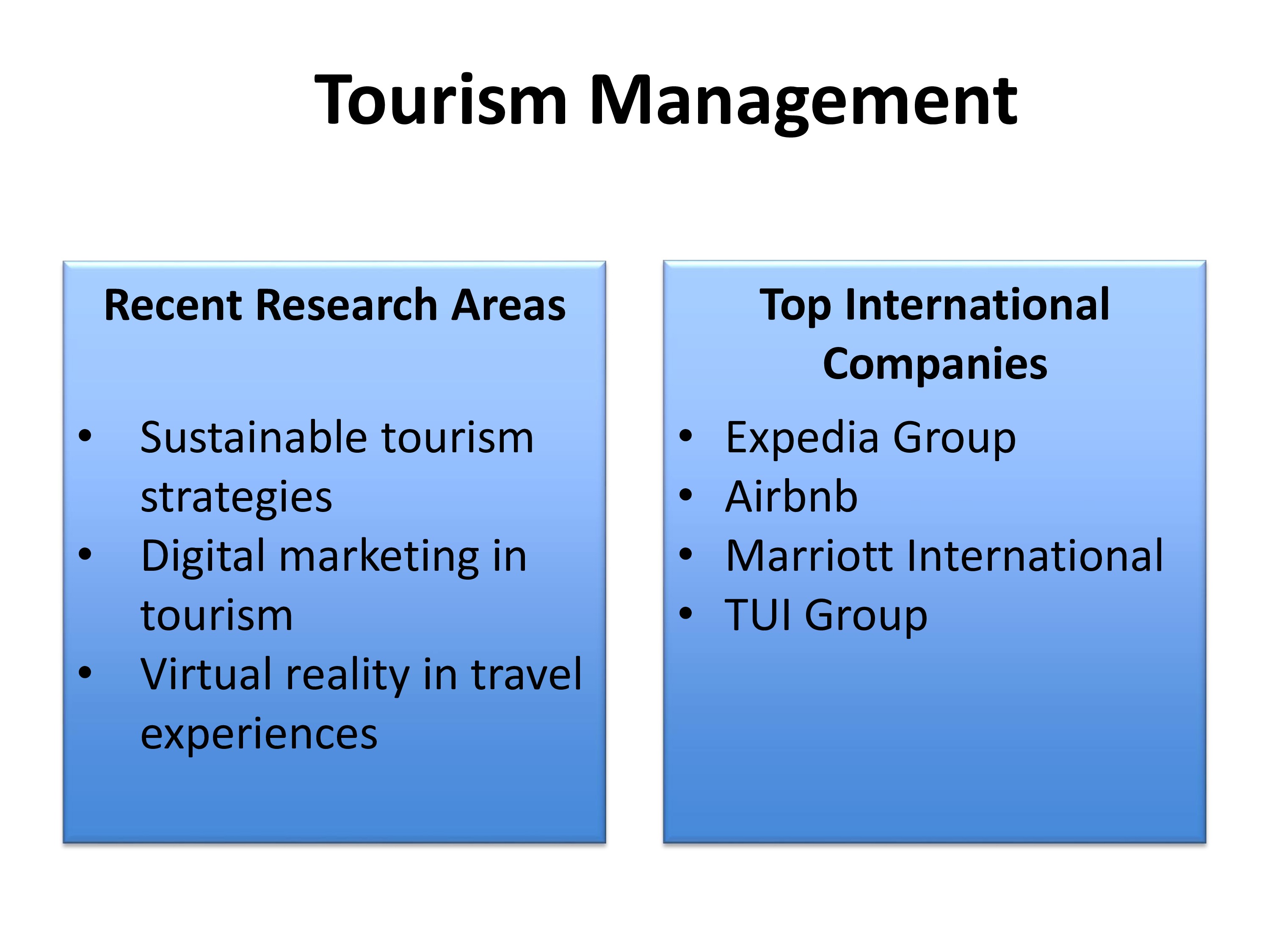
Question: Importance or Significance of the Subject Nationally/Internationally:
Answer: This field connects people and experiences, bridging cultures, and fueling curiosity. Nationally, it boosts our economy and puts Pakistan on the global map. Internationally, it opens doors to endless discoveries and friendships.
Question: Implication in Society and Corporate Sector:
Answer: Travel fosters cultural understanding and broadens perspectives, valuable traits in any corporation. Companies benefit as travel strengthens teams, drives fresh ideas, and boosts productivity.
Question: Subsections of This Field and Their Utilization:
Answer: From adventure tourism and eco-travel to cultural experiences, each niche attracts different travelers. We use these to cater unique experiences, whether it's an adrenaline-packed excursion or a peaceful, nature-inspired retreat.
Question: Opportunity Areas for Jobs and Business:
Answer: Endless! From tour guiding to content creation, logistics, and customer experience, this field has a role for every type of talent, making it an exciting industry for aspiring entrepreneurs or career-minded individuals.
Question: Students’ Career Growth and Comparison with Other Fields:
Answer: Travel offers a career where every day feels different, with experiences that shape your journey as much as any traveler’s. Growth might be unconventional, but it’s often faster, more diverse, and richly fulfilling compared to more structured fields.
Question: Financial Attraction and Comparison with Other Fields:
Answer: While it may not start out as the highest-paying, it becomes financially rewarding as your expertise and network grow. Plus, the perks—seeing the world—are priceless and unique to this industry.
Question: Other Attractions Besides Financial Benefits:
Answer: Beyond money, this field offers the joy of exploring, meeting incredible people, and creating lifelong memories. The passion and purpose that come with travel are hard to find in other fields.
Question: Research Work and Future Offshoots:
Answer: Research is diving into sustainable tourism, cultural preservation, and tech integration. The future promises even more innovation in how we travel, with a focus on impact and accessibility for all.
Question: Best Educational Institutions:
Answer: Locally, institutions like IOBM and LUMS offer great business foundations for travel management, while globally, Cornell and Switzerland’s EHL Hospitality Business School stand out for tourism and hospitality education.
Question: Job Scope in Government, Private Sector, Multinationals, or International Level:
Answer: The scope is vast: the government focuses on tourism policies, private and multinational sectors innovate travel experiences, and internationally, there’s demand in NGOs, airlines, and hospitality giants everywhere.
Question: Recommendation Considering Pakistan’s Economic Conditions:
Answer: Definitely recommend it! With Pakistan’s beauty and cultural wealth, the travel industry has potential for growth and resilience, creating opportunities even in challenging times. It’s a powerful way to serve the country and boost local economies.
Question: Additional Information or Advice for Students Pursuing This Field:
Answer: Embrace the journey—this field requires passion, flexibility, and a sense of adventure. Network widely, learn storytelling, and never forget that travel is as much about people as it is about places. It’s a rewarding career if you follow it with heart.
Question: Importance, Pre-Requisites, Job Opportunities and Educational Institutes:
Answer: ⬇
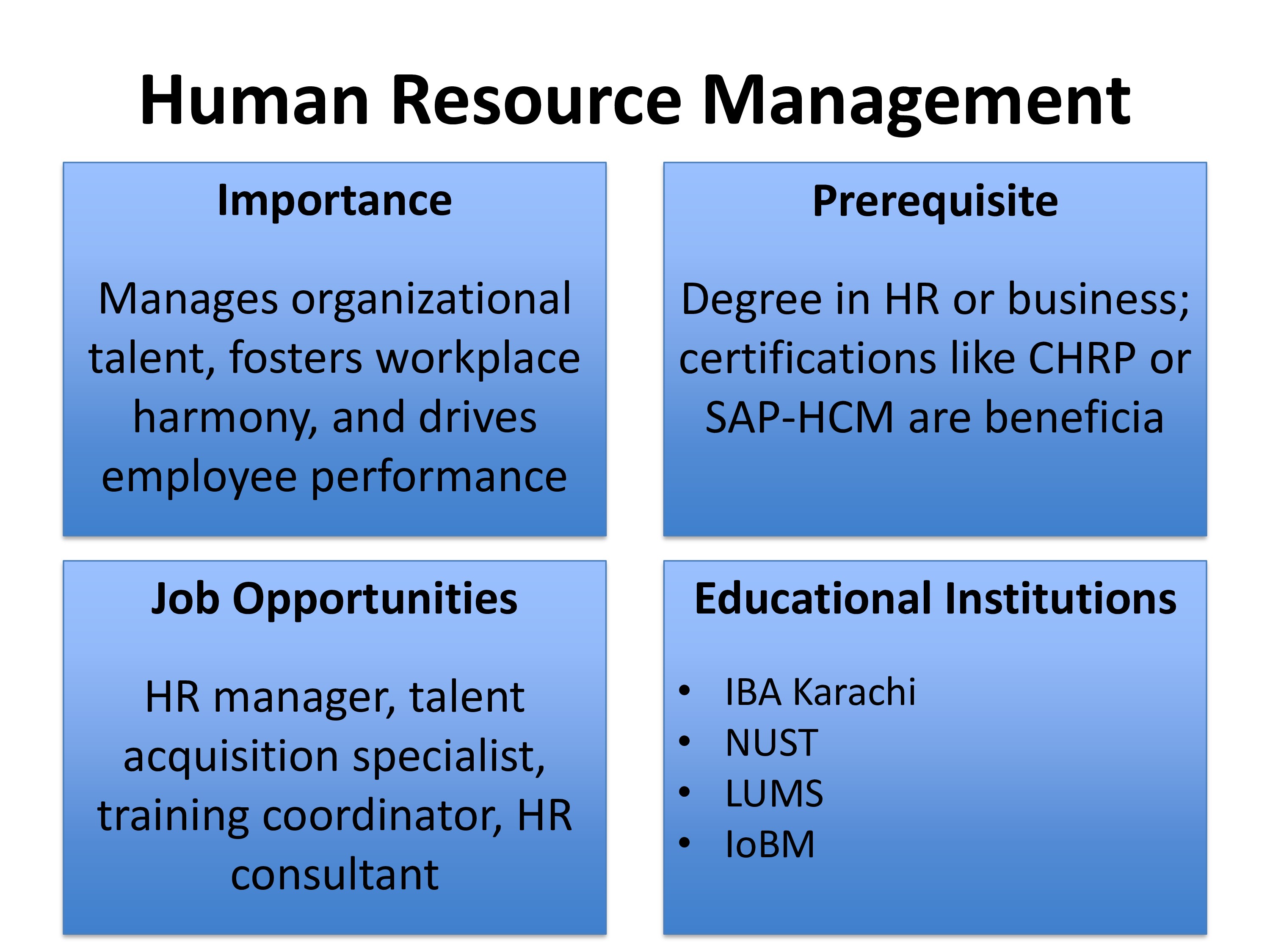
Question: Recent Research Areas & Top International Companies:
Answer: ⬇
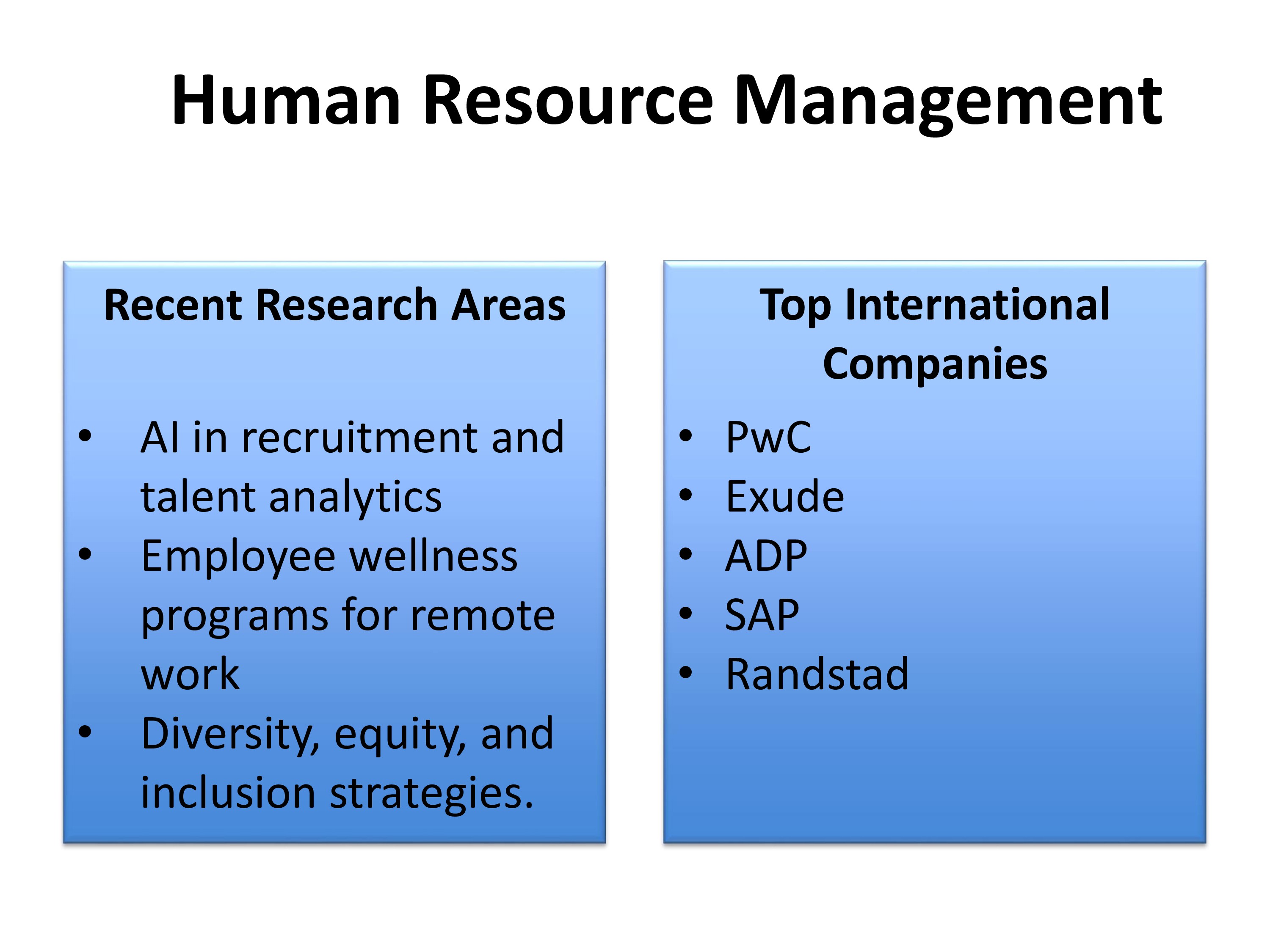
Question: Importance or Significance of the Subject Nationally/Internationally:
Answer: Human Resources Management (HRM) is crucial both nationally and internationally as it directly impacts an organization's ability to effectively manage its human capital. At the national level, HRM helps organizations comply with labor laws, fosters workplace harmony, and enhances productivity. Internationally, it supports global business operations, ensures cultural sensitivity, and aligns HR practices with global standards. Effective HRM drives organizational success by optimizing employee performance and engagement.
Question: Implication in Society and Corporate Sector:
Answer: In society, HRM plays a key role in shaping workplace environments, influencing labor practices, and advocating for employee rights. In the corporate sector, it is integral for talent acquisition, performance management, employee development, and ensuring compliance with legal and ethical standards. HRM practices influence organizational culture, employee satisfaction, and overall business performance.
Question: Subsections of This Field and Their Utilization:
Answer: Key sub-sections include: o Talent Acquisition and Management: Recruitment, selection, and onboarding of employees. o Employee Relations: Handling disputes, conflict resolution, and fostering a positive work environment. o Compensation and Benefits: Developing competitive pay structures and benefits packages. o Learning and Development: Training employees and facilitating career growth. o HR Policy and Compliance: Creating and enforcing HR policies to adhere to legal requirements. o HR Analytics: Using data to inform HR decisions and strategies. Each sub-section plays a vital role in managing different aspects of employee lifecycle and organizational needs.
Question: Opportunity Areas for Jobs and Business:
Answer: Opportunities are diverse, including roles such as HR Manager, HR Business Partner, Talent Acquisition Specialist, Learning and Development Coordinator, and Compensation and Benefits Analyst. In addition, there are entrepreneurial opportunities in HR consulting, HR technology solutions, and HR training programs.
Question: Students’ Career Growth and Comparison with Other Fields:
Answer: Careers in HRM offer substantial growth potential, with opportunities to advance into senior HR roles, executive positions, or specialized HR functions. Compared to other fields, HRM offers a balanced mix of strategic and operational responsibilities, making it suitable for those interested in both human interaction and organizational strategy.
Question: Financial Attraction and Comparison with Other Fields:
Answer: HRM roles are generally well-compensated, particularly at senior levels. The financial benefits are competitive with other business functions like finance or marketing. Senior HR professionals can command high salaries, especially in large organizations or multinational companies.
Question: Other Attractions Besides Financial Benefits:
Answer: Besides financial benefits, HRM offers the satisfaction of positively impacting employees' careers and organizational culture. It provides opportunities for strategic thinking, problem-solving, and influencing organizational success. HR professionals often enjoy a dynamic work environment and the chance to work closely with leadership teams.
Question: Research Work and Future Offshoots:
Answer: Current research focuses on HR technology, data-driven , AI based HR practices, and employee well-being. The field is evolving with advancements in artificial intelligence, machine learning for HR analytics, and enhanced employee engagement strategies. Future trends include greater emphasis on diversity, equity, and inclusion, as well as remote work management.
Question: Best Educational Institutions:
Answer: o Harvard University o University of Michigan o London School of Economics o Concordia University o Institute of Business Administration Karachi
Question: Scope of job in government, private sector, multinational companies or at international level:
Answer: HRM professionals are in demand across all sectors. In government, HR roles focus on public sector employee management and compliance. In the private sector and multinational companies, HR roles involve strategic management of diverse workforces, global talent acquisition, and organizational development. Internationally, HRM offers opportunities to work in multinational corporations, NGOs, and global consulting firms.
Question: Recommendation Considering Pakistan’s Economic Conditions:
Answer: Yes, HRM is a valuable field with strong career prospects. In Pakistan, as organizations continue to grow and adapt, the need for skilled HR professionals is increasing. The field offers stability and opportunities for advancement, making it a sound choice for those interested in impacting organizational success and employee welfare.
Question: Additional Information or Advice for the students pursuing this field:
Answer: HRM is a dynamic and evolving field requiring a combination of interpersonal skills, strategic thinking, and adaptability. For students pursuing this field, it’s essential to stay updated on industry trends, develop strong communication and analytical skills, and seek practical experience through internships or projects. Networking with professionals and pursuing relevant certifications can further enhance career prospects.
Question: Recent Research Areas & Top International Companies:
Answer: ⬇
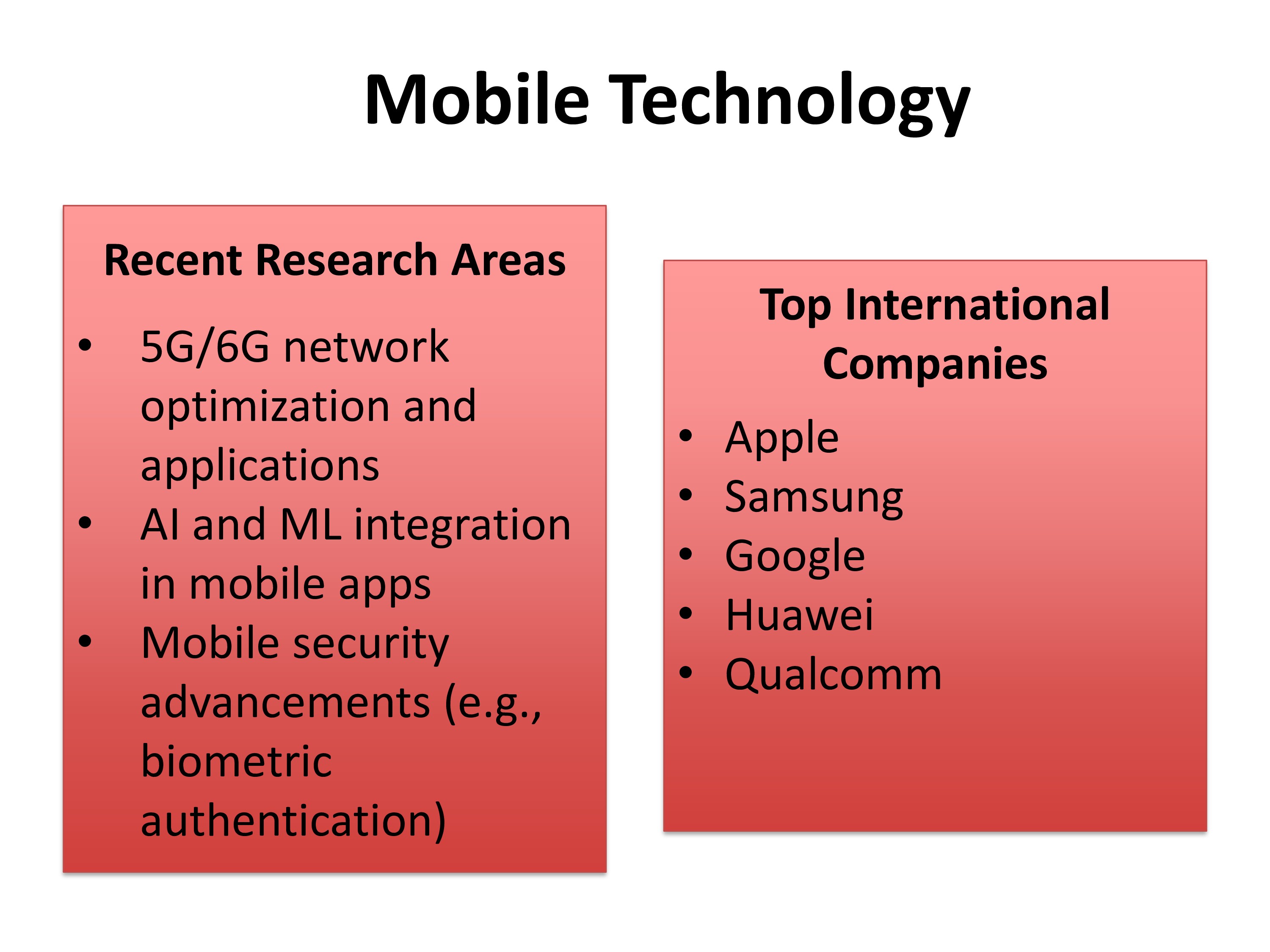
Question: Importance, Pre-Requisites, Job Opportunities and Educational Institutes:
Answer: ⬇
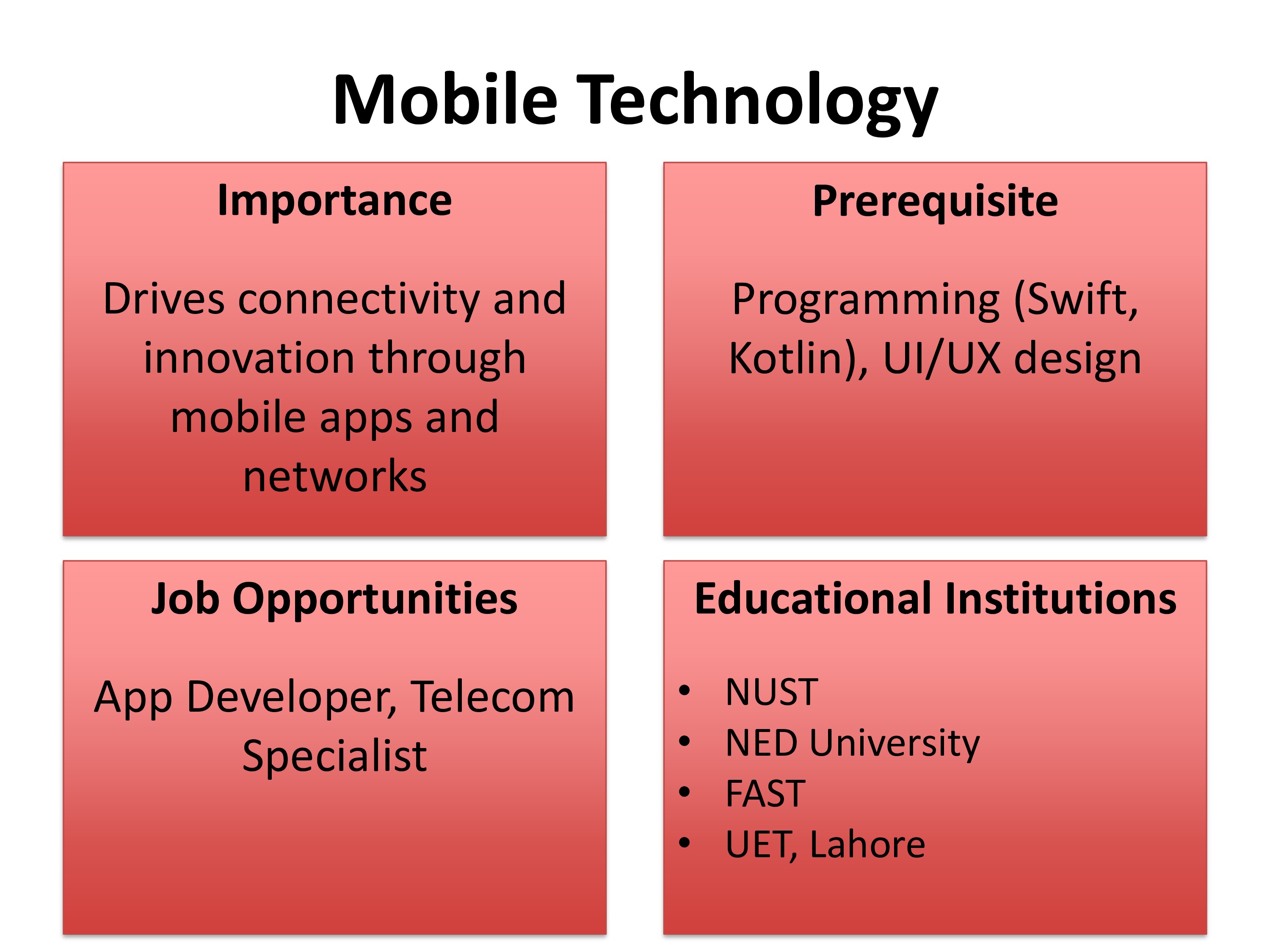
Question: Importance or Significance of the Subject Nationally/Internationally:
Answer: Mobile technology's significance lies in its transformative impact across various sectors, enhancing communication, connectivity, access to information, economic development, healthcare, education, and societal interactions globally. Its continued evolution promises further advancements and benefits for individuals and societies worldwide.
Question: Implication in Society and Corporate Sector:
Answer: Mobile technology influences society by enhancing connectivity, access to information, economic opportunities, and cultural exchange. In the corporate sector, it improves operational efficiency, customer engagement, data utilization, and innovation capabilities, driving business growth and adaptation to digital trends.
Question: Implication in Society and Corporate Sector:
Answer: Mobile technology influences society by enhancing connectivity, access to information, economic opportunities, and cultural exchange. In the corporate sector, it improves operational efficiency, customer engagement, data utilization, and innovation capabilities, driving business growth and adaptation to digital trends.
Question: Subsections of This Field and Their Utilization:
Answer: Sub section of this fields and their utilization. Mobile technology encompasses several key sub-sections, each with distinct utilization across various domains: 1. Mobile Applications (Apps): Used for consumer needs (social media, entertainment) and business operations (productivity, CRM). 2. Mobile Commerce (mCommerce): Facilitates online shopping, mobile payments, and banking services. 3. Mobile Health (mHealth): Enables telemedicine, health monitoring, and medication adherence through mobile apps. 4. Location-Based Services (LBS): Provides navigation, location-based advertising, and geotagging. 5. Mobile Entertainment: Includes streaming services, gaming, and augmented/virtual reality experiences. 6. Mobile Advertising: Involves in-app ads, mobile search ads, and location-based ads for targeted marketing. 7. Mobile Security and Privacy: Focuses on device management, encryption, authentication, and privacy controls to secure data and user information
Question: Opportunity Areas for Jobs and Business:
Answer: Education in mobile technology opens up numerous opportunities for jobs and businesses in various sectors. Here are some key areas where expertise in mobile technology can lead to lucrative careers or entrepreneurial ventures:- 1. Mobile App Developer 2. UI/UX Designer 3. Mobile App Tester 4. eCommerce Manager 5. Digital Marketing Specialist 6. Telemedicine Specialist 7. Health App Developer 8. GIS Analyst 9. Location-Based Marketing Manager 10. Game Developer 11. Streaming Media Specialist 12. Mobile Security Analyst 13. Privacy Consultant 14. IT Support Specialist 15. MDM Administrator Business Opportunities: 1. Mobile App Development Studio 2. mCommerce Platform 3. HealthTech Startup 4. Location-Based Services Solutions 5. Mobile Advertising Agency 6. Mobile Security Consultancy 7. Mobile Education and Training Entrepreneurial Ventures: 1. App Monetization 2. Mobile Accessories 3. Mobile Content Creation
Question: Students’ Career Growth and Comparison with Other Fields:
Answer: Students pursuing careers in mobile technology can expect robust career growth, driven by high demand, technological advancements, diverse opportunities, global reach, and entrepreneurial potential. These factors collectively position mobile technology as a compelling field for career development and innovation, often comparable or even surpassing growth prospects in other sectors within the technology industry.
Question: Financial Attraction and Comparison with Other Fields:
Answer: Financial attraction in mobile technology stems from competitive salaries, strong job market demand, entrepreneurial potential, industry growth, and global opportunities. While specific salary levels can vary by role, experience, and location, mobile technology generally offers lucrative career paths comparable to or exceeding those in many other fields within the technology and broader economic landscape.
Question: Other Attractions Besides Financial Benefits:
Answer: Overall, the attractiveness of a career in mobile technology extends beyond financial rewards to include opportunities for innovation, global impact, job satisfaction, versatility, continuous learning, work-life balance, community engagement, and the ability to make a meaningful difference in society. These factors collectively make mobile technology a compelling and rewarding field to pursue.
Question: Research Work and Future Offshoots:
Answer: Research in mobile technology spans various cutting-edge areas such as 5G network optimization, edge computing advancements, AI/ML integration for predictive analytics and personalization, mobile security enhancements, AR/VR innovations, mHealth applications for remote patient monitoring, IoT integration, and UX/UI optimization. Future research directions include 6G network development, quantum mobile computing, biometric authentication advancements, blockchain applications, ethical considerations in mobile technology, environmental sensing using mobile devices, and AI-driven personalized services. These areas collectively drive innovation, address societal challenges, and pave the way for transformative applications in communication, healthcare, commerce, and beyond, shaping the future landscape of mobile technology.
Question: Best Educational Institutions:
Answer: Almost every engineering university of Pakistan
Question: Scope of job in government, private sector, multinational companies or at international level:
Answer: In summary, the scope of jobs in mobile technology is expansive and varied, offering opportunities across government sectors, private industries, multinational corporations, and international organizations. Professionals in this field can impact sectors ranging from healthcare and finance to telecommunications and global development, contributing to innovation, efficiency, and connectivity on a global scale.
Question: Recommendation Considering Pakistan’s Economic Conditions:
Answer: Yes
Question: Recent Research Areas & Top International Companies:
Answer: ⬇
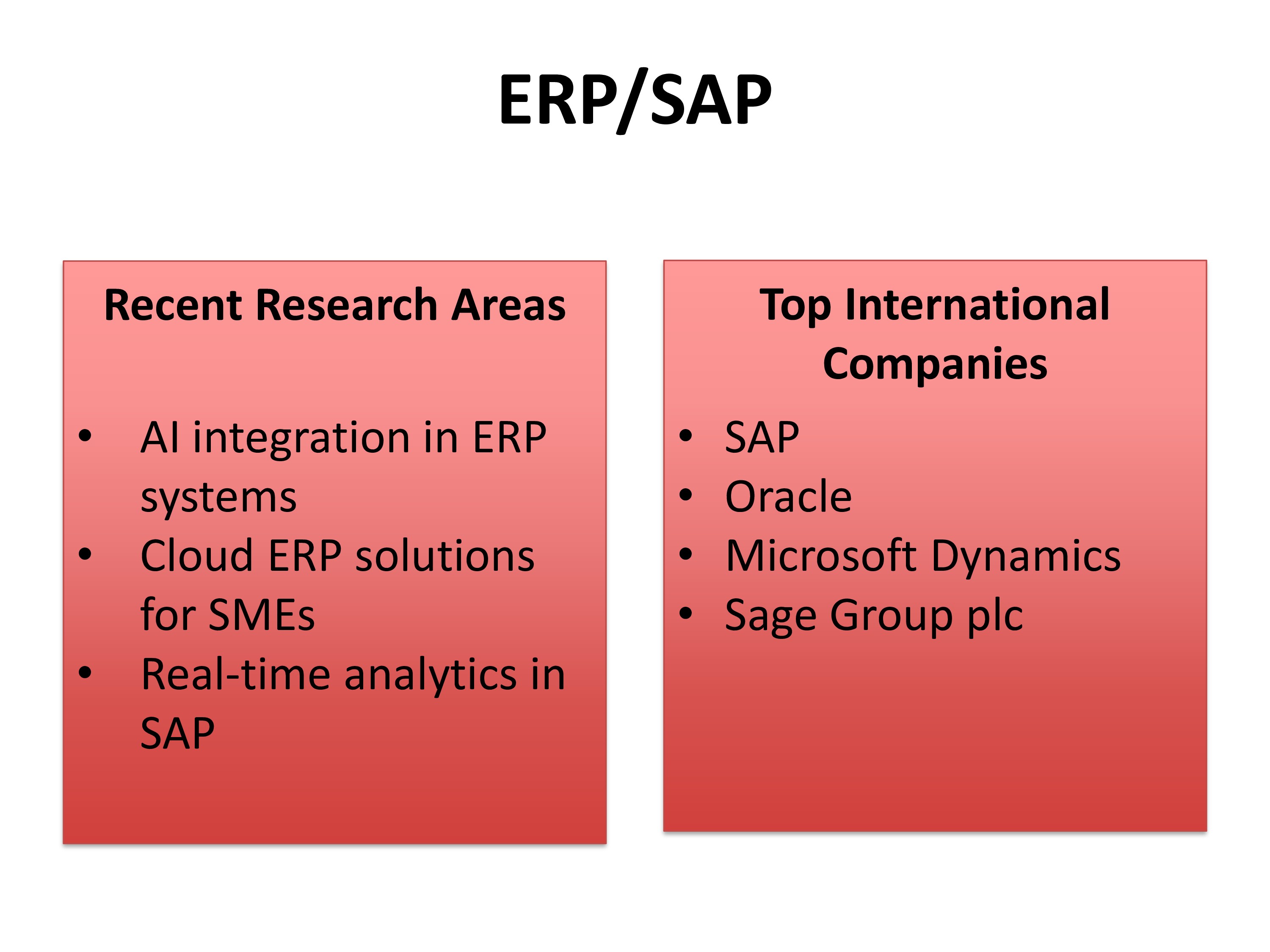
Question: Importance, Pre-Requisites, Job Opportunities and Educational Institutes:
Answer: ⬇
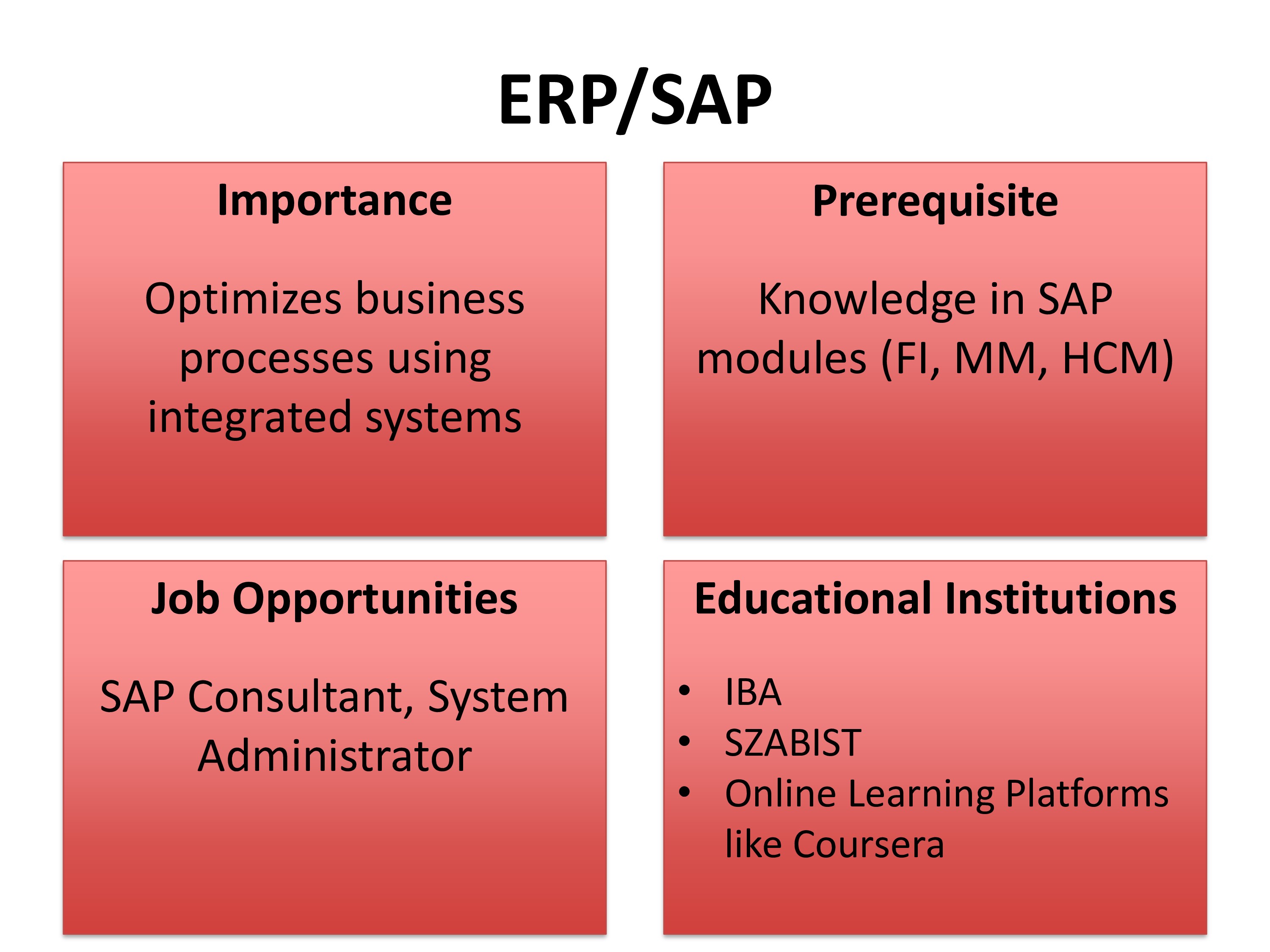
Question: Importance or Significance of the Subject Nationally/Internationally:
Answer: The significance of SAP ERP, both nationally and internationally, lies in its extensive capabilities to enhance business efficiency, streamline operations, and support decision-making across various industries. It provides Global Standardization, Operational Efficiency and Real-time Data and Analytics.
Question: Implication in Society and Corporate Sector:
Answer: The implications of SAP ERP in society and the corporate sector are profound, as it impacts operational efficiency, economic growth, technological advancement, and overall organizational effectiveness.
Question: Subsections of This Field and Their Utilization:
Answer: FI (Financial Accounting): Manages financial transactions, including general ledger, accounts payable/receivable, asset, and bank accounting. CO (Controlling): Handles internal reporting, cost management, and monitoring via cost elements, cost centers, internal orders, and profit centers. SD (Sales & Distribution): Oversees order-to-cash processes like sales orders, pricing, shipping, billing, and credit management. MM (Materials Management): Manages procurement, inventory, purchasing, vendor evaluation, and invoice verification. PP (Production Planning): Handles production planning and execution, including MRP, capacity planning, and shop floor control. QM (Quality Management): Manages quality planning, inspection, and control processes. PM (Plant Maintenance): Oversees maintenance activities like preventive, planned, and breakdown maintenance. HCM (Human Capital Management): Manages HR functions such as personnel administration, payroll, time management, recruitment, and development. PS (Project System): Handles project planning, execution, and monitoring, including structuring, scheduling, and costing.
Question: Opportunity Areas for Jobs and Business:
Answer: Education in SAP ERP opens up numerous opportunities for both jobs and business ventures such as SAP Consultants: Functional Consultants: Specialize in specific modules such as FI, CO, SD, MM, PP, or HCM, helping organizations implement and optimize these modules. Technical Consultants: Focus on the technical aspects, SAP ABAP (programming) SAP System Administrators: SAP Basis (system administration), Database management.
Question: Students’ Career Growth and Comparison with Other Fields:
Answer: Entry-Level Roles: Graduates can start as SAP analysts, junior consultants whereas obtaining certifications in specific SAP modules (e.g., SAP FI, SAP MM) can significantly enhance job prospects. In comparison with other fields like finance, marketing, and accounting offer stable career paths but may not provide the same rapid growth and earning potential as specialized IT roles.
Question: Financial Attraction and Comparison with Other Fields:
Answer: IT offers robust career growth and excellent salary prospects making it a highly attractive field.
Question: Other Attractions Besides Financial Benefits:
Answer: Other than financial benefits, IT offers opportunities for continuous learning, diverse roles, global exposure, job security, personal and professional growth, and the chance to make a meaningful impact on businesses.
Question: Research Work and Future Offshoots:
Answer: Research in the field of SAP ERP and its offshoots is continually evolving, driven by advancements in technology and changing business needs. Integration with Advanced Technologies such as Artificial Intelligence (AI) and Machine Learning (ML), Cloud Computing and Data Analytics etc.
Question: Best Educational Institutions:
Answer: For SAP, there are many Online Learning Platforms such as SAP Learning Hub and Coursera etc.
Question: Scope of job in government, private sector, multinational companies or at international level:
Answer: The scope of jobs in SAP ERP is extensive across government, private, multinational, and international sectors. Each sector offers unique opportunities, benefits, and career paths. With the right skills, certifications, and continuous learning, SAP professionals can enjoy a rewarding and dynamic career with opportunities for growth and international exposure
Question: Recommendation Considering Pakistan’s Economic Conditions:
Answer: Given the current economic conditions and market demands in Pakistan, pursuing education and training in SAP ERP can be highly beneficial
Question: Additional Information or Advice for the students pursuing this field:
Answer: Pursuing a career in SAP ERP can be highly rewarding, but it requires careful planning and dedication. Some additional tips and advice to help you succeed in this field: • Build a Strong Foundation • Choose the Right Specialization • Gain Practical Experience • Get Certified • Utilize Online Resources • Network and connect.
Question: Importance, Pre-Requisites, Job Opportunities and Educational Institutes:
Answer: ⬇
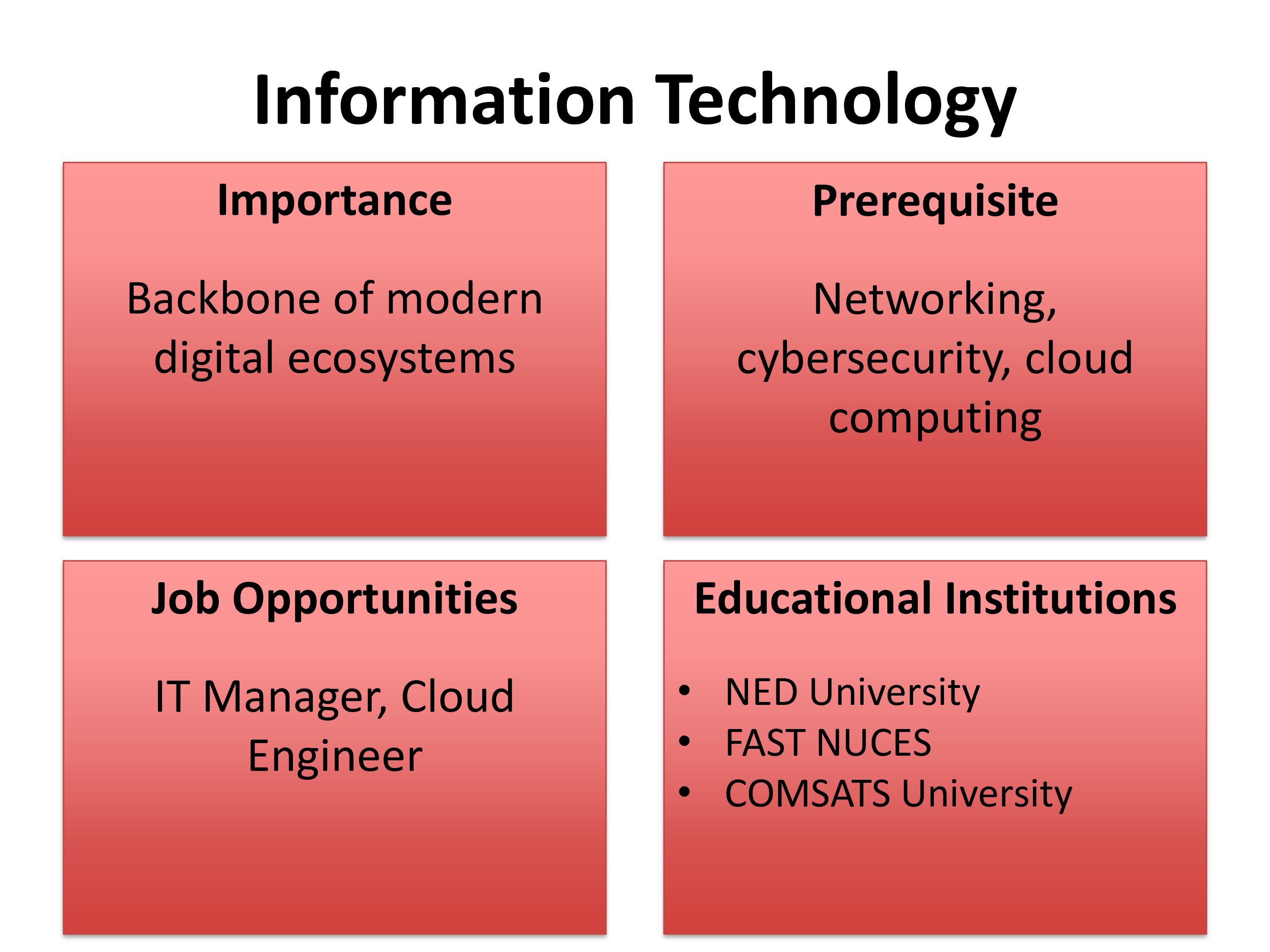
Question: Recent Research Areas & Top International Companies:
Answer: ⬇
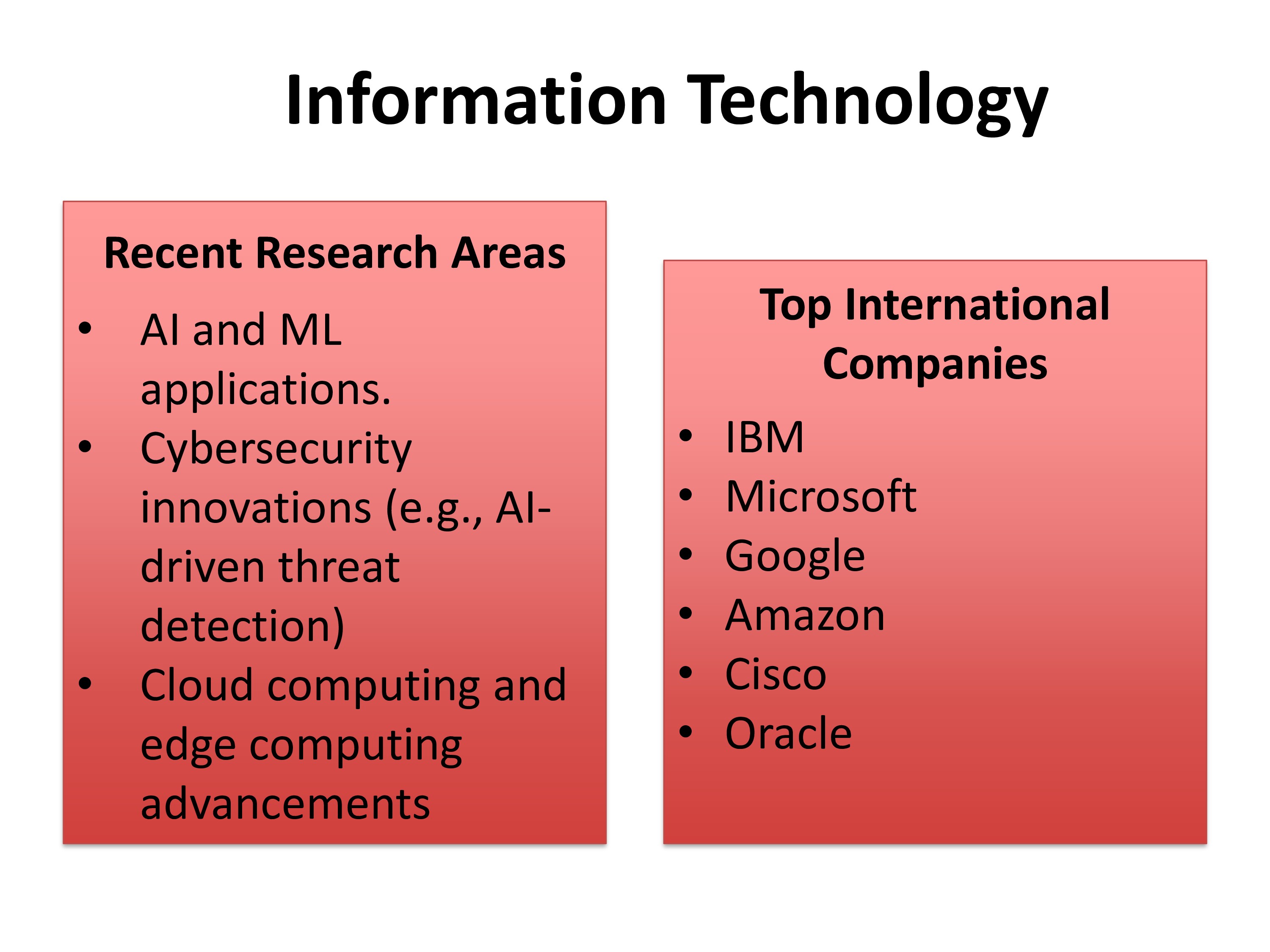
Question: Importance or Significance of the Subject Nationally/Internationally:
Answer: Information Technology (IT) is crucial nationally and internationally as it drives innovation, economic growth, and facilitates communication. It plays a key role in various industries, enhances efficiency, and fosters global connectivity, making it indispensable for societal development and progress.
Question: Implication in Society and Corporate Sector:
Answer: In society, IT facilitates communication, access to information, and digital services, improving overall quality of life. In the corporate sector, IT enables streamlined operations, enhances productivity, and supports innovation, contributing to business growth and competitiveness.
Question: Subsections of This Field and Their Utilization:
Answer: There are number of sub-fields of information technology that are gaining much importance in different application areas. These include 1. Artificial Intelligence: used to develop intelligent solutions for various field 2. Cyber Security: used for data security and privacy applications in all IT related applications 3. Data Science: used for data analytics and making reasonable decisions.
Question: Opportunity Areas for Jobs and Business:
Answer: Education in Information Technology opens up diverse opportunities for jobs and business. Some key areas include software development, cybersecurity, data analysis, cloud computing, IT consulting, and project management. Additionally, emerging fields like artificial intelligence, Internet of Things (IoT), and digital marketing offer significant potential for career growth and entrepreneurship.
Question: Students’ Career Growth and Comparison with Other Fields:
Answer: The field of Information Technology offers robust career growth opportunities for students. Rapid technological advancements create a constant demand for skilled IT professionals. Compared to some other fields, IT often provides quicker career progression due to the industry's dynamic nature and the need for specialized skills. However, individual career growth also depends on factors like continuous learning, adaptability, and staying abreast of industry trends. Overall, IT remains a promising field for students seeking dynamic and rewarding career paths.
Question: Financial Attraction and Comparison with Other Fields:
Answer: The financial attraction in the field of IT is often strong, with competitive salaries and lucrative opportunities. IT professionals, especially those with in-demand skills like software development, cybersecurity, or data science, tend to command high salaries. Compared to some other fields, IT can offer competitive compensation, reflecting the industry's critical role and the demand for specialized expertise.
Question: Other Attractions Besides Financial Benefits:
Answer: Other attractions in the field of IT include innovation, global impact, continuous learning, flexibility, diverse career paths, job security, engaging problem-solving, and entrepreneurship opportunities.
Question: Research Work and Future Offshoots:
Answer: Research in IT explores emerging technologies like artificial intelligence, quantum computing, and biotechnology. Future offshoots may include advancements in AI ethics, quantum computing applications, and bioinformatics for personalized healthcare.
Question: Best Educational Institutions:
Answer: There is a long list, however some globally renowned institutions known for strong IT programs include MIT, Stanford University, Carnegie Mellon University, ETH Zurich, and the National University of Singapore. Following national universities are leading in the education of information technology. • NED UET • FAST NUCES • COMSATS University Islamabad (CUI) • NUST - Pakistan. • Habib University
Question: Scope of job in government, private sector, multinational companies or at international level:
Answer: IT professionals have diverse job opportunities globally, including roles in government and private sector (IT specialists, cybersecurity , software development, IT management), multinational companies (IT consulting, project management), and international positions (global IT project management, cybersecurity). The scope is broad, reflecting the widespread need for IT skills across various sectors and locations.
Question: Recommendation Considering Pakistan’s Economic Conditions:
Answer: Yes, strongly recommended.
Question: Importance, Pre-Requisites, Job Opportunities and Educational Institutes:
Answer: ⬇
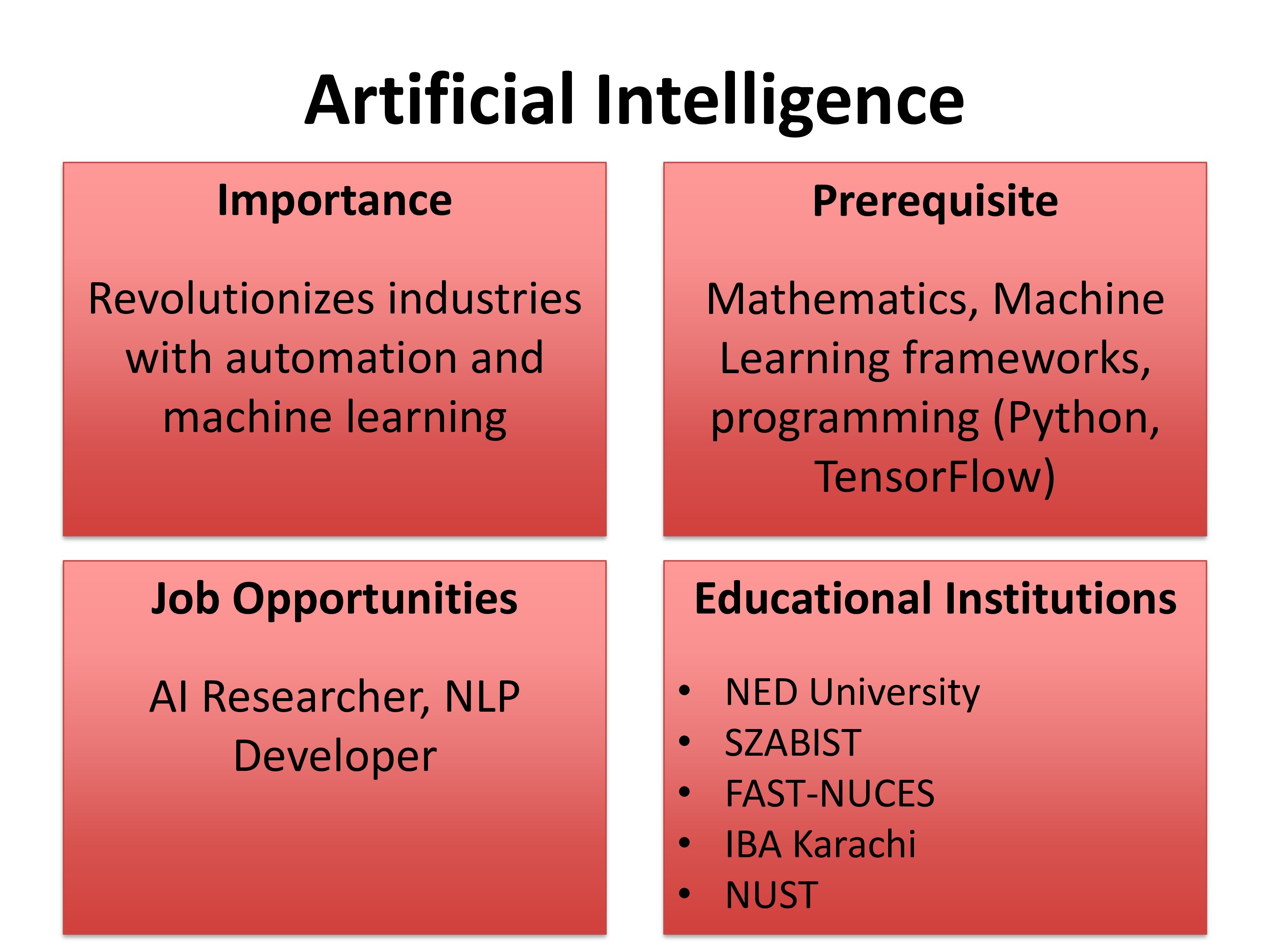
Question: Recent Research Areas & Top International Companies:
Answer: ⬇
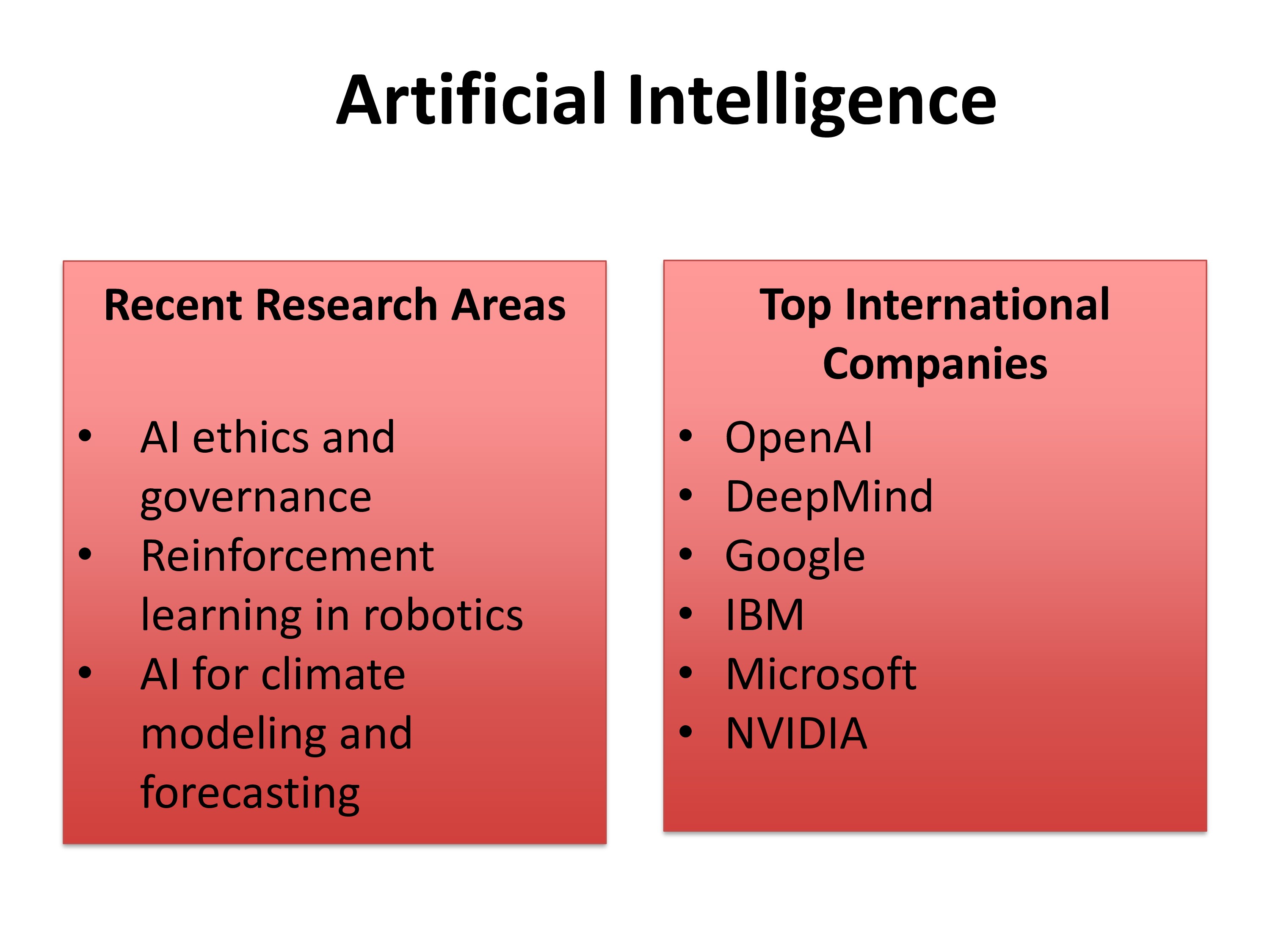
Question: What is the importance or significance of the subject nationally/ internationally:
Answer: AI is significant because it has the ability to alter our way of living and working. It has been successfully applied in business and to automate human-intensive processes including fraud detection, lead generating, quality control, customer support and Risk Management. The capacity of AI to automate monotonous jobs frees up human resources to concentrate on more intricate and creative projects, which is one of its main advantages. AI has the potential to greatly increase production and efficiency across a range of industries by streamlining procedures, particularly for repetitive tasks.
Question: Implication in Society and Corporate Sector:
Answer: • Cost Reduction • Quality of Life (Health Care, Convenience) • Data Privacy • Surveillance • Human-AI Interaction • Decision-Making • Accountability
Question: Subsections of This Field and Their Utilization:
Answer: Machine Learning: Machine learning can be used in a wide range of applications to save expenses, reduce risks, and enhance overall quality of life. Some examples of these applications include making product and service recommendations, identifying cybersecurity breaches, and enabling self-driving automobiles. Machine learning is becoming more commonplace every day and will soon be incorporated into many aspects of human life due to increased availability to data and computing capacity. Deep Learning: Deep Learning technology has several applications, such as enhancing health and forecasting system issues. It also has the ability to respond with text and recognize human voices.
Question: Opportunity Areas for Jobs and Business:
Answer: • Robotics engineer • Data scientist • Software engineer • Artificial intelligence (AI) engineer
Question: Students’ Career Growth and Comparison with Other Fields:
Answer: Artificial intelligence (AI) is a field that is expected to expand and change quickly for students, with many job options available in a wide range of industries. This is a thorough examination of how career advancement in AI differs from other fields: • High Demand • Global Demand • High Stability • Job Stability • Competitive Salaries • Continuous Learning
Question: Research Work and Future Offshoots:
Answer: 8. Research work in this field and its offshoot in near future? • Healthcare • Bioinformatics • Image Processing • Cognitive Computing • Gaming and Simulation • Robotics • Natural Language Processing
Question: Research Work and Future Offshoots:
Answer: 8. Research work in this field and its offshoot in near future? • Healthcare • Bioinformatics • Image Processing • Cognitive Computing • Gaming and Simulation • Robotics • Natural Language Processing
Question: Best Educational Institutions:
Answer: • FAST • Szabist • IBA
Question: Scope of job in government, private sector, multinational companies or at international level:
Answer: The scope of AI jobs spans across various sectors, including government, private sector, multinational companies, and at the international level.
Question: Recommendation Considering Pakistan’s Economic Conditions:
Answer: YES
Question: Importance, Pre-Requisites, Job Opportunities and Educational Institutes:
Answer: ⬇
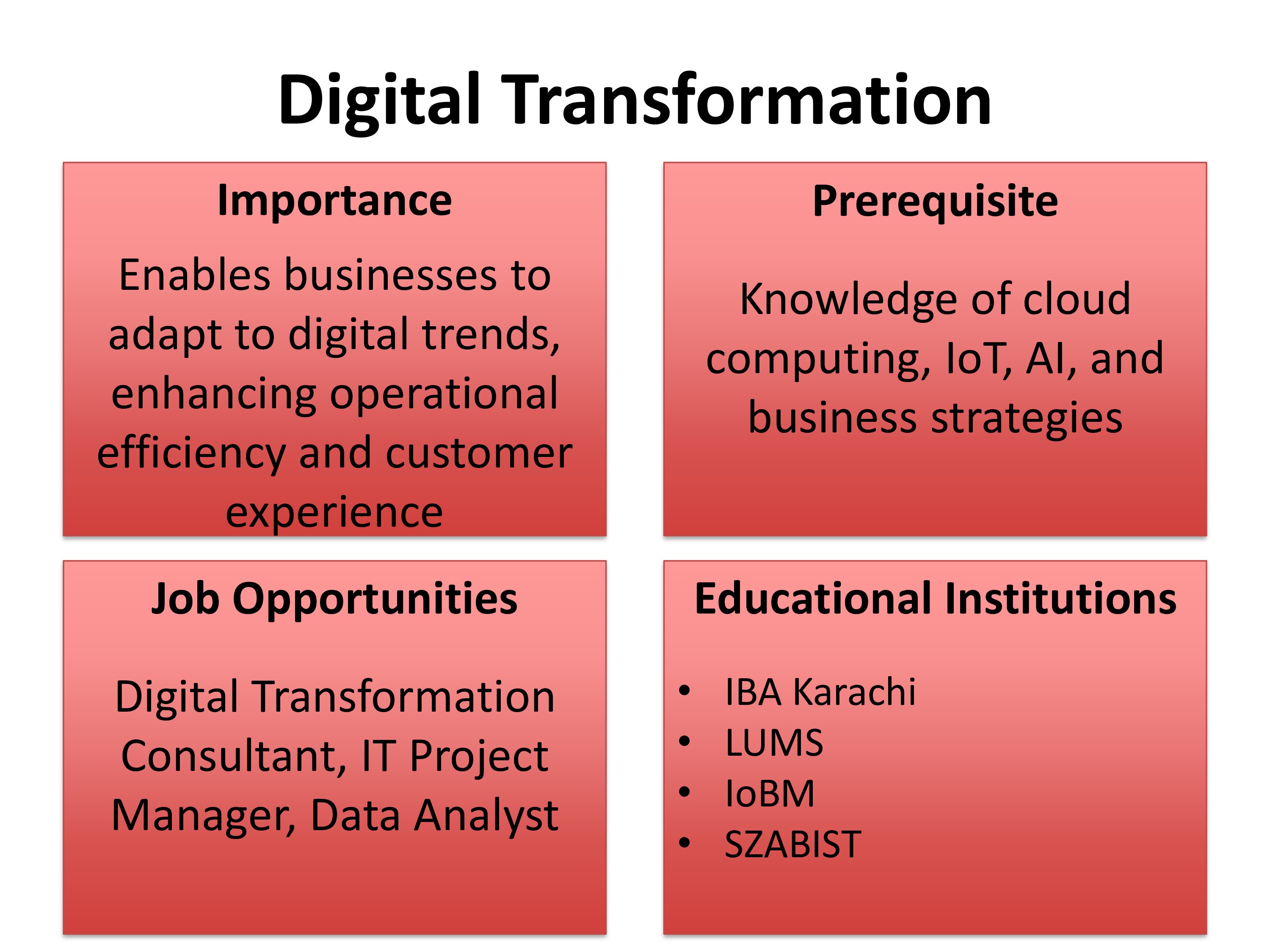
Question: Recent Research Areas & Top International Companies:
Answer: ⬇
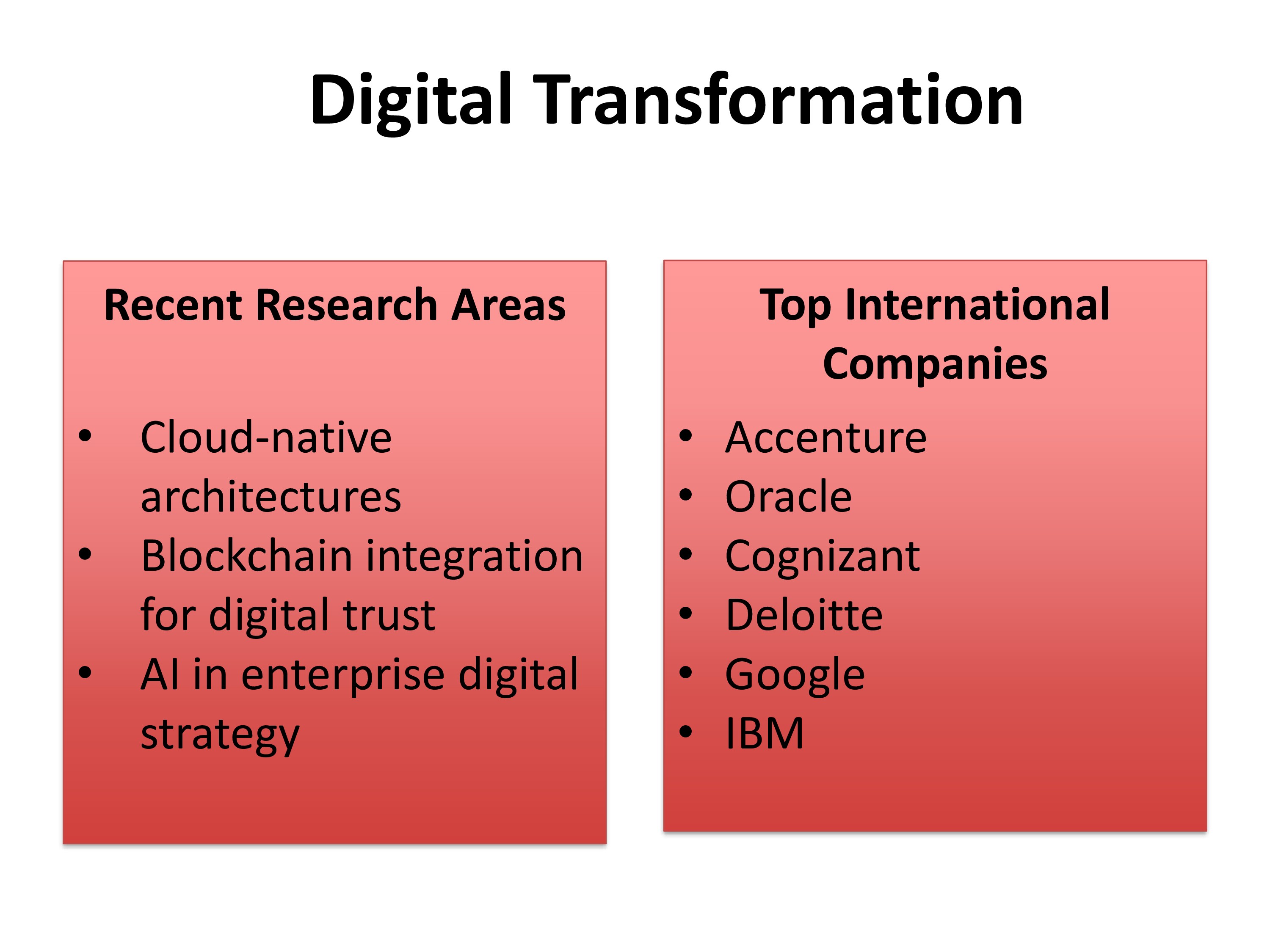
Question: Importance or Significance of the Subject Nationally/Internationally:
Answer: Digital transformation is pivotal for national development, economic growth, global competitiveness, and societal advancement. It reshapes industries, transforms governance, improves healthcare and education, and fosters international collaboration, setting the stage for a digitally connected and resilient future.
Question: Implication in Society and Corporate Sector:
Answer: Digital transformation profoundly impacts society by promoting access, empowerment, and innovation, while in the corporate sector, it drives operational efficiency, customer-centricity, innovation, and agility. Embracing digital transformation enables organizations to stay competitive, adapt to changing market dynamics, and contribute to societal progress through technology-driven solutions.
Question: Subsections of This Field and Their Utilization:
Answer: Digital transformation encompasses several key sub-sections: cloud computing for scalable IT infrastructure and software delivery; big data and analytics for deriving actionable insights from large datasets; Internet of Things (IoT) connecting devices for data collection and automation; artificial intelligence (AI) and machine learning (ML) for automation and decision-making; blockchain for secure, decentralized transactions and smart contracts; cybersecurity for protecting digital assets and networks; digital marketing and e-commerce for online customer engagement and sales; digital transformation consulting for guiding organizations through strategic and technological changes; augmented reality (AR) and virtual reality (VR) for immersive experiences; digital twins for simulating and optimizing physical assets; robotic process automation (RPA) for automating repetitive tasks; and smart cities technology for enhancing urban infrastructure and services. These sub-sections collectively drive innovation, efficiency, and transformation across industries, reshaping how businesses operate and interact with customers in the digital age.
Question: Opportunity Areas for Jobs and Business:
Answer: These opportunities highlight the breadth of career paths and entrepreneurial ventures available with expertise in digital transformation. Whether working in established industries or emerging technologies, professionals and businesses can leverage their skills to drive innovation, improve efficiency, and capitalize on the growing demand for digital solutions globally.
Question: Students’ Career Growth and Comparison with Other Fields:
Answer: Digital transformation is not something covered under one degree or program, it is a vast domain comprising of different techniques etc. each of which is best for the students as world is looking for digital transformation.
Question: Financial Attraction and Comparison with Other Fields:
Answer: Digital transformation careers offer strong financial attraction due to high demand, skill scarcity, continuous learning opportunities, global relevance, and entrepreneurial potential. Compared to other fields, digital transformation roles often provide competitive salaries and opportunities for career growth in rapidly evolving technology-driven environments.
Question: Other Attractions Besides Financial Benefits:
Answer: Careers in digital transformation offer compelling attractions beyond financial benefits. Professionals are drawn to the field for its opportunities in innovation and creativity, enabling them to work with cutting-edge technologies like AI and IoT. Career growth is abundant, with possibilities for advancement into leadership roles and specialization across diverse industries. The field also provides a sense of purpose through impactful work, continuous learning opportunities, flexibility in work arrangements, and a collaborative, diverse work environment. Additionally, digital transformation allows professionals to contribute to global initiatives, fostering entrepreneurship and making meaningful contributions to societal and technological advancements.
Question: Research Work and Future Offshoots:
Answer: Research in digital transformation encompasses exploring and advancing technologies that reshape industries and societies. Current research focuses on areas such as AI and machine learning for automation and predictive analytics, IoT for connected devices and smart environments, blockchain for secure transactions and decentralized applications, and cybersecurity for protecting digital assets. Future research is expected to expand into quantum computing, enabling more complex data processing and cryptography, as well as advancements in digital twins for simulation and optimization of physical systems. These innovations will drive further integration of digital technologies into everyday life, revolutionizing sectors like healthcare, finance, transportation, and urban planning, and paving the way for a more interconnected and efficient digital future.
Question: Best Educational Institutions:
Answer: As it is a collection of different sub domains so this needs to be checked accordingly
Question: Scope of job in government, private sector, multinational companies or at international level:
Answer: The scope of jobs in digital transformation is extensive across government, private sector, multinational companies (MNCs), and at the international level. In government, roles involve implementing digital initiatives like e-governance, digital identity systems, and smart city projects. In the private sector, opportunities range from tech firms developing AI, IoT, and cybersecurity solutions to digital marketing agencies and fintech companies innovating in finance. MNCs offer roles in global IT services, research and development, and digital strategy consulting. Internationally, professionals can engage in global projects, cybersecurity collaborations, and digital trade initiatives, showcasing the broad and impactful reach of digital transformation careers globally.
Question: Recommendation Considering Pakistan’s Economic Conditions:
Answer: Again, its not a single domain but comprising multiple fields but all are recommended
Question: Importance, Pre-Requisites, Job Opportunities and Educational Institutes:
Answer: ⬇
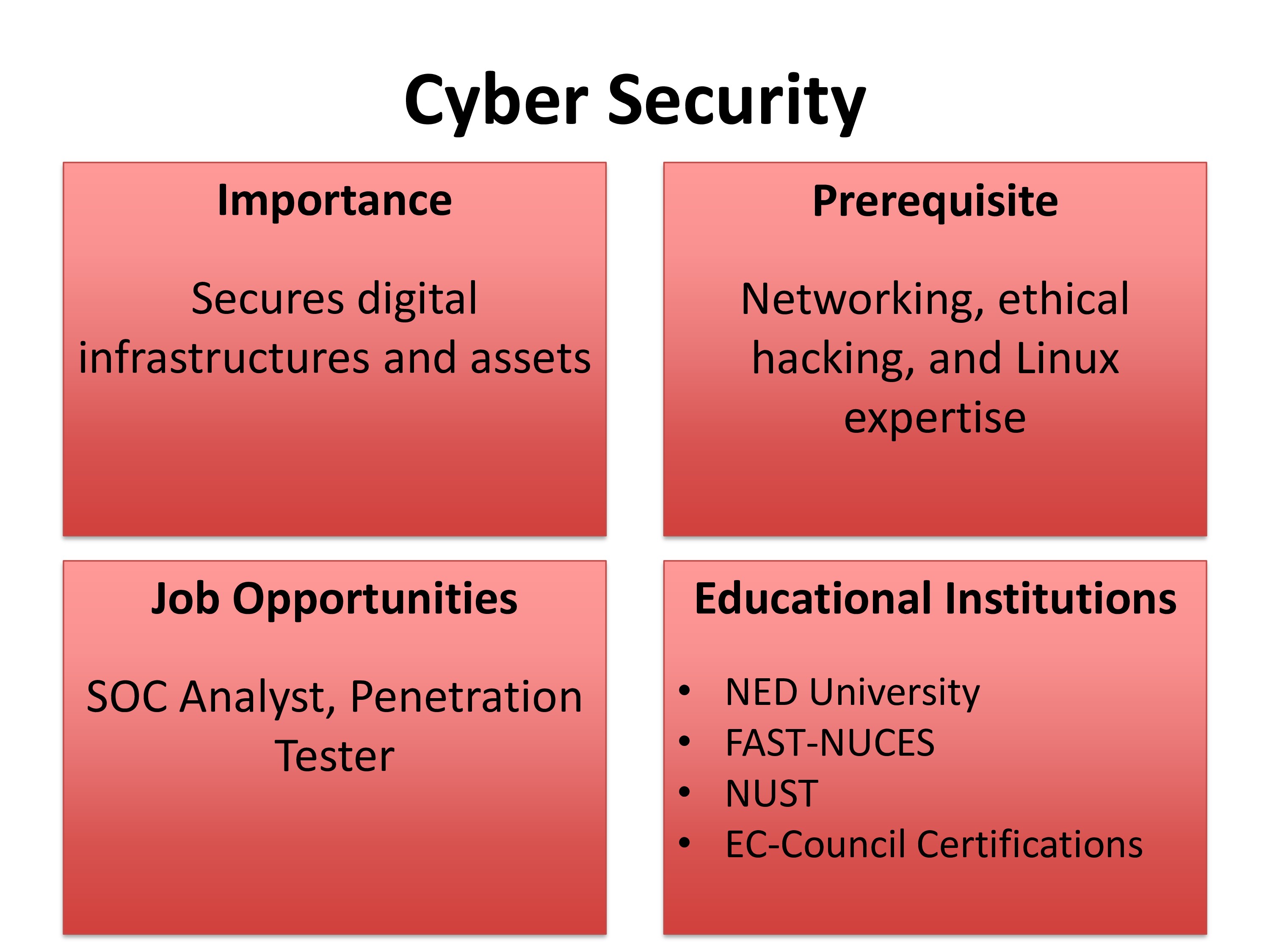
Question: Recent Research Areas & Top International Companies:
Answer: ⬇
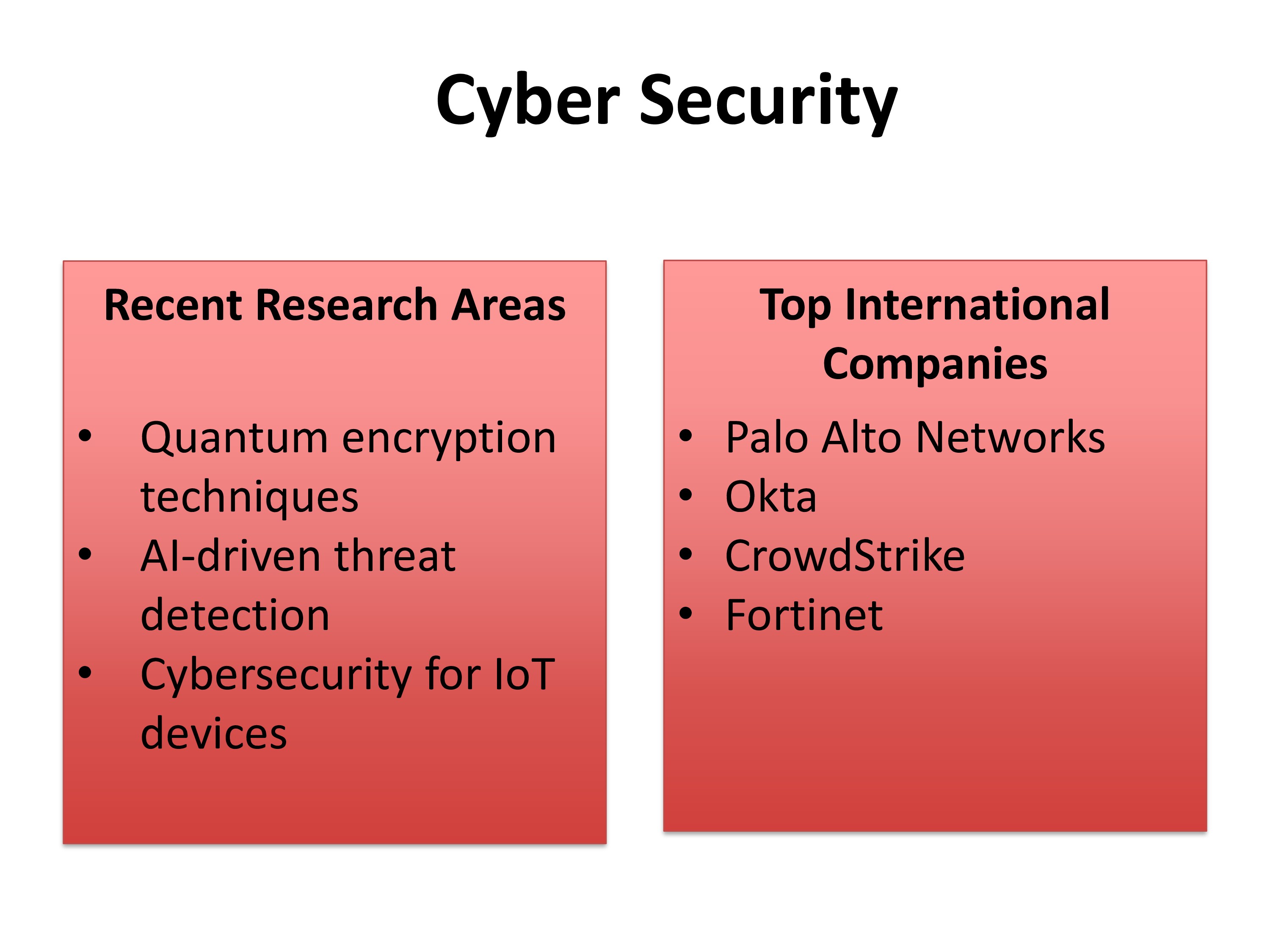
Question: What is the importance or significance of the subject nationally/ internationally:
Answer: a. In today’s era Cybersecurity cannot be ignored because only a single security breach leads to exposing personal and organizational information. By realizing the importance of Cyber Security multinational and national organizations are adopting the industry best security solutions in order to create a concrete wall against cyber threats. Hence a person having vast knowledge of the subject can be a valuable asset of any organization.
Question: It's implication in society and corporate sector:
Answer: a. Cybersecurity has significant implications in both society and the corporate sector: i. Social Implications: ii. Cybersecurity breaches can compromise personal data, leading to identity theft and invasion of privacy. iii. Cybercriminals use psychological manipulation to exploit individuals, leading to social engineering attacks. iv. Cyber attacks can disrupt financial systems, leading to economic losses and instability. v. Corporate Implications: vi. Cybersecurity breaches can damage a company's reputation and erode customer trust. vii. Cybersecurity ensures uninterrupted business operations, minimizing downtime and lost productivity.b. Having highly skills cyber security professional in organization can help to evade above risks.
Question: Subsections of This Field and Their Utilization:
Answer: a. There are many sub sections of Cyber Security. i. Network Security: Protecting computer networks from unauthorized access, misuse, or theft. ii. Application Security: Ensuring software applications are secure, vulnerability-free, and resistant to attacks. iii. Data Security: Protecting data from unauthorized access, theft, or corruption. iv. Endpoint Security: Securing end-user devices like laptops, smartphones, and tablets. v. Cloud Security: Ensuring cloud-based systems, data, and applications are secure. vi. Penetration Testing: Simulating attacks to test defenses and identify weaknesses. vii. Disaster Recovery: Planning and preparing for disaster scenarios to minimize downtime. viii. Security Awareness Training: Educating users about cybersecurity best practices. b. Utilization: Cybersecurity is utilized in various ways to protect individuals, organizations, and governments from cyber threats. i. Encryption, access controls, and authentication measures ensure that personal and confidential information remains secure. ii. Cybersecurity measures like SSL/TLS and two-factor authentication safeguard online financial transactions and e-commerce activities. iii. Antivirus software, firewalls, and intrusion detection systems help prevent and detect malicious code and unauthorized access. iv. Conducting penetration testing and vulnerability assessments
Question: Opportunity areas for jobs and business with this education:
Answer: a. As updated earlier many organizations are now adopting the industry best security solution and having a dedicated department for Cyber Security. Companies are building on premises and hosted Security operation center (SOC) for 24 hrs monitoring of traffic trend and real time threats. This requirement is creating so many job opportunities in the market. b. Here are some of the top cybersecurity jobs titles. i. Chief Information Security Officer (CISO): A CISO is responsible for ensuring the complete safety of information in an organization. ii. Security Architect: A security architect is responsible for designing robust security structures that are used to prevent malware attacks. iii. Cybersecurity Engineer: Cybersecurity engineers work on planning security measures to prevent the organization from a cyberattack. iv. Malware Analyst: A malware analyst identifies and examines cyber threats such as viruses, worms, bots and trojans to understand their nature. v. Penetration Tester: A penetration tester, also commonly known as an ethical hacker, is a network security consultant who exploits a system’s vulnerabilities just like a hacker would.
Question: Students’ Career Growth and Comparison with Other Fields:
Answer: a. The demand for cybersecurity jobs has risen significantly in recent years. As organizations in Pakistan in overseas countries are hiring security professionals. The field has very vast scope in the market and having multiple growth opportunities than other field
Question: Financial Attraction and Comparison with Other Fields:
Answer: a. Cyber security services can be offered as freelancer as well. It would have healthy financial benefits than other fields. There is 32% increase in cybersecurity employment is predicted between 2022 and 2032. Around 16,800 new job opportunities annually over the forecast period.
Question: Other Attractions Besides Financial Benefits:
Answer: a. High demand and low unemployment rate in the field. b. Constantly evolving threats and technologies require continuous learning and adaptation. c. Career progression from entry-level to leadership roles. d. Opportunities for specialization in areas like ethical hacking, incident response, or security architecture. e. Remote work options and flexible schedules are common in the field. f. Cybersecurity professionals are highly respected for their expertise and contributions. g. Working with teams and international organizations to combat global cyber threats. h. Working with the latest technologies and tools to stay ahead of threats. i. Cybersecurity is a global field with opportunities to work internationally
Question: Research Work and Future Offshoots:
Answer: a. Here are some potential offshoots of cybersecurity in the near future: i. Artificial Intelligence Security (AIsec): Developing AI-powered security solutions and securing AI systems. ii. Internet of Things (IoT) Security: Securing connected devices and networks. iii. Cloud Security: Protecting cloud-based infrastructure, data, and applications. iv. Quantum Computing Security (QCS): Developing security solutions for quantum computing threats. v. Extended Detection and Response (XDR): Integrating security tools for enhanced threat detection and response. vi. DevSecOps: Integrating security into DevOps practices for secure software development. vii. Autonomous Security: Using AI and machine learning for autonomous security decision-making. viii. Blockchain Security: Securing blockchain-based systems and applications. ix. 5G Security: Protecting 5G networks and devices from cyber threats. x. Edge Security: Securing edge computing devices and networks. xi. Cyber Physical Security: Securing physical systems and devices connected to the internet. xii. Digital Forensics and Incident Response (DFIR): Investigating and responding to cyber incidents. xiii. Security Orchestration, Automation, and Response (SOAR): Automating security incident response processes. xiv. Identity and Access Management (IAM): Managing user identities and access to resources. xv. Supply Chain Security: Securing supply chains from cyber threats.
Question: Best Educational Institutions:
Answer: a. Cyber Security is very flexible in terms of learning. i. Self learning ii. Instructor led training iii. Institution based training and certification iv. University Degree b. Now a day almost all major Government and Private universities are offering Graduation and Masters degree in Cyber Security. Further EC-Counsil is global organization which have official certification programs in Cyber Security. It has several affiliated institutions in Pakistan. Students can enroll themselves from official training an appear in Certification exams.
Question: Scope of job in government, private sector, multinational companies or at international level:
Answer: a. Every organization has sensitive data and hackers are always in search of a way to penetrate the infrastructure of organizations and reach out sensitive information. Hence many organizations now have a particular department of Cyber Security and building Security Operation Centers (SOC) for monitoring the traffic trend and real time threats. Hence there is a very vast scope of jobs the field in both Government and Private organizations.
Question: Recommendation Considering Pakistan’s Economic Conditions:
Answer: a. The field is highly recommended, Students should have knowledge professional level knowledge and hands-on experience on Cyber Security tools so that they can prove themselves as a strong hurdle against security threats.
Question: Additional Information or Advice for the students pursuing this field:
Answer: a. The students who want built their career in Cyber Security are strongly advised to have concepts and knowledge of Networks, Routing Switching and routing protocols plus hand-on experience on Linux Operating system.
Question: Recent Research Areas & Top International Companies:
Answer: ⬇
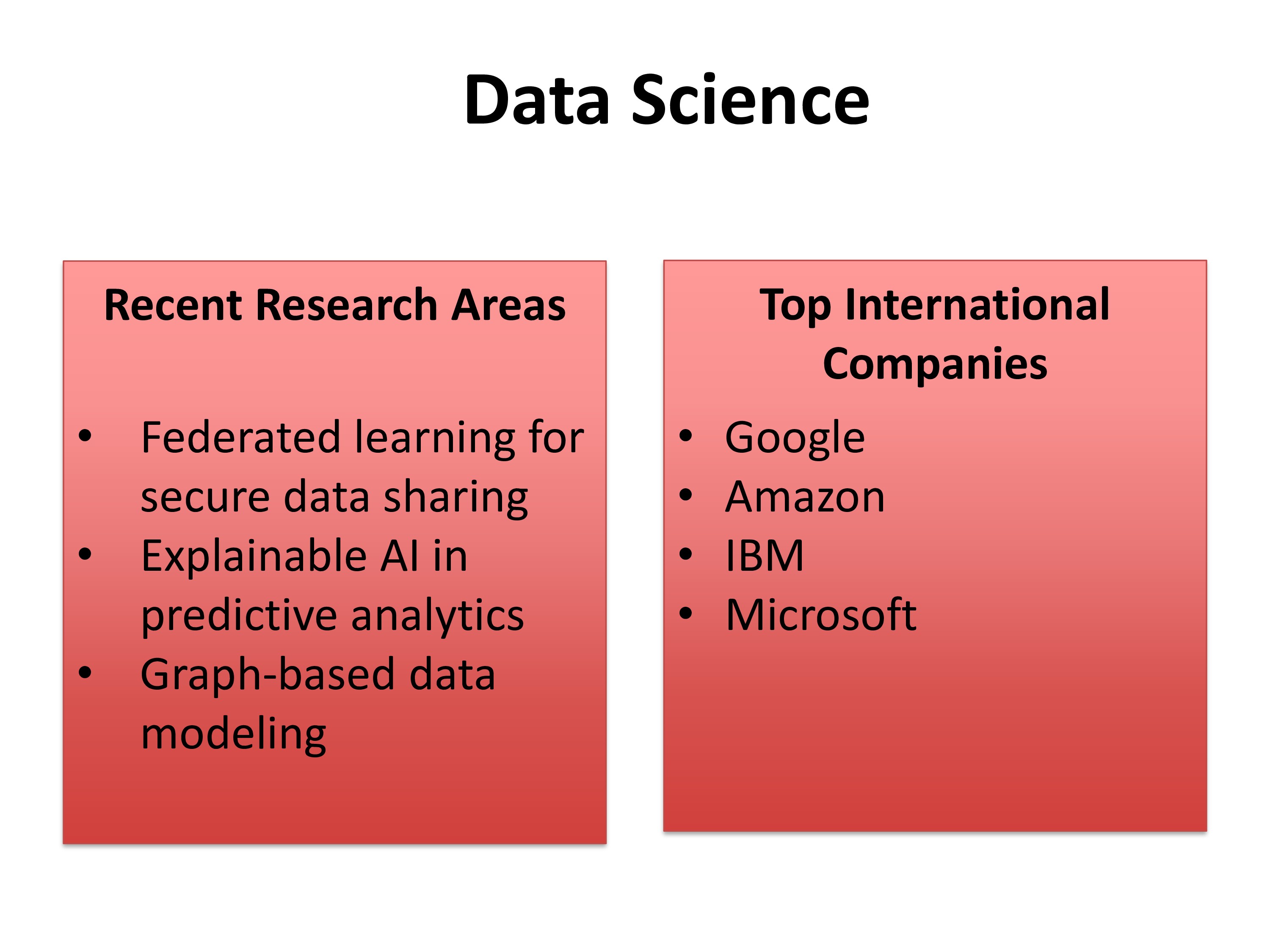
Question: Importance, Pre-Requisites, Job Opportunities and Educational Institutes:
Answer: ⬇
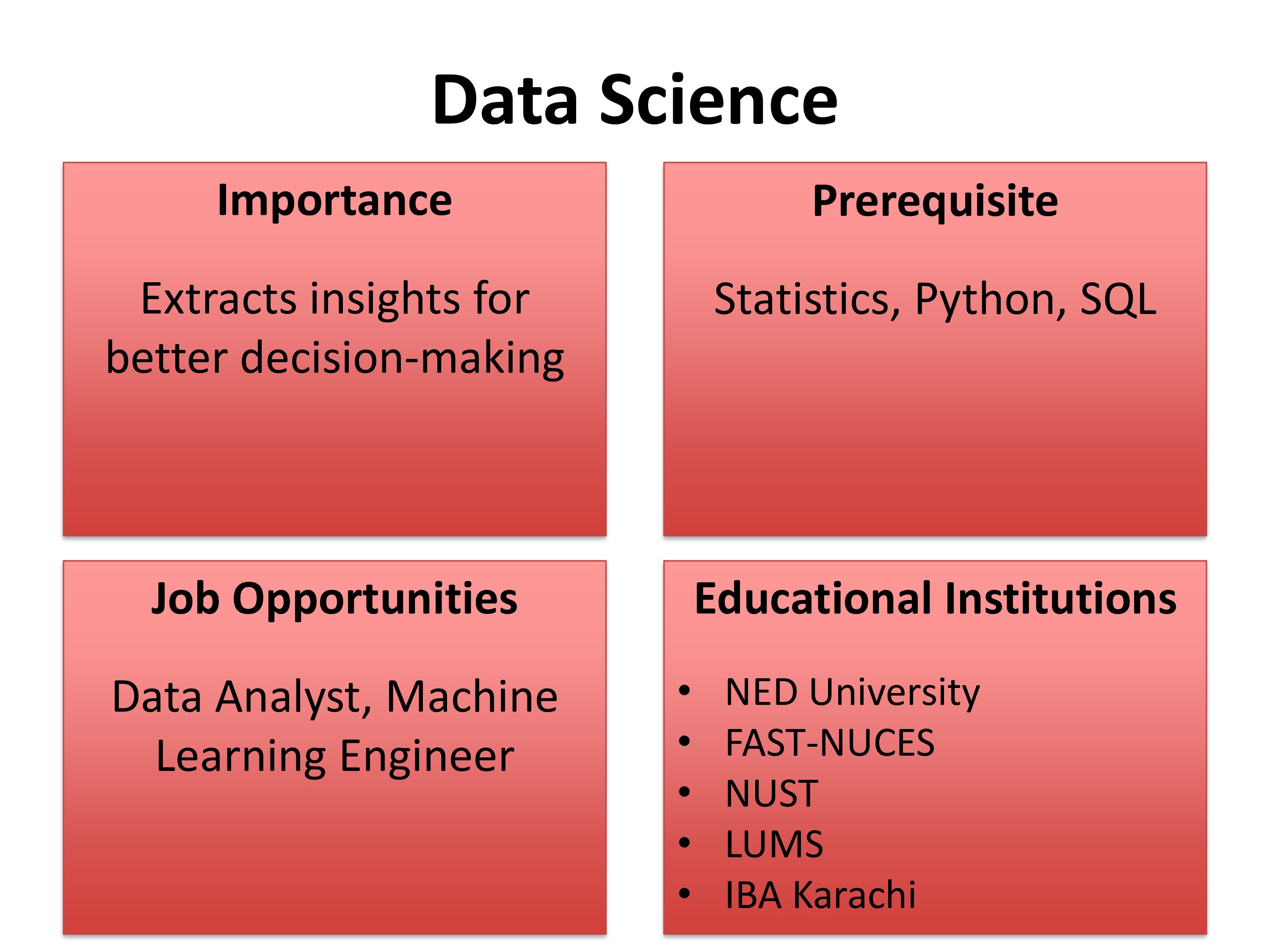
Question: What is the importance or significance of the subject nationally/ internationally:
Answer: Answer: Data science is crucial globally as it helps governments, businesses, and organizations make data-driven decisions, improving efficiency and innovation across industries.
Question: Implication in Society and Corporate Sector:
Answer: In society, data science impacts healthcare, education, and urban planning, while in the corporate sector, it enhances operations, marketing strategies, and customer experiences.
Question: Subsections of This Field and Their Utilization:
Answer: Key areas include machine learning, data mining, and AI, each used to extract insights, automate tasks, and predict trends across sectors like finance, healthcare, and retail.
Question: Opportunity areas for jobs and business with this education:
Answer: Data science offers roles such as data analyst, machine learning engineer, and data scientist, with demand in both tech startups and established corporations globally.
Question: Students’ Career Growth and Comparison with Other Fields:
Answer: Data science provides strong career growth compared to many fields due to the rapid demand for skilled professionals in diverse industries.
Question: Financial attraction and its comparison with other fields:
Answer: With high salaries, data science often surpasses traditional fields, especially in tech and consulting roles, due to the skills and expertise required.
Question: Other Attractions Besides Financial Benefits:
Answer: Besides financial rewards, data science offers intellectual challenges, creative problem-solving, and the chance to impact various fields like healthcare and climate change.
Question: Research Work and Future Offshoots:
Answer: Current research in AI and deep learning will likely lead to advancements in automation, predictive modeling, and decision-making in the near future.
Question: Best Educational Institutions:
Answer: Renowned institutions for data science include MIT, Stanford, and Harvard internationally; in Pakistan, LUMS, NUST, and FAST are prominent.
Question: Scope of job in government, private sector, multinational companies or at international level:
Answer: Data science professionals have roles in government, private companies, multinational corporations, and globally due to the universal demand for data-driven insights.
Question: Recommendation Considering Pakistan’s Economic Conditions:
Answer: Given Pakistan’s growing tech sector, data science is a valuable field to pursue, especially for those interested in tech and analytics.
Question: Additional Information or Advice for the students pursuing this field:
Answer: : Focus on developing programming, analytical, and statistical skills, and stay updated on industry trends; data science is dynamic and highly interdisciplinary.
Question: Importance, Pre-Requisites, Job Opportunities and Educational Institutes:
Answer: ⬇
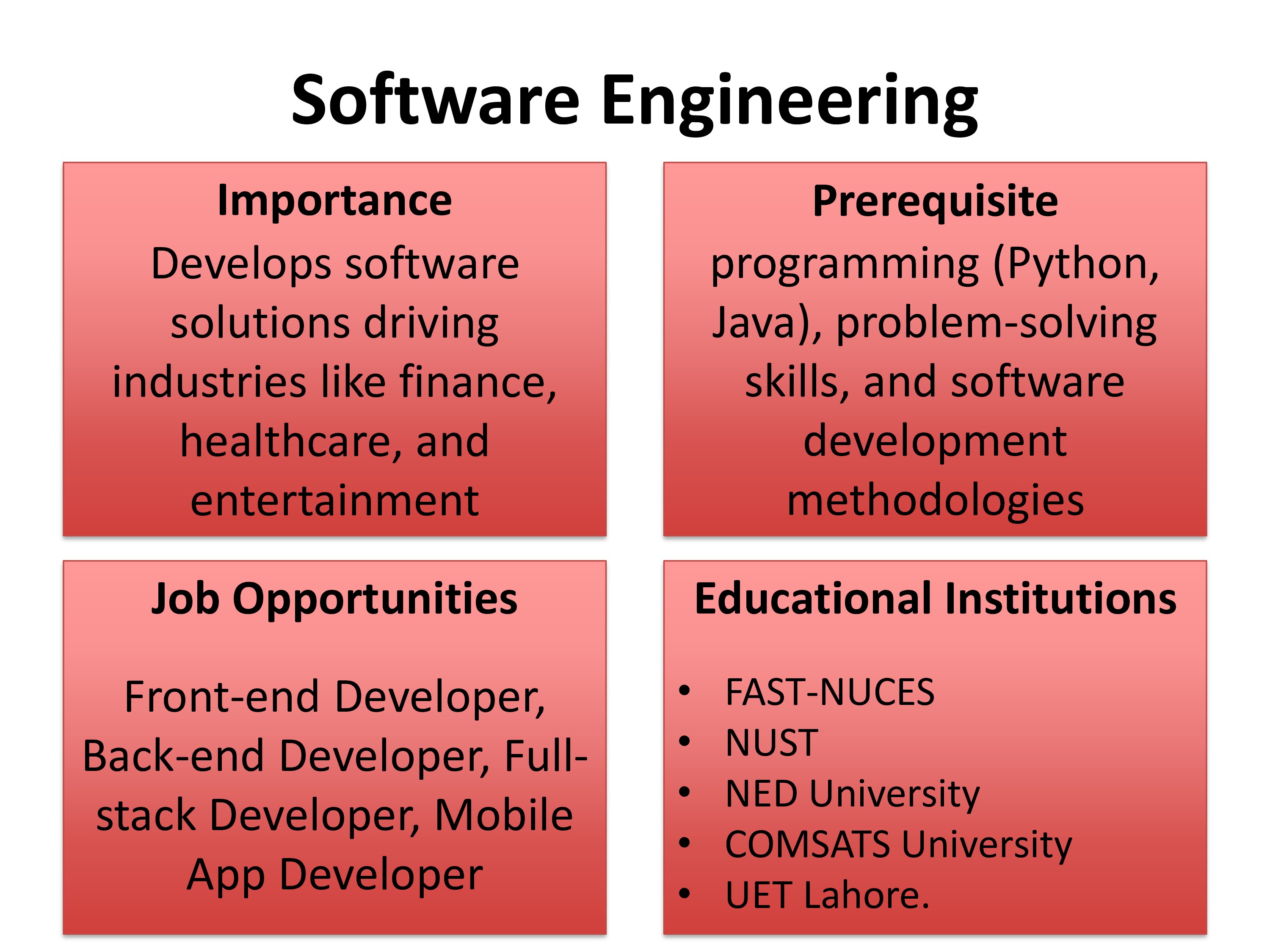
Question: Recent Research Areas & Top International Companies:
Answer: ⬇
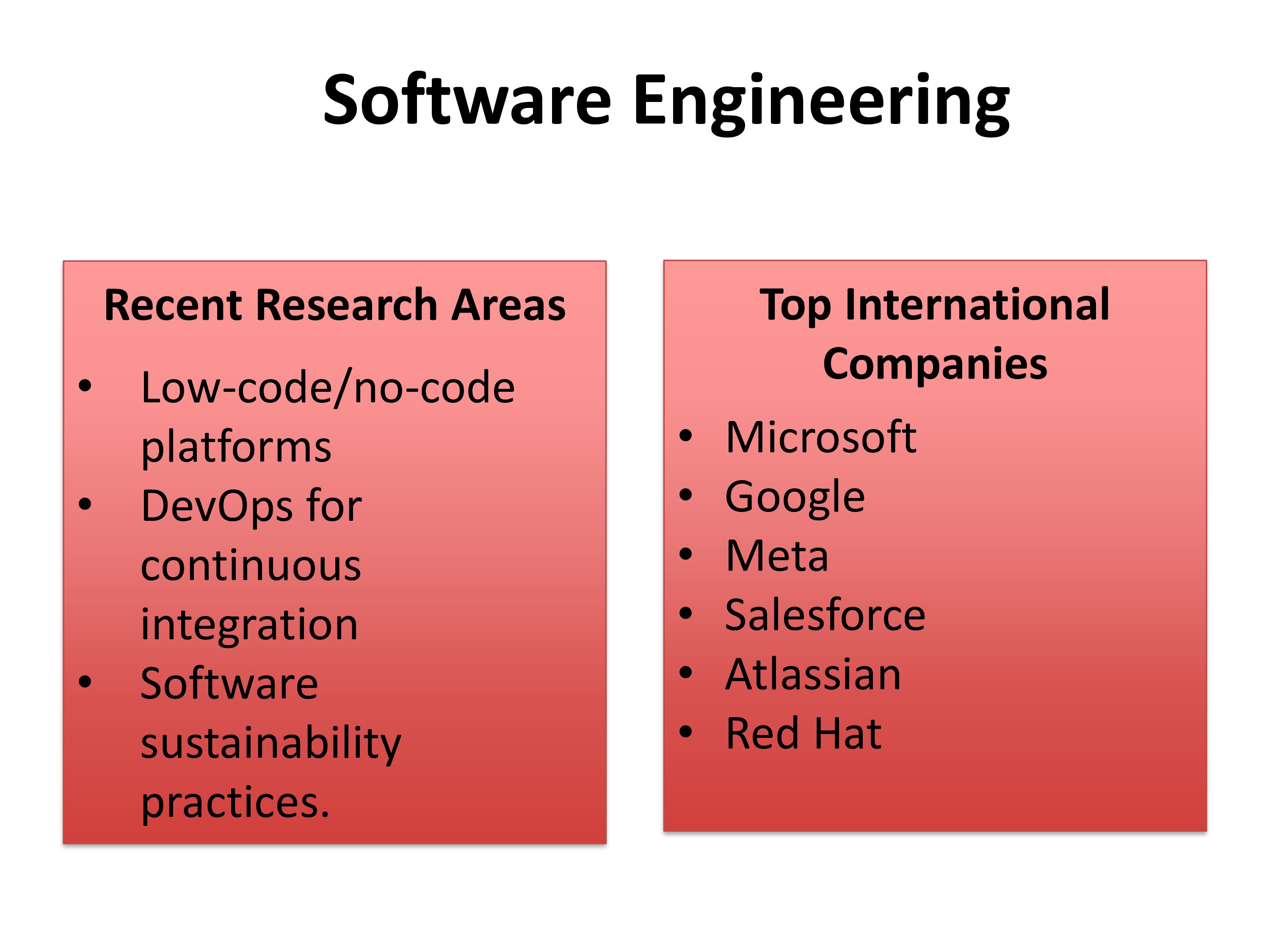
Question: Importance or Significance of the Subject Nationally/Internationally:
Answer: Software Engineering is at the heart of today’s global tech-driven world. It’s not just about coding; it’s about creating solutions that can transform industries and improve lives. Whether it’s in Pakistan or any other country, software engineers are the ones behind the apps and systems we rely on every day, making this field incredibly important both nationally and internationally
Question: Implication in Society and Corporate Sector:
Answer: In society and the corporate world, Software Engineering plays a huge role. It’s the backbone of innovation, driving everything from how businesses operate to how we communicate with each other. In companies, software engineers help streamline processes, boost efficiency, and create products that can make a real difference in people’s lives.
Question: Subsections of This Field and Their Utilization:
Answer: Software Engineering is a broad field with several exciting areas to dive into. Whether it’s Full-Stack Development for building user-friendly web apps, Data Engineering for handling massive datasets, or Cybersecurity for keeping our digital world safe, there’s a place for everyone’s interests. Each of these areas is vital, contributing to everything from user experience to data security.
Question: Opportunity Areas for Jobs and Business:
Answer: The job opportunities in Software Engineering are vast and diverse. Whether you want to work as a Software Developer, Data Scientist, or even start your own tech business, this field offers plenty of paths to explore. Plus, the skills you gain are versatile, allowing you to work in various industries like finance, healthcare, or even startups.
Question: Students’ Career Growth and Comparison with Other Fields:
Answer: If you’re looking for a career with fast growth and plenty of opportunities, Software Engineering is a great choice. Compared to many other fields, it offers quick advancements and the flexibility to move into different roles, whether you’re aiming to be a Senior Developer, a Technical Lead, or something else. The possibilities are endless.
Question: Financial Attraction and Comparison with Other Fields:
Answer: One of the big draws of Software Engineering is its financial rewards. It’s a well-paying field, often offering higher salaries right from the start. And as you gain experience, your earning potential only increases. Compared to other professions, the financial prospects here are definitely appealing.
Question: Other Attractions Besides Financial Benefits:
Answer: Beyond the paycheck, Software Engineering offers a lot of other perks. It’s incredibly satisfying to solve complex problems and see your work come to life in real-world applications. The field is also perfect for lifelong learners, as there’s always something new to explore and master.
Question: Research Work and Future Offshoots:
Answer: Research in Software Engineering is moving fast, especially in cutting-edge areas like AI, Blockchain, and Quantum Computing. These are not just buzzwords; they’re shaping the future of technology. Whether it’s creating smarter systems or making data more secure, the research happening today is setting the stage for tomorrow’s innovations.
Question: Best Educational Institutions:
Answer: If you’re thinking about where to study Software Engineering, look no further than places like MIT in the US, the University of Cambridge in the UK, or even FAST-NUCES here in Pakistan. These institutions are known for their strong programs and industry connections, giving you a solid start in your career
Question: Scope of job in government, private sector, multinational companies or at international level:
Answer: The job market for Software Engineers is incredibly broad. You can find roles in government agencies, private companies, multinational corporations, or even internationally. The demand for software engineers is universal, making it a career with endless opportunities no matter where you are
Question: Recommendation Considering Pakistan’s Economic Conditions:
Answer: Absolutely! Given the current economic conditions in Pakistan, pursuing a degree in Software Engineering is a smart choice. The tech industry here is growing rapidly, and there’s a strong demand for skilled professionals. This field not only offers job stability but also a chance to be part of an industry that’s shaping the future.
Question: Additional Information or Advice for the students pursuing this field:
Answer: My advice for anyone getting into Software Engineering? Stay curious and keep learning. This field changes quickly, so it’s important to stay on top of new technologies and trends. Also, don’t underestimate the power of networking—connecting with others in the field can open up unexpected opportunities and help you grow both personally and professionally.
Question: Importance, Pre-Requisites, Job Opportunities and Educational Institutes:
Answer: ⬇
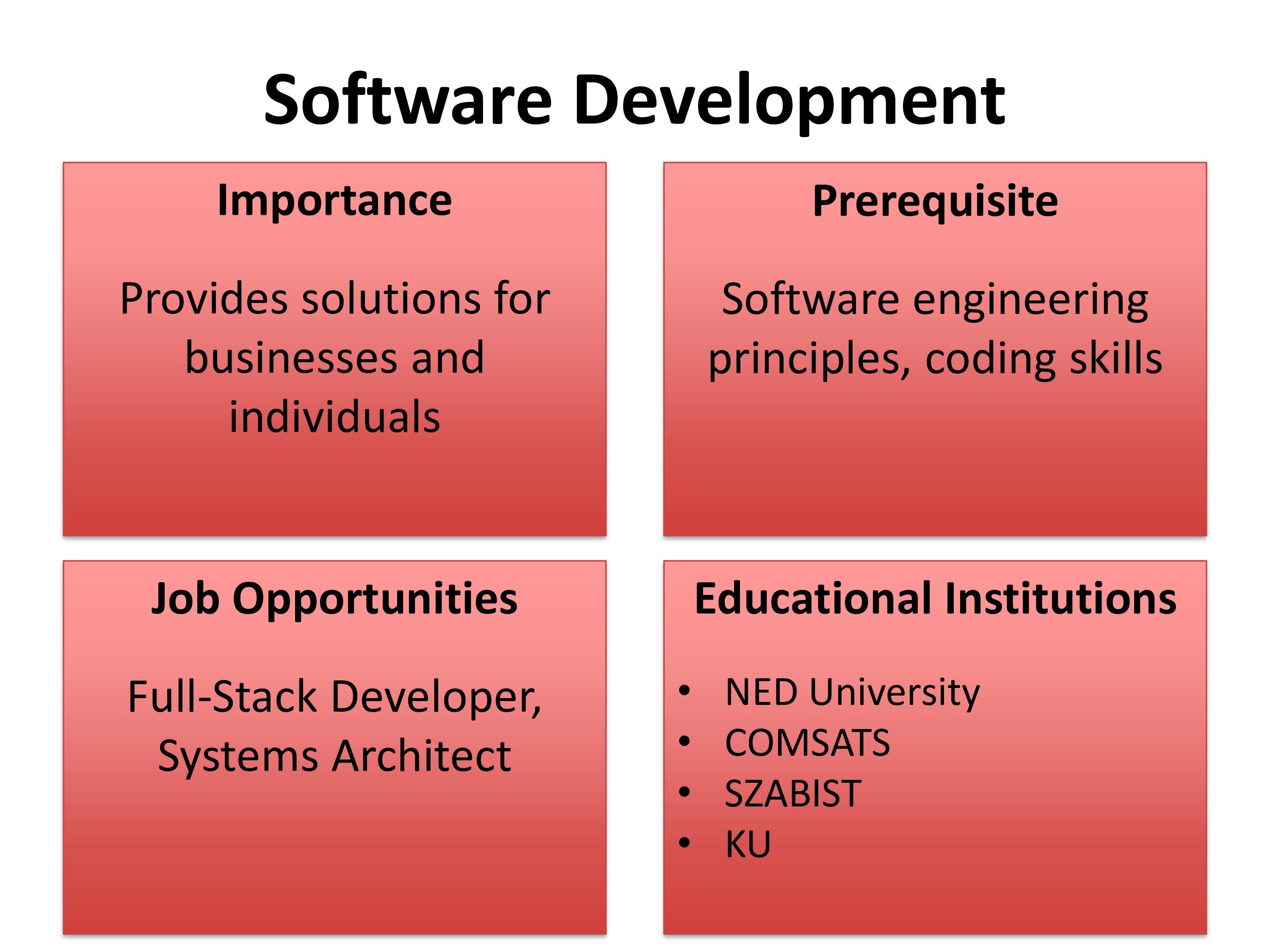
Question: Recent Research Areas & Top International Companies:
Answer: ⬇
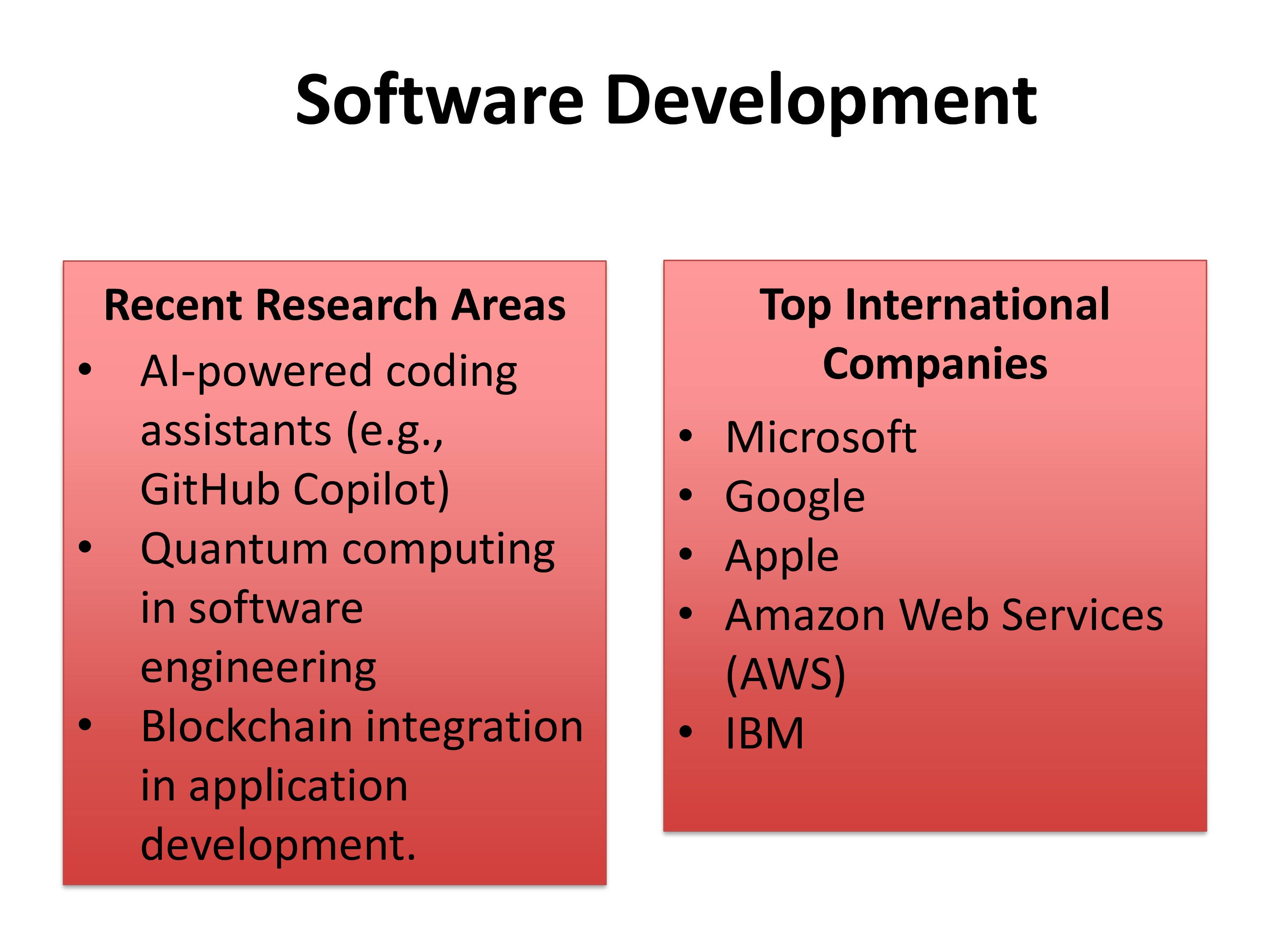
Question: Importance or Significance of the Subject Nationally/Internationally:
Answer: Nationally It fuels economic growth through high-paying jobs, foreign investment, and innovation across industries. It also modernizes Pakistan's infrastructure and empowers entrepreneurs and on the other hand, Pakistani developers are recognized for their talent, contributing to global projects and boosting exports. This collaboration fosters innovation and strengthens the country's position in the tech world.
Question: Implication in Society and Corporate Sector:
Answer: a) Society: • Transformation: Software drives advancements in communication, education, healthcare, and access to information. It connects people globally, fosters collaboration, and streamlines daily tasks. • Challenges: Issues like digital divide, job displacement due to automation, and privacy concerns need to be addressed to ensure equitable access and responsible development. b) Corporate Sector: • Efficiency and Growth: Software automates processes, improves data analysis, and optimizes workflows, leading to increased efficiency and profitability. • Innovation and Competition: Software development fosters innovation by creating new products, services, and business models. This fuels competition and drives continuous improvement. • Workforce Transformation: New skillsets are needed to manage, develop, and utilize software effectively. Companies need to adapt their training and talent acquisition strategies.
Question: Subsections of This Field and Their Utilization:
Answer: a) Front-End Development: Front-end developers are the architects of the user interface (UI) and user experience (UX) - the visual elements and interactive features users directly engage with & they utilize programming languages like HTML, CSS, and JavaScript to build responsive interfaces that function seamlessly across various devices (desktop, mobile, tablets). Frameworks not limited to React.js and Angular.js further enhance their capabilities. b) Back-End Development: Back-end developers work behind the scenes, crafting the server-side logic and database architecture that power an application. & they leverage languages like Python, Java, and C# to handle data processing, server communication, and ensuring application functionality. Frameworks like Dot.Net, Django and Ruby on Rails streamline back-end development processes. c) Full-Stack Development: Full-stack developers possess a comprehensive skillset encompassing both front-end and back-end development & they can handle all aspects of software creation, from building user interfaces to crafting the underlying logic and database interactions. This versatility makes them valuable assets for smaller teams or projects requiring a single developer to manage the entire development cycle. d) Mobile Development: Mobile developers specialize in creating applications specifically designed for smartphones and tablets & they utilize platform-specific tools and languages (Swift for iOS, Java/Kotlin for Android) to build feature-rich mobile apps that leverage the unique functionalities of these devices (GPS, camera, etc.). e) Web Development: Web developers encompass both front-end and back-end developers who work on creating web applications that run on a web browser & they utilize a combination of technologies (HTML, CSS, JavaScript, server-side scripting) to build web applications that can be accessed from any device with an internet connection. E-commerce platforms, social media apps, and online banking systems are all products of web development. f) Desktop Development: Desktop developers create software applications designed to run on personal computers (PCs) and laptops & they employ various programming languages (C++, C#, Java, Python) and frameworks (like Dot Net, Qt or Electron) to build software that caters to specific needs like office productivity tools, video editing applications, and games.
Question: Opportunity Areas for Jobs and Business:
Answer: As Software developer, can work for established companies, startups, or even freelance as front-end, back-end, full-stack, mobile developer and skills can be valuable in areas like IT support, systems engineering, or web analytics, depending on your specific interests and coursework. With experience, you can move into senior developer roles, software architect positions, or even management positions and on other hand software developer can leverage their expertise to launch own software development company, providing services to clients or creating your own software products.
Question: Students’ Career Growth and Comparison with Other Fields:
Answer: Software development education equips student with a versatile skillset applicable to various specializations (front-end, back-end, etc.). which allows to adapt and evolve career path based on interests and market needs and along with that Software developers typically command competitive salaries, with the potential for significant increases with experience and specialization.
Question: Financial Attraction and Comparison with Other Fields:
Answer: Software developers tend to command good starting salaries right out of college/University and after some experience and the development of specialized skills (e.g., mobile development, Full Stack etc.), software developers can experience significant salary increases. Senior developers, architects, and engineering leads can earn well.
Question: Other Attractions Besides Financial Benefits:
Answer: a) Community and Collaboration: The software development world is a collaborative one. Students have opportunities to work with other developers, learn from their experiences, and contribute to open-source projects. This fosters a sense of community and belonging. b) Impact and Innovation: The software you develop can have a real impact on people's lives. Whether it's creating educational tools, developing healthcare applications, or building innovative business solutions, your work can contribute to positive change.
Question: Research Work and Future Offshoots:
Answer: I would like to just mention the research work in software development names here e.g. AI-powered coding assistants, AI-driven testing, Low-code/No-code Development Platforms, Edge Computing and the Internet of Things (IoT), Decentralized applications (dApps), Quantum Computing and Software Development, Human-Computer Interaction (HCI) and User Experience (UX) and Augmented Reality (AR) and Virtual Reality (VR) integration.
Question: Best Educational Institutions:
Answer: Students can study in these universities which offers BS in Software development e.g. NED, SZABIST, KU, NUST, FAST, COMSATS etc
Question: Scope of job in government, private sector, multinational companies or at international level:
Answer: Opportunities exist in areas like e-governance initiatives, national database management, and software development for public services and student can find job in Information Technology (IT) companies, E-commerce, Education etc.
Question: Recommendation Considering Pakistan’s Economic Conditions:
Answer: I would definitely recommend software development because of Pakistan current economic challenges; the IT sector is seen as a bright spot with its growth potential. A software development skillset can provide an asset in a competitive job market.
Question: Additional Information or Advice for the students pursuing this field:
Answer: I would like to advise student who are pursing Software Development should develop a passing for learning, building a Strong Portfolio, Focus on Soft Skills, Network and Build Connections, Find a Mentor and Be Patient and Persistent.
Question: Importance, Pre-Requisites, Job Opportunities and Educational Institutes:
Answer: ⬇
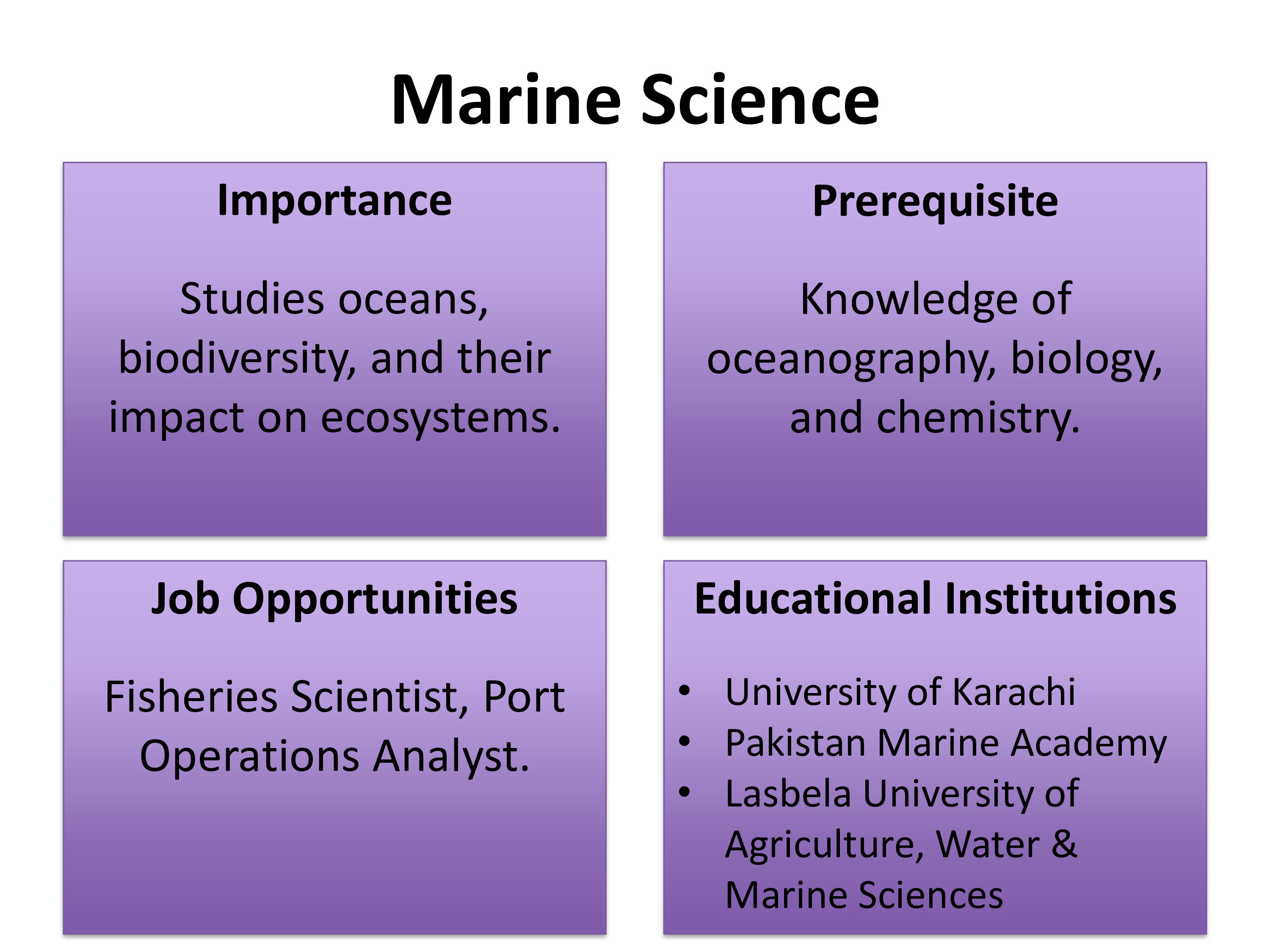
Question: Recent Research Areas & Top International Companies:
Answer: ⬇
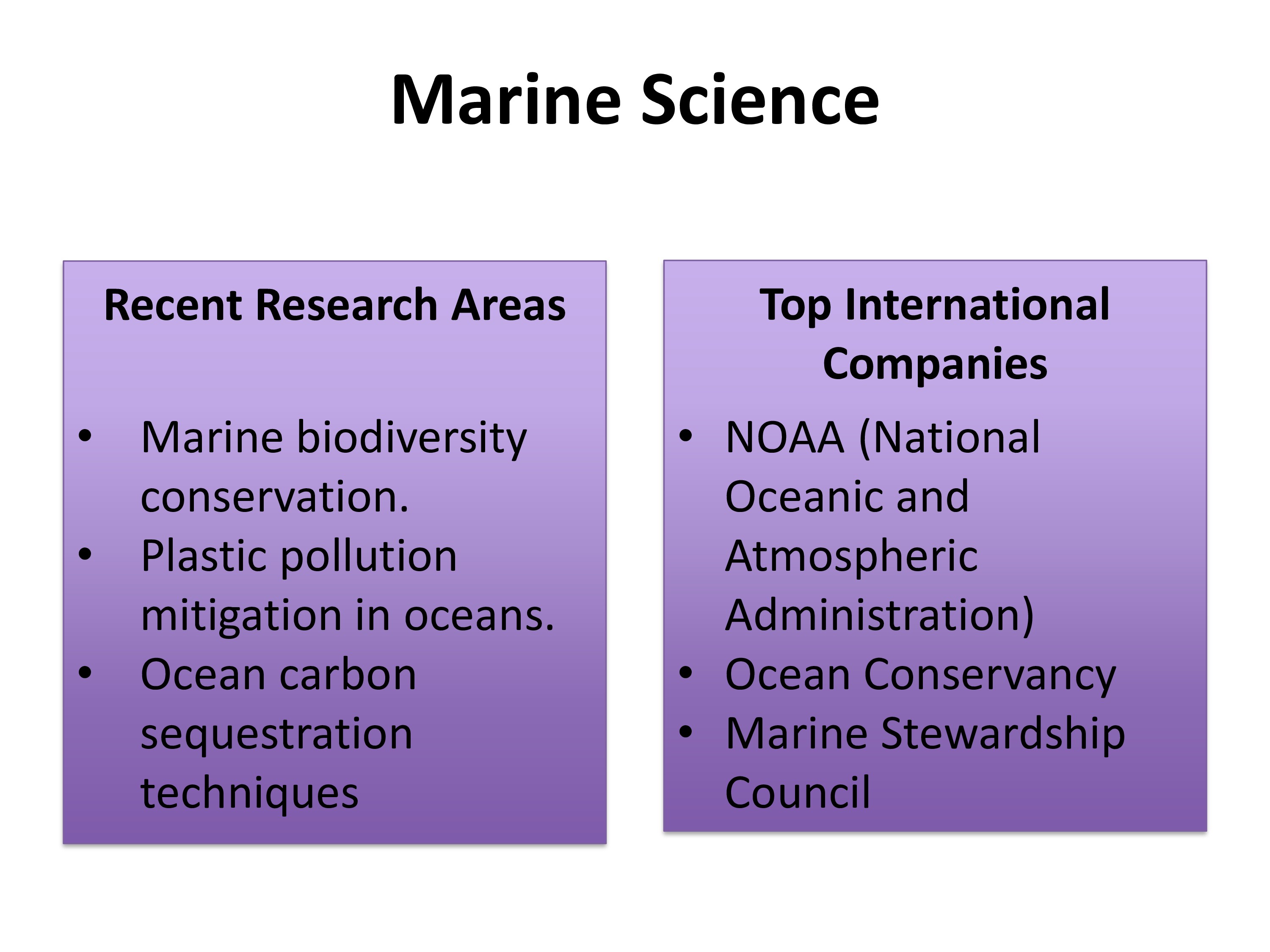
Question: Importance or Significance of the Subject Nationally/Internationally:
Answer: The importance of Arabian Sea with respect to fishing, use of mangrove forest, its potential for offshore hydrocarbon exploration and import/ export of goods through the ports of Karachi and Gwadar, makes Marine Science programme important
Question: Implication in Society and Corporate Sector:
Answer: BS Marine Science is a branch of Earth Science that studies almost everything related with oceans, seas, their coasts and seabed. Marine science is a contemporary field of education having emerged as a hybrid of traditional fields such as biology, chemistry and geology forming biogeochemistry
Question: Subsections of This Field and Their Utilization:
Answer: Marine science education in Pakistan can be divided into following branches 1. Biological Oceanography and Conservation: the study of plants, animals and microbes of the ocean 2. Chemical and Environmental Oceanography: the study of ocean chemistry, the behavior of the chemical elements within the Earth's oceans. 3. Fisheries and Aquaculture: Fisheries may involve the capture of wild fish or raising fish through fish farming or aquaculture. 4. Geological Oceanography: Relates to Ocean geology 5. Mangrovology: the study of mangroves 6. Port Operations and Ship Management: Maritime transport is the shipment of goods (cargo) and people by sea and other waterways. Port operations are a necessary tool to enable maritime trade between trading partners.
Question: Opportunity Areas for Jobs and Business:
Answer: A marine scientist can be employed in federal, state and local government agencies to manage and monitor the use of resources, solve problems and conduct research better than anybody else. They can be employed by private industries such as seafood, fisheries, aquaculture, exploratory marine geology, satellite imagery, and ecological modelling, including environmental agencies and numerous non-government organizations.
Question: Students’ Career Growth and Comparison with Other Fields:
Answer: Depends on the nature of job and chosen sub filed
Question: Financial Attraction and Comparison with Other Fields:
Answer: Depends on the nature of job and chosen sub filed
Question: Research Work and Future Offshoots:
Answer: Being a diverse field, active research is going on in various areas of the field.
Question: Best Educational Institutions:
Answer: • University of Karachi • Pakistan Marine Academy • Lasbela University of Agriculture, Water & Marine Sciences
Question: Scope of job in government, private sector, multinational companies or at international level:
Answer: A marine scientist can be employed in federal, state and local government agencies to manage and monitor the use of resources, solve problems and conduct research better than anybody else. They can be employed by private industries such as seafood, fisheries, aquaculture, exploratory marine geology, satellite imagery, and ecological modelling, including environmental agencies and numerous non-government organizations.
Question: Recommendation Considering Pakistan’s Economic Conditions:
Answer: Yes
Question: Importance, Pre-Requisites, Job Opportunities and Educational Institutes.
Answer: ⬇
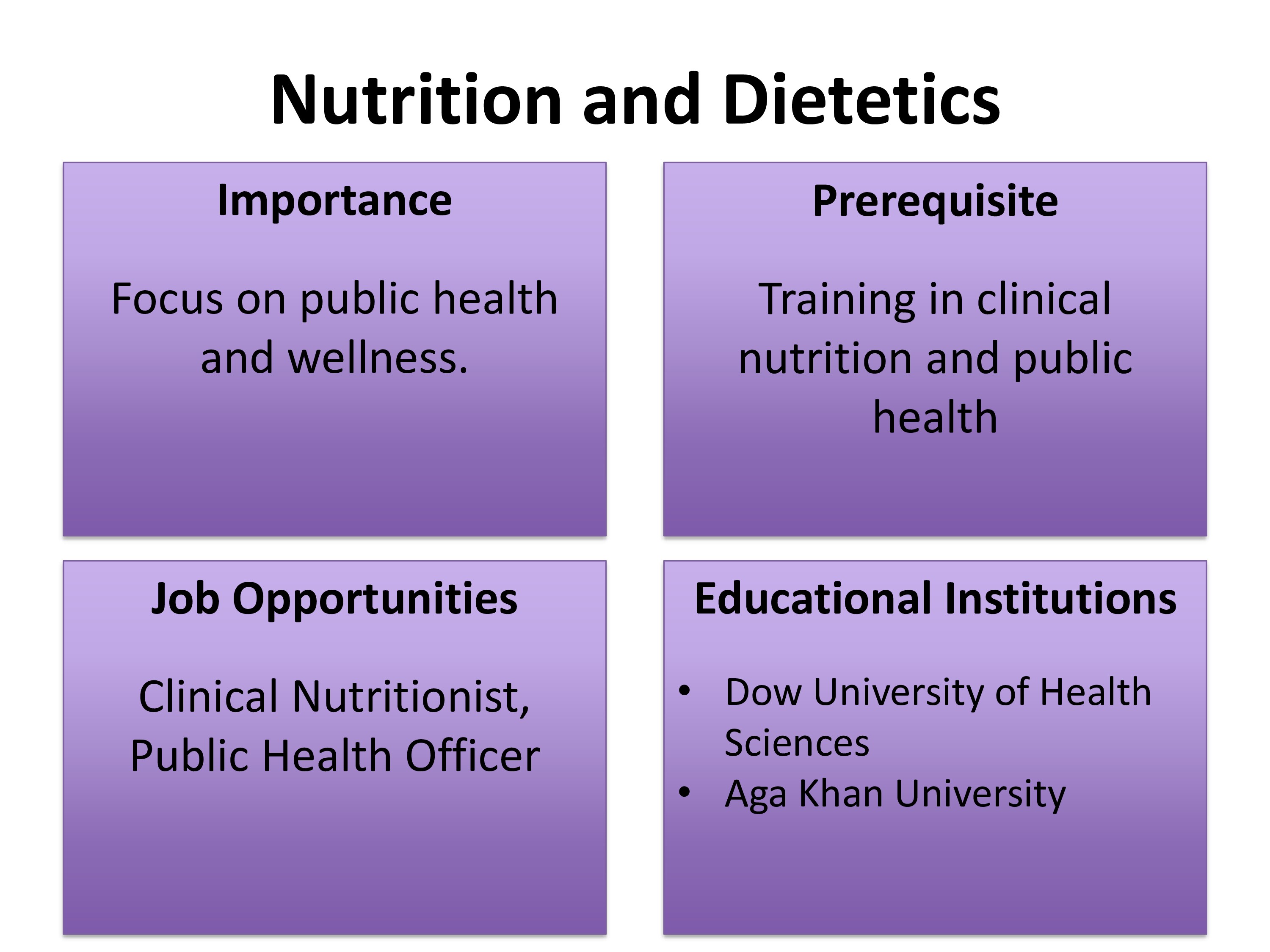
Question: Recent Research Areas & Top International Companies:
Answer: ⬇
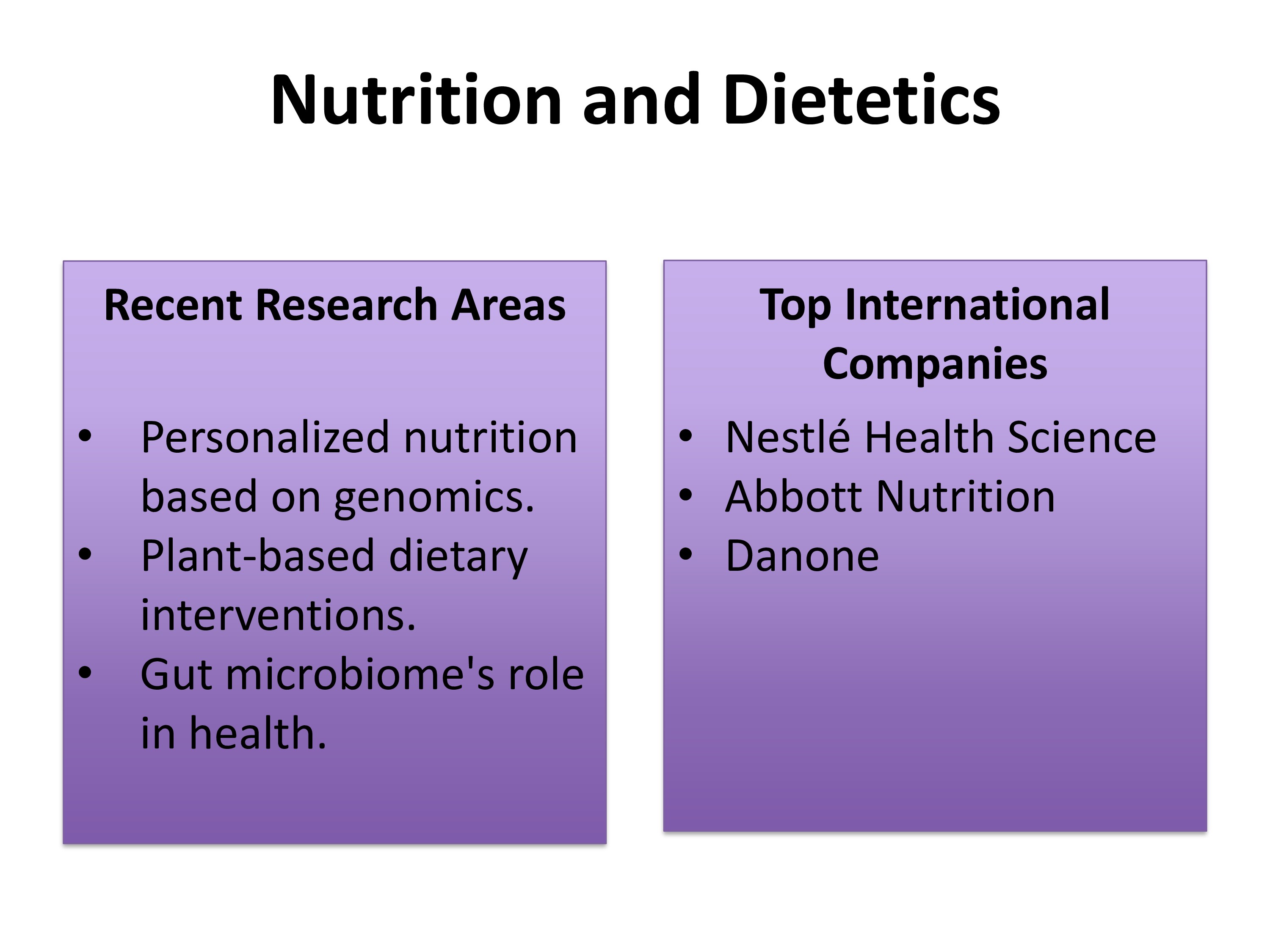
Question: Importance or Significance of the Subject Nationally/Internationally:
Answer: Nationally: Prevents chronic diseases, reduces healthcare costs, enhances quality of life, and boosts economic productivity. Internationally: Supports global health goals, tackles malnutrition, promotes food security, and aids in emergency response.
Question: Implication in Society and Corporate Sector:
Answer: Society: Improves public health, raises awareness, lowers healthcare costs, and supports food security. Corporate: Enhances employee productivity, promotes CSR, drives product innovation, and fosters healthier workplace environments.
Question: Subsections of This Field and Their Utilization:
Answer: Clinical Nutrition – Patient care & recovery support. Community Nutrition – Public health programs & policy development. Sports Nutrition – Enhancing athletic performance. Pediatric Nutrition – Child growth & health management. Geriatric Nutrition – Elderly dietary care. Public Health Nutrition – Health promotion & research. Food Service Management – Institutional meal planning. Nutritional Research – Advancing health sciences. Dietetics Education – Training future professionals.
Question: Opportunity Areas for Jobs and Business:
Answer: Jobs: Clinical dietitian, sports nutritionist, public health worker, researcher, educator, or corporate wellness consultant. Business: Private practice, wellness coaching, meal planning services, health food industry, and tech-based nutrition solutions.
Question: Students’ Career Growth and Comparison with Other Fields:
Answer: Pathways: Clinical, community, sports, research, academia, and entrepreneurship. Advancement: Certifications (RDN, CNS), leadership roles, networking, and continuous education.
Question: Financial Attraction and Comparison with Other Fields:
Answer: Earnings: Clinical dietitians earn $60K-$75K, sports nutritionists can exceed $100K, and private practices may yield six-figure incomes. High-Demand Areas: Personalized nutrition, corporate wellness, and health coaching.
Question: Other Attractions Besides Financial Benefits:
Answer: Impact: Improves public health, supports community wellness, and enhances quality of life. Flexibility: Offers diverse career paths, remote work, and entrepreneurship. Lifelong Learning: Continuous research and innovation in nutrition.
Question: Research Work and Future Offshoots:
Answer: Emerging Areas: Personalized nutrition, gut microbiome, sustainable diets, AI-driven nutrition tech, and functional foods.
Question: Best Educational Institutions:
Answer: Top institutions include University of Agriculture Faisalabad, Gomal University, University of Karachi, and others.
Question: Scope of job in government, private sector, multinational companies or at international level:
Answer: Government: Public health, hospitals, policy-making. Private: Healthcare, food industry, corporate wellness. MNCs: Research, product development, and consulting. International: WHO, UNICEF, NGOs tackling global nutrition challenges.
Question: Recommendation Considering Pakistan’s Economic Conditions:
Answer: Pros: High health awareness, diverse opportunities, and impactful career. Cons: Job competition, resource limitations, and need for continuous learning.
Question: Importance, Pre-Requisites, Job Opportunities and Educational Institutes:
Answer: ⬇
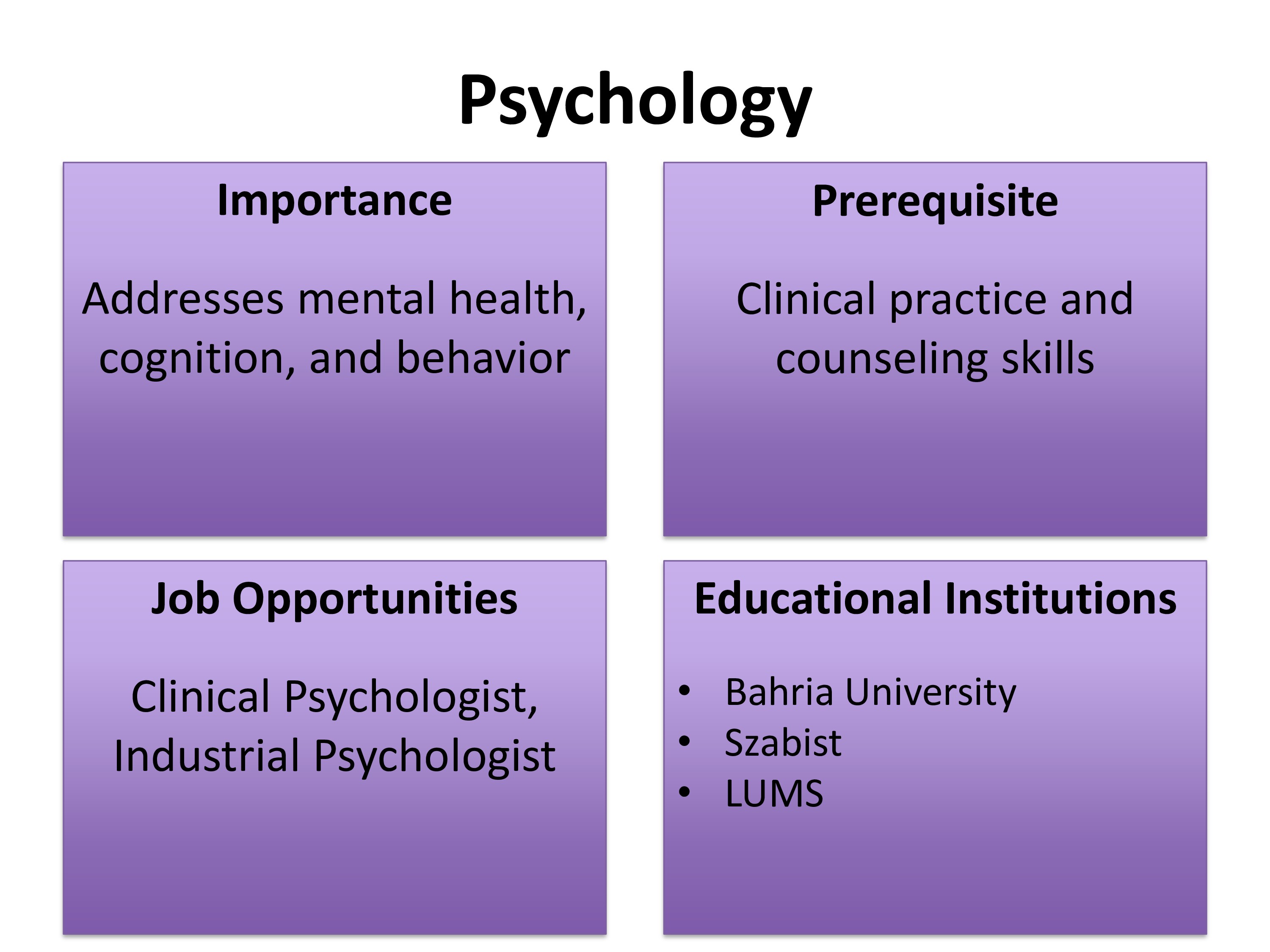
Question: Recent Research Areas & Top International Companies:
Answer: ⬇
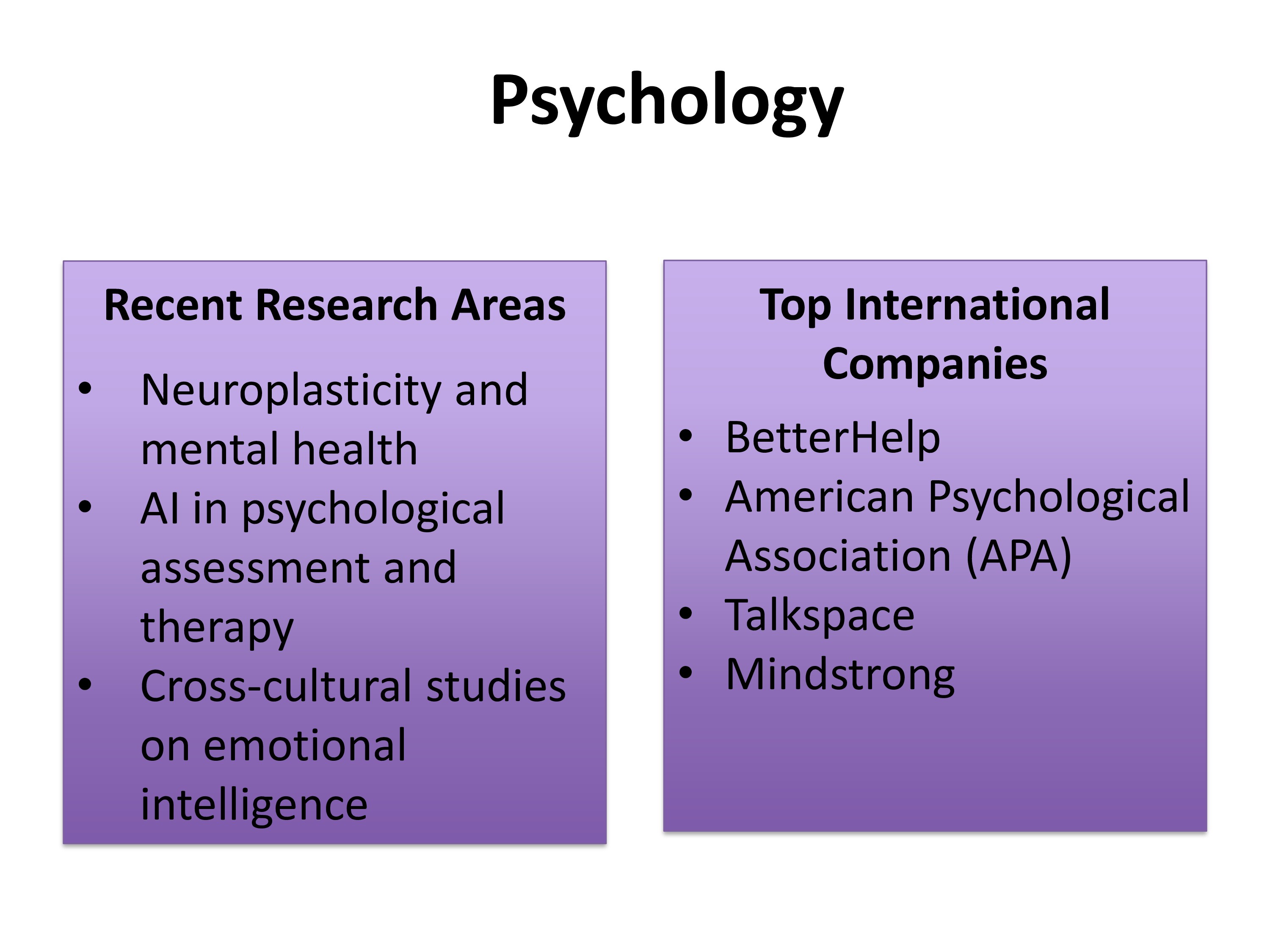
Question: Importance or Significance of the Subject Nationally/Internationally:
Answer: Psychology and all of its’ subfields, being the study of the human mind and behaviour, is an essential field nationally and internationally. Whether it is Sports Psychology, Developmental Psychology, Educational Psychology, I/O Psychology, or any other of the subfields, they provide core insight into the way humans operate and how to best help them in different capacities.
Question: Implication in Society and Corporate Sector:
Answer: At the very essence of it, understanding the way a human being thinks, feels, behaves, what motivates them, what helps them learn better, what conditions enable them to thrive, how to help them adjust to new leadership or other organizational change, how to create the right conditions for a person to thrive from birth onwards, all of this if implemented correctly would mean a happier, healthier, more stable society, corporate sector included. Even with something as basic as human motivation or general wellness – being able to implement this in the corporate sector means better performance, better mood, better work life balance, just to name a few.
Question: Subsections of This Field and Their Utilization:
Answer: ? There are so many different segments and subfields within Psychology! Each comes with its’ own applicability and utilization. Within Pakistan, the ones I have come across the most are Clinical, I/O Psychology, and Social Psychology. All of these have practical implications with a clinical population as well as within the corporate sector, but I/O most closely aligns with corporate.
Question: Opportunity Areas for Jobs and Business:
Answer: It’s so varied, and it really depends on the city and country. I have known people with Psychology degrees get into varied jobs from HR to Marketing and Sales to Mental Health Therapy to teaching to research to business development. Obtaining a bachelors in Psychology means you have a broad understanding of the field, which means you have so many different options when it comes to jobs. And of course, many also go on to start their own businesses.
Question: Students’ Career Growth and Comparison with Other Fields:
Answer: There is a growing respect and understanding of the importance of Psychology in Pakistan – still, career growth can be limited depending on factors such as how advanced your degree is, your network, your clinical and communication skills, your exposure to internships and volunteer experiences etc. As per my experience, there is more growth opportunities in private practice or in the corporate sector. With regards to other fields, traditional fields like Business, Engineering, and Medicine may “look” like they have better growth, but it really does depend on a lot of the factors I’ve mentioned earlier.
Question: Financial Attraction and Comparison with Other Fields:
Answer: This is also dependent on who you work with and where – private practice and MNCs tend to pay better in general, while working in govt facilities or in the Education sector (eg as a researcher or university faculty) may not be as financially rewarding.
Question: Other Attractions Besides Financial Benefits:
Answer: ? Working with people can be so fulfilling. Feeling like you’re making a difference and helping and changing lives can be a deeply satisfying experience. Besides that, in some circles, there is a lot of respect and prestige that may come with the field association as well.
Question: Research Work and Future Offshoots:
Answer: Veryyy limited in Pakistan. Lots of research work that needs to be done, lots of untapped areas (western research is far ahead of us in this regards), but the financial pay off is disappointing, and sometimes even the quality of the research / researcher integrity / journal integrity can be problematic.
Question: Best Educational Institutions:
Answer: I have very limited knowledge in this regards since I have not been in the teaching space for a couple of years now. Typically IOBM/IBA/Szabist/LUMS are recommended.
Question: Scope of job in government, private sector, multinational companies or at international level:
Answer: Dependent on the subfield, and on some factors mentioned earlier such as communication and clinical skills, references, etc. In general, while private sector and MNCs are more accepting and take psych related roles seriously (in comparison to governmental roles), the scope varies. There is more of a scope on an international level, but this again is dependent on varying factors.
Question: Recommendation Considering Pakistan’s Economic Conditions:
Answer: ? If one is passionate about it and can maintain integrity, yes. There is a growing need for more people to get into this space. It is to the youth to pave the way for this field to be taken even more seriously.
Question: Additional Information or Advice for the students pursuing this field:
Answer: Don’t jump into it because it seems easy or simple – think about interests, future prospects, what you want, what you want to achieve, and all the different options available to you. And it is okay to experiment 😊
Question: Importance, Pre-Requisites, Job Opportunities and Educational Institutes:
Answer: ⬇
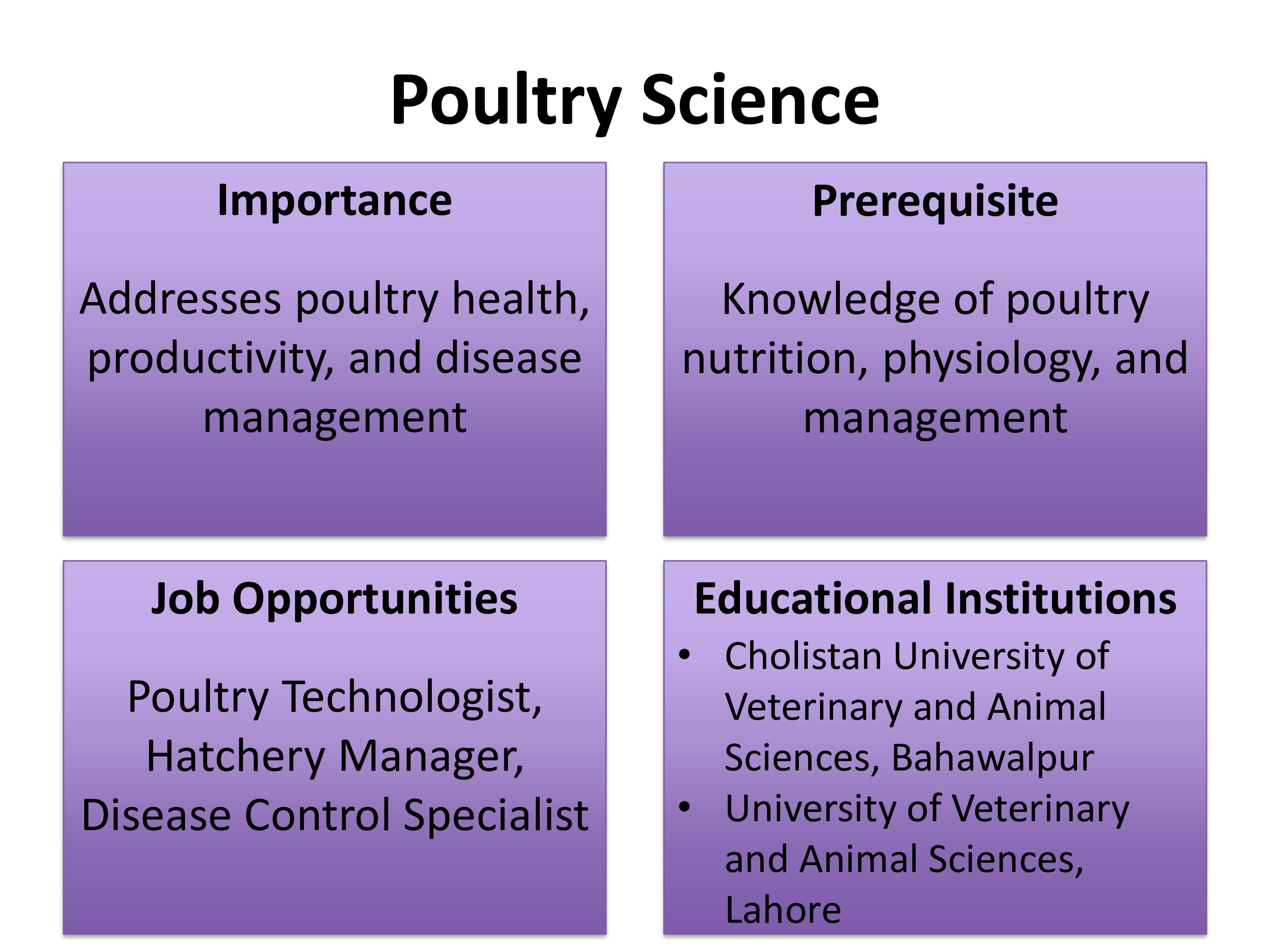
Question: Recent Research Areas & Top International Companies:
Answer: ⬇
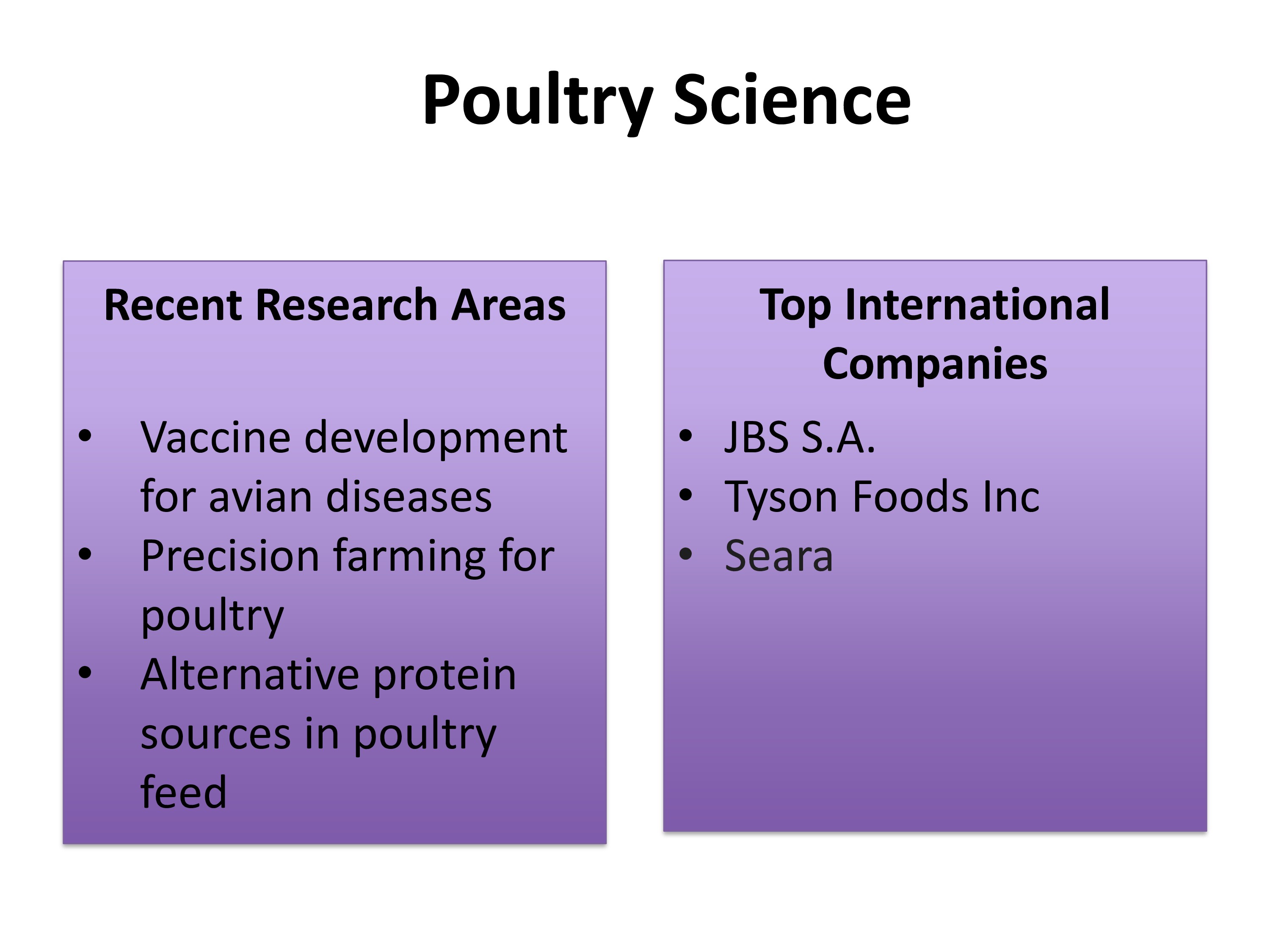
Question: Importance or Significance of the Subject Nationally/Internationally:
Answer: Economic: Poultry farming supports agricultural growth, job creation, and global trade. Nutritional: Poultry provides affordable protein, combating malnutrition. Environmental: Sustainable farming practices reduce ecological impact. Scientific: Innovations improve genetics, nutrition, and disease control. Global Collaboration: Establishes food safety and trade standards. Education: Trains professionals for industry growth.
Question: Implication in Society and Corporate Sector:
Answer: Societal: Ensures food security, job creation, rural development, and animal welfare. Corporate: Enhances productivity, market competitiveness, sustainability, and innovation
Question: Subsections of This Field and Their Utilization:
Answer: Genetics & Breeding: Enhancing growth, disease resistance. Nutrition: Optimizing diets, alternative feed sources. Health & Disease: Biosecurity, vaccines, epidemiology. Physiology & Reproduction: Improving fertility, stress reduction. Housing & Environment: Efficient housing, waste management. Processing & Safety: Quality control, value-added products. Economics & Marketing: Market analysis, supply chain management. Behavior & Welfare: Ethical farming, consumer perception. Biotechnology: Genetic engineering, vaccine development.
Question: Job Opportunities:
Answer: Jobs: Farm management, research, nutrition, quality control, sales, consultancy, education. Businesses: Poultry farming, feed production, breeding, equipment supply, processing, waste recycling.
Question: Opportunity Areas for Jobs and Business:
Answer: Jobs: Farm management, research, nutrition, quality control, sales, consultancy, education. Businesses: Poultry farming, feed production, breeding, equipment supply, processing, waste recycling.
Question: Students’ Career Growth and Comparison with Other Fields:
Answer: Entry-level: Farm technician, feed operator. Mid-level: Nutritionist, manager, QA specialist. Senior-level: Scientist, director, entrepreneur. Academia: Advanced degrees, research, certifications.
Question: Financial Attraction and Comparison with Other Fields:
Answer: Competitive salaries, mid-career growth, stable industry, global market access, entrepreneurial potential.Innovation, sustainability, food security, international collaboration, continuous learning, work-life balance.
Question: Research Work and Future Offshoots:
Answer: Current: Genetics, nutrition, disease control, welfare. Future: CRISPR, AI-driven nutrition, microbiome engineering, lab-grown poultry, climate resilience.
Question: Best Educational Institutions:
Answer: University of Agriculture (Faisalabad), UVAS (Lahore), Sindh Agriculture University, BZU (Multan), Arid Agriculture University, among others.
Question: Scope of job in government, private sector, multinational companies or at international level:
Answer: Government: Policy advisors, research scientists, educators. Private Sector: Farm managers, nutritionists, pharma reps. MNCs: Business development, global supply chain, R&D. International NGOs: Food security specialists, agricultural advisors.
Question: Recommendation Considering Pakistan’s Economic Conditions:
Answer: Poultry farming is a resilient sector with growing demand, business potential, and export opportunities. It supports food security, job creation, and entrepreneurship despite economic challenges.
Question: Importance, Pre-Requisites, Job Opportunities and Educational Institutes:
Answer: ⬇
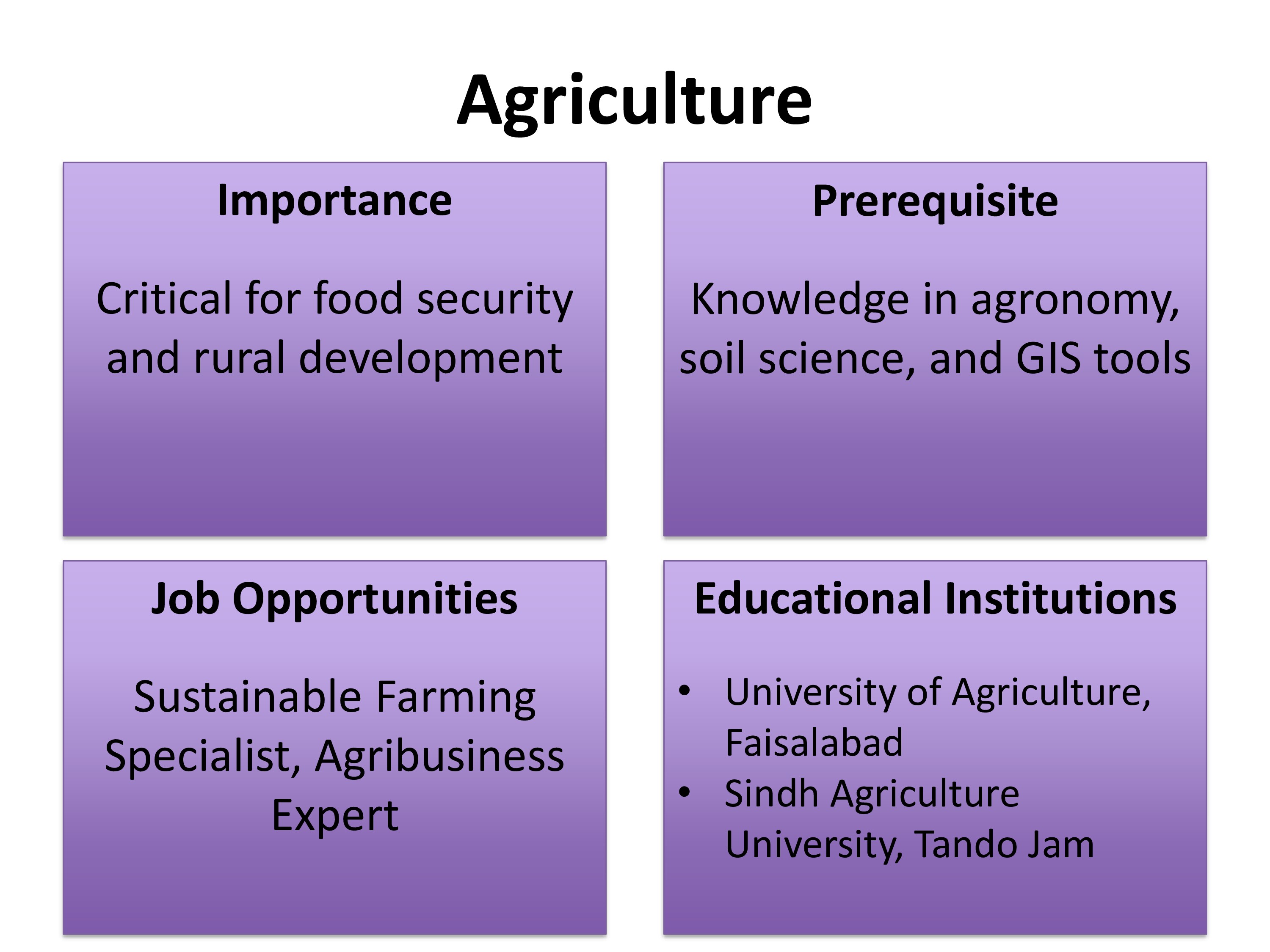
Question: Recent Research Areas & Top International Companies:
Answer: ⬇
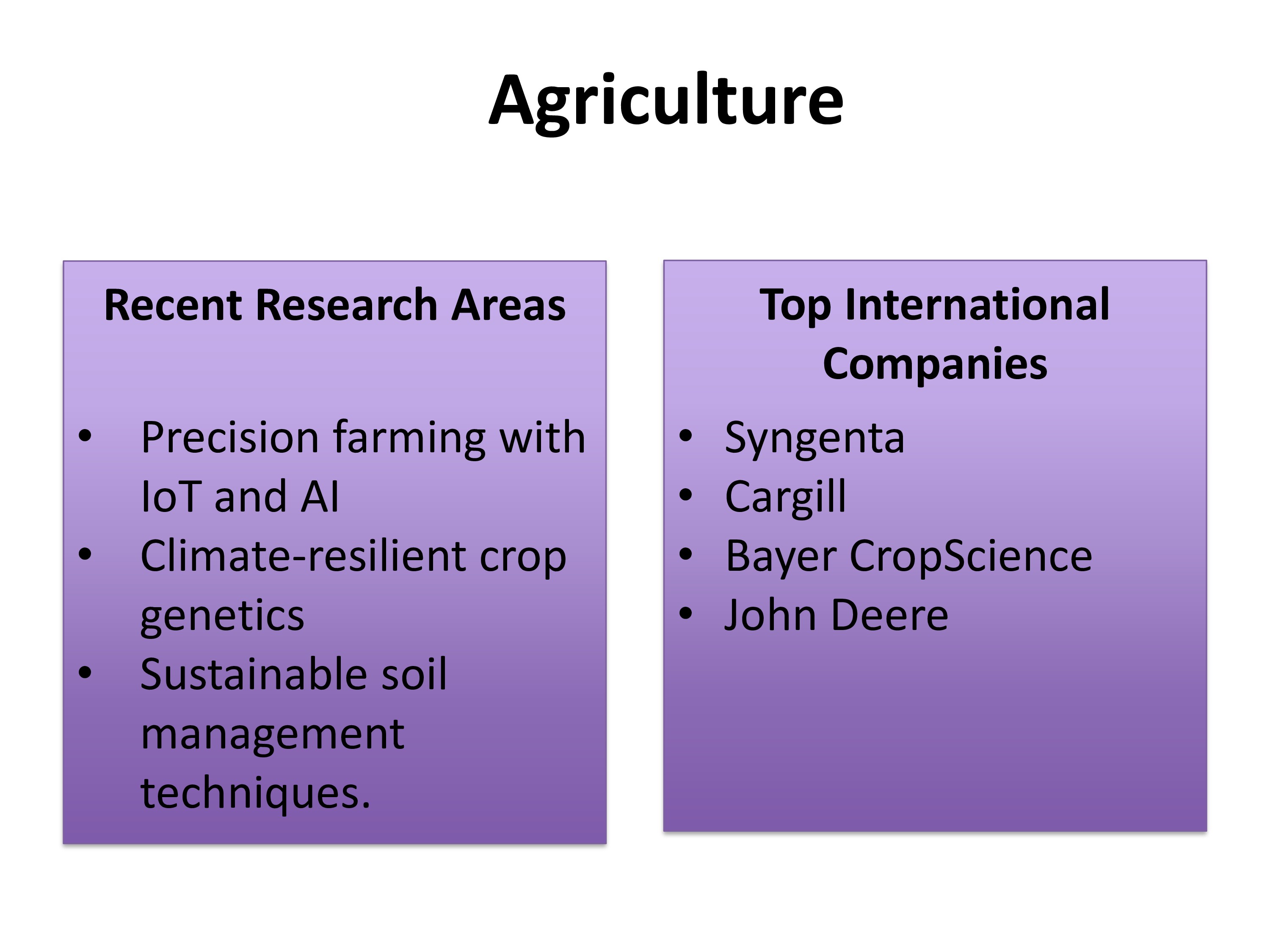
Question: Importance or Significance of the Subject Nationally/Internationally:
Answer: 70% of labour force of Pakistan is engaged in Agriculture and rural economy is entirely dependent on Agriculture.
Question: Implication in Society and Corporate Sector:
Answer: Major portion of Pakistan’s population is rural therefore Agriculture is vital part of our society and corporate sector gets raw material and economy generation is led by Agriculture.
Question: Subsections of This Field and Their Utilization:
Answer: There are many branches of Agriculture, Agronomy being the chief section of the subject which runs the entire system.
Question: Opportunity Areas for Jobs and Business:
Answer: Agriculture is a huge market in Pakistan and despite being import based agro-industry, yet the need for agriculture graduates is on rise by 33% every year in the country. Fuel for tractors, fertilizers, pesticides, seeds, implements, tractors, farm machinery and new subject of solarized agriculture all are done well when education is there.
Question: Students’ Career Growth and Comparison with Other Fields:
Answer: Since I have been engaged since last 18 years, when compared with other fields, Agriculture graduates get easy jobs in market of above-mentioned fields and above all, the business minded agriculture graduates set up paddy business for sale of pesticides, fertilizers, seeds and also finance small scale farmers thus contribute well.
Question: Financial Attraction and Comparison with Other Fields:
Answer: Through micro-level earning, it contributes on large scale. The growth with respect to government jobs is comparatively low but in the private sector, it is ever growing. The HR System by regulatory authorities is not according to international standards and pesticide companies hire at low salary.
Question: Other Attractions Besides Financial Benefits:
Answer: One who is a good agriculturist is very close to nature so Agriculturist or Agriculture graduate comparatively has more sense of sustainable environment and always embark on natural ways of cultivation which could be cost effective.
Question: Research Work and Future Offshoots:
Answer: Unfortunately, Pakistan lacks the research work in this field in public sector organizations but in private sector, the research work is now speeding up without which there is no growth of any organization.
Question: Best Educational Institutions:
Answer: Sindh Agriculture University Tando Jam, Islamia University Bahawalpur, Arid Agriculture University Rawalpindi, University of Agriculture Faisalabad and many universities abroad.
Question: Scope of job in government, private sector, multinational companies or at international level:
Answer: Huge scope in both public and private sector (Provincial Public Service Commisions, Federal Public Service Commissions) FAO, CYMMT, UNDP, UNFPA, ACF, CGIAR and many other.
Question: Recommendation Considering Pakistan’s Economic Conditions:
Answer: Yes sure it is dire need of time specially in Agriculture Mechanical Engineering, Agriculture Robotics, Use of AI in Agriculture, GIS and Remote Sensing in Agriculture are latest courses to be considered on high rank subjects with better salaries when hired.
Question: Importance, Pre-Requisites, Job Opportunities and Educational Institutes:
Answer: ⬇
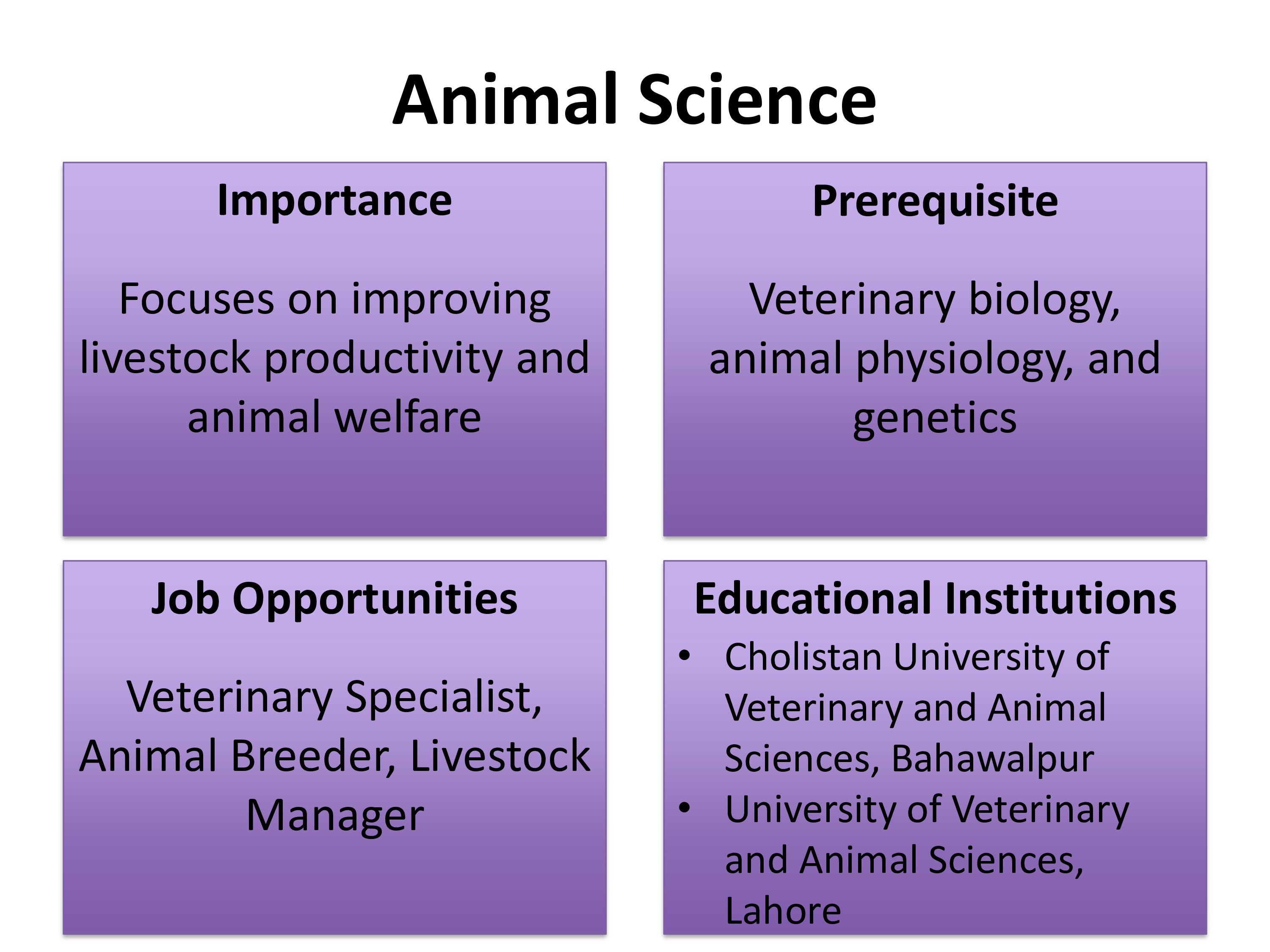
Question: Recent Research Areas & Top International Companies:
Answer: ⬇
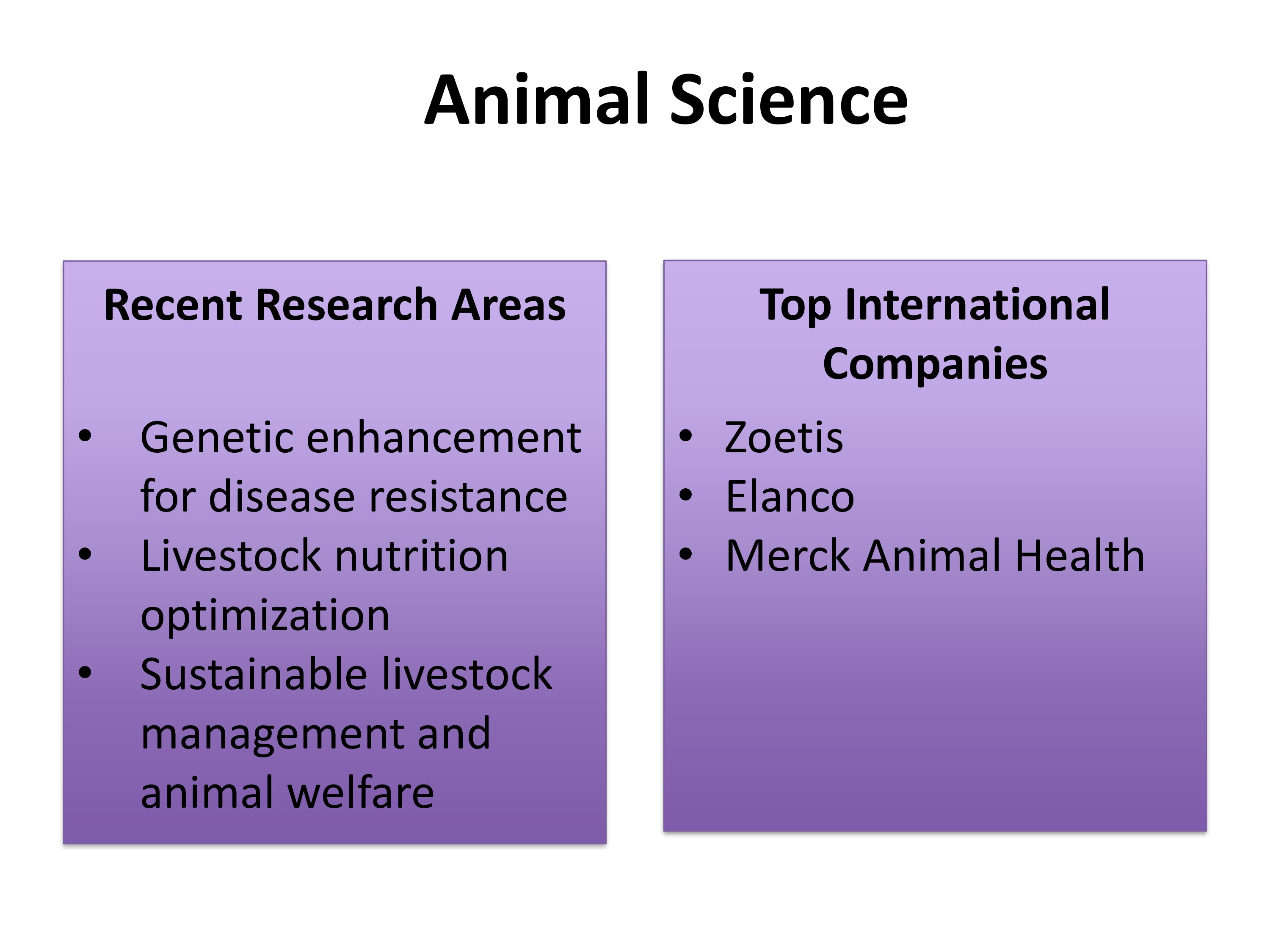
Question: Importance or Significance of the Subject Nationally/Internationally:
Answer: Animal Science is vital for food security, economic growth, environmental sustainability, public health, and biodiversity. It enhances livestock productivity, supports farmers, boosts economies, ensures eco-friendly practices, prevents zoonotic diseases, conserves genetic resources, and advances research.
Question: Implication in Society and Corporate Sector:
Answer: Food Security: Ensures a steady supply of animal-based food. Economic Growth: Supports rural livelihoods and agribusiness. Environmental Sustainability: Reduces pollution and promotes efficient resource use. Public Health: Enhances food safety and disease control. Innovation & Research: Develops new techniques in genetics, nutrition, and biotechnology.
Question: Subsections of This Field and Their Utilization:
Answer: Animal Nutrition: Optimizes diets for growth and health. Genetics & Breeding: Improves livestock traits and productivity. Animal Welfare: Studies behavior and ethical treatment. Livestock Management: Enhances farm efficiency. Biotechnology: Genetic engineering and disease resistance. Poultry Science: Focuses on poultry nutrition and farming.
Question: Opportunity Areas for Jobs and Business:
Answer: Livestock Farming: Farm owners, herd managers. Nutrition & Feed Industry: Animal nutritionists, feed manufacturers. Research & Development: Geneticists, biotechnologists. Education & Extension Services: Professors, trainers. Environmental & Policy Roles: Conservationists, policymakers.
Question: Students’ Career Growth and Comparison with Other Fields:
Answer: Education & Specialization: Bachelor's, Master's, or Ph.D. Professional Development: Certifications, workshops, research. Job Prospects: Various roles in agriculture, research, education, and business. Leadership & Innovation: Management, entrepreneurship, global impact.
Question: Financial Attraction and Comparison with Other Fields:
Answer: Varies by job role, education, and location. Higher earnings with specialization (nutrition, genetics, veterinary). Entrepreneurship offers additional opportunities. Industry demand influences salary potential.
Question: Other Attractions Besides Financial Benefits:
Answer: Passion for animals and food security. Diverse career opportunities. Scientific innovation and global impact. Community engagement and personal fulfillment.
Question: Research Work and Future Offshoots:
Answer: Nutrition: Sustainable feeding strategies. Genetics: Selective breeding and gene editing. Animal Welfare: Stress reduction and behavior studies. Biotechnology: Disease-resistant livestock. Sustainability: Low-emission farming practices.
Question: Best Educational Institutions:
Answer: University of Agriculture, Faisalabad. Cholistan University, Bahawalpur. PMAS Arid Agriculture University, Rawalpindi. Gomal University, D.I. Khan.
Question: Scope of job in government, private sector, multinational companies or at international level:
Answer: Government: Policy, regulatory roles. Private: Farming, agribusiness, research. MNCs & International: Food industries, global research centers.
Question: Recommendation Considering Pakistan’s Economic Conditions:
Answer: Strong demand due to agriculture-based economy. Growth in dairy, poultry, and meat sectors. Job opportunities in research, agribusiness, and policymaking.
Question: Additional Information or Advice for the students pursuing this field:
Answer: Dairy Sciences additionally covers 90% of Animal Science but focuses on dairy animals. Offered in limited universities. Careers align with Animal Science roles, so it can be merged with it in scholarships.
Question: Importance, Pre-Requisites, Job Opportunities and Educational Institutes:
Answer: ⬇
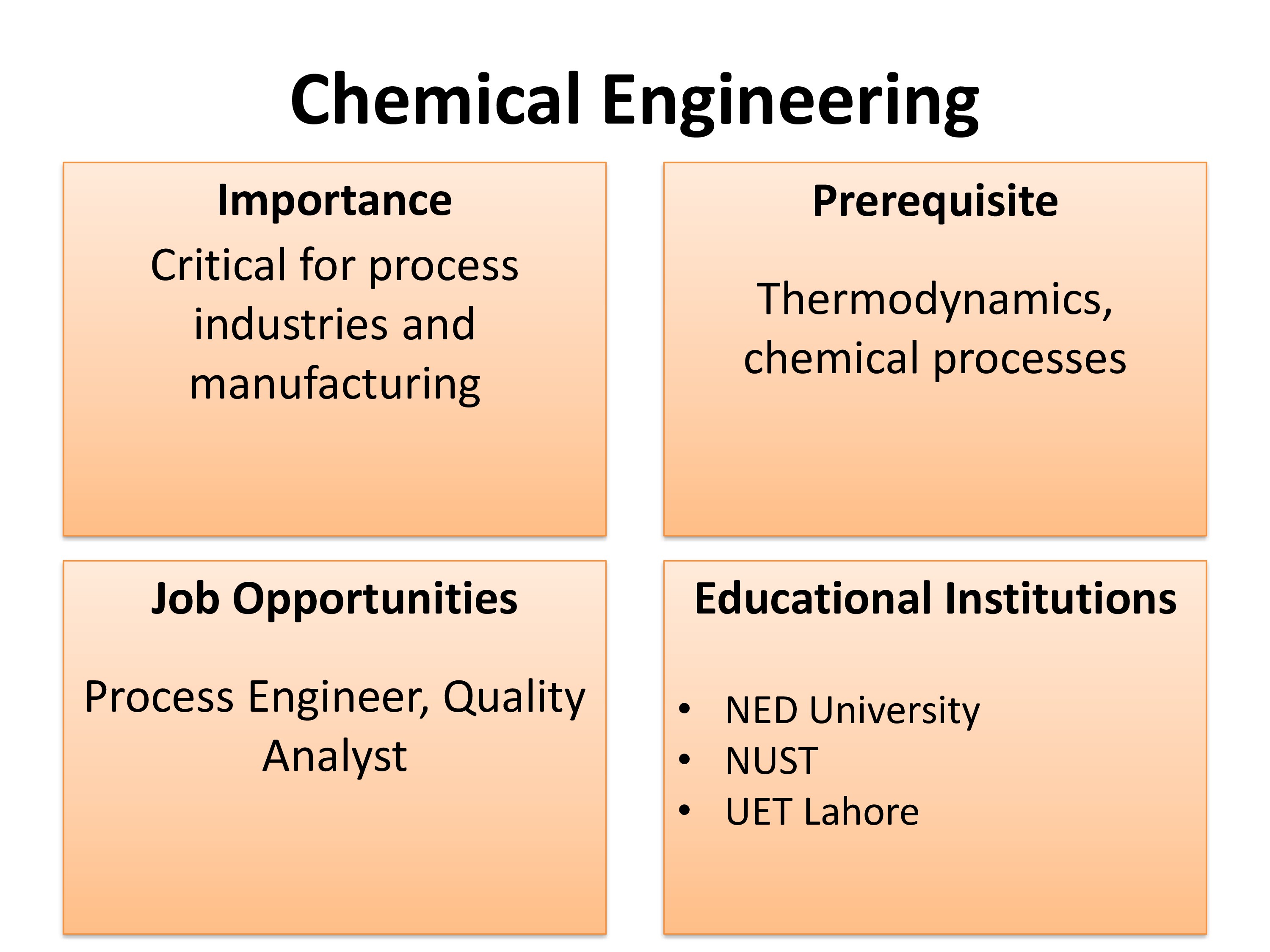
Question: Recent Research Areas & Top International Companies:
Answer: ⬇
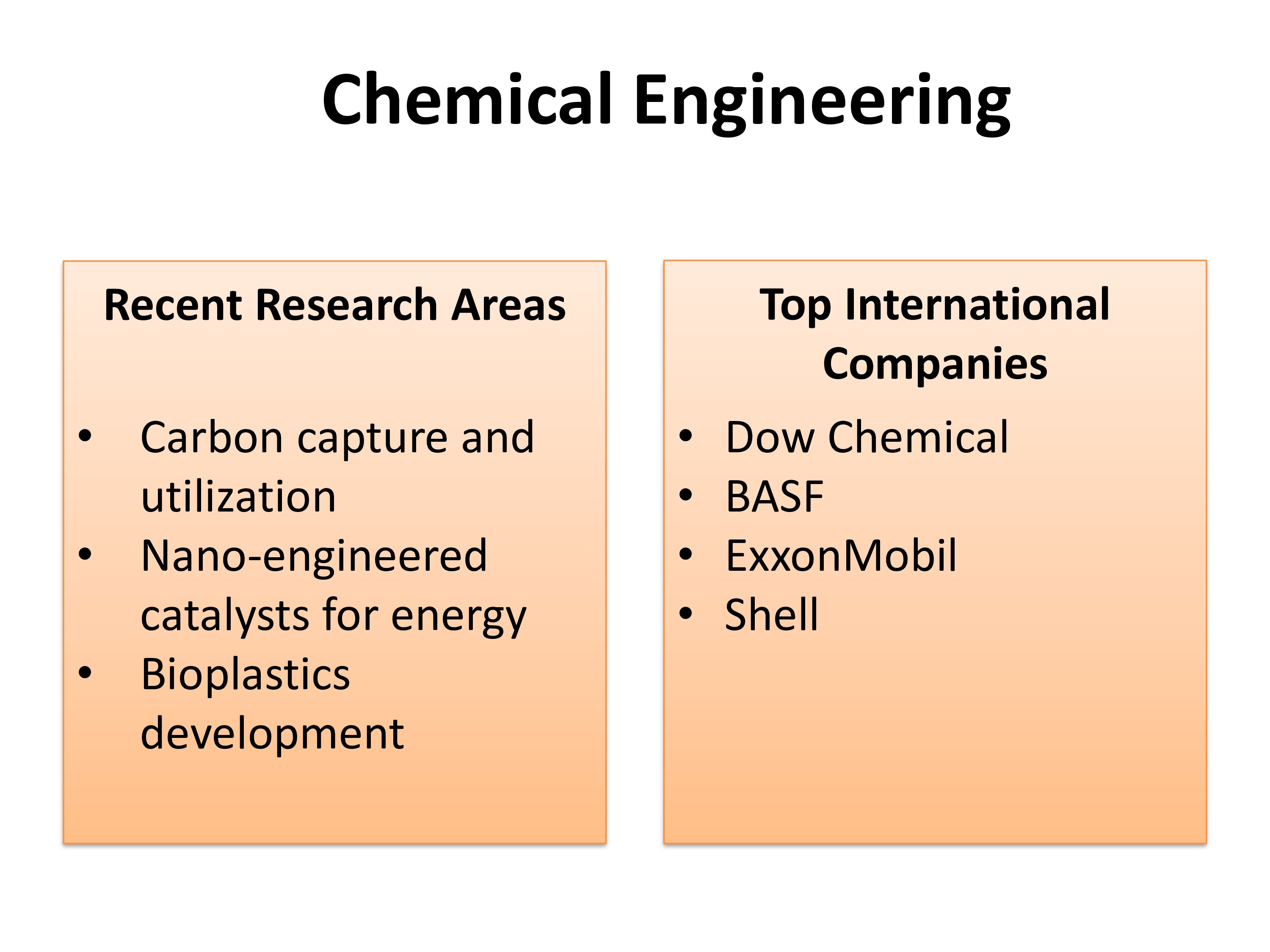
Question: Importance or Significance of the Subject Nationally/Internationally:
Answer: Chemical Engineering is a crucial discipline with significant importance both nationally and internationally. It plays a vital role in various industries and contributes to solving global challenges related to energy, healthcare, environmental protection, and material development. The importance of the subject is explained below: 1. Industrial Development: Chemical engineering is essential for the development and optimization of processes used in various industries, including petrochemicals, pharmaceuticals, food processing, and materials manufacturing. It contributes to the efficient production of goods and services, which drives economic growth. 2. Energy Production and Sustainability: Chemical engineers are involved in the development of renewable energy sources, energy storage systems, and the improvement of traditional energy production methods. Their work is vital in addressing global energy challenges and reducing dependence on fossil fuels. 3. Environmental Protection: Chemical engineers develop technologies and processes to minimize environmental impact, manage waste, and reduce emissions. Their work is critical in combating pollution, managing industrial waste, and developing sustainable practices. 4. Healthcare and Pharmaceuticals: In the healthcare sector, chemical engineers design and develop processes for the production of pharmaceuticals, medical devices, and diagnostic tools. Their contributions are essential for improving public health and advancing medical technology. 5. Materials Science and Innovation: Chemical engineers contribute to the development of new materials with improved properties, such as polymers, nanomaterials, and composites. These innovations are used in a wide range of applications, from electronics to aerospace. 6. Food and Beverage Industry: Chemical engineering plays a key role in the food and beverage industry by optimizing processes for food production, preservation, and safety. It ensures the availability of high-quality, safe, and nutritious food products. 7. Global Challenges: Chemical engineers address global challenges such as climate change, resource scarcity, and sustainable development. Their expertise is crucial in developing technologies that support a sustainable future.
Question: Implication in Society and Corporate Sector:
Answer: Chemical engineering has profound implications for society and the corporate sector and influencing various aspects of industrial production, economic development, environmental sustainability, public health, and innovation. Collaboration between stakeholders across sectors is essential to address global challenges and maximize the positive impact of chemical engineering on society and business. The implications of the subject are explained below: 1. Industrial Efficiency and Innovation: • Society: Chemical engineering improves the efficiency of industrial processes, leading to lower production costs and higher-quality products. This benefits consumers by providing access to affordable and innovative goods. • Corporate Sector: Companies rely on chemical engineering to develop new products, optimize processes, and reduce costs. Investment in research and development (R&D) leads to innovative solutions and competitive advantages in the market. 2. Environmental Sustainability: • Society: Chemical engineers develop sustainable practices and technologies that reduce environmental impact, conserve resources, and mitigate pollution. This contributes to a cleaner and healthier environment for future generations. • Corporate Sector: Companies adopt sustainable practices to meet regulatory requirements, enhance their corporate social responsibility (CSR) profiles, and respond to consumer demand for environmentally friendly products. This can lead to cost savings and improved brand reputation. 3. Healthcare and Public Safety: • Society: Chemical engineering contributes to the development of safe and effective pharmaceuticals, medical devices, and diagnostic tools. This improves public health and safety, leading to better quality of life. • Corporate Sector: Pharmaceutical companies and healthcare providers depend on chemical engineering to design efficient production processes, ensure product safety, and comply with regulatory standards. This is critical for maintaining trust and profitability in the healthcare industry. 4. Energy Production and Management: • Society: Chemical engineers develop technologies for renewable energy, energy storage, and efficient energy production. This supports the transition to a more sustainable energy system, reducing reliance on fossil fuels and mitigating climate change. • Corporate Sector: Energy companies invest in chemical engineering to develop new energy solutions, optimize production, and reduce costs. This is essential for staying competitive in the evolving energy landscape. 5. Innovation and Research: • Society: Chemical engineering drives innovation through research and development, leading to advancements in materials science, energy production, environmental protection, and healthcare. • Corporate Sector: Companies invest in R&D to improve their products, processes, and services. Collaboration with academic institutions, research organizations, and government agencies allows businesses to leverage scientific advancements for growth and innovation.
Question: Subsections of This Field and Their Utilization:
Answer: Chemical Engineering encompasses various sub-disciplines, each focusing on different aspects of chemical processes, materials, and technologies. Here are the key sub-sections of Chemical Engineering: 1. Process Engineering: o Focuses on the design, optimization, and operation of chemical processes used in manufacturing industries. Utilized in petrochemicals, food processing, pharmaceuticals, and materials production. 2. Materials Engineering: o Involves the development and characterization of new materials, such as polymers, ceramics, and nanomaterials. Applied in industries like electronics, aerospace, automotive, and construction. 3. Biochemical Engineering: o Combines chemical engineering with biological processes to develop products such as pharmaceuticals, biofuels, and food additives. Essential in the biotechnology and healthcare industries. 4. Environmental Engineering: o Focuses on developing processes and technologies to reduce environmental impact, manage waste, and ensure compliance with environmental regulations. Used in pollution control, waste management, and sustainable development. 5. Energy Engineering: o Involves the development and optimization of energy production and storage systems, including renewable energy sources, batteries, and fuel cells. Key in the energy sector and sustainability initiatives. 6. Thermodynamics and Reaction Engineering: o Studies the principles of energy and chemical reactions to optimize industrial processes. Applied in the design and operation of reactors, separation processes, and energy systems. 7. Nanotechnology: o Focuses on the manipulation of materials at the nanoscale to develop new products with unique properties. Utilized in electronics, medicine, and advanced materials development. 8. Safety and Risk Management: o Involves the assessment and management of risks associated with chemical processes to ensure safety in industrial operations. Crucial in industries like chemicals, oil and gas, and pharmaceuticals.
Question: Opportunity Areas for Jobs and Business:
Answer: A degree in Chemical Engineering opens up a wide range of job and business opportunities across various sectors. Here are some key opportunity areas: 1. Process Engineering: o Jobs: Process engineer, production manager, operations manager. o Business: Consulting firms specializing in process optimization, custom chemical production. 2. Materials Science: o Jobs: Materials engineer, research scientist, quality control specialist. o Business: Startups focused on advanced materials, manufacturing companies producing specialized materials. 3. Biotechnology and Pharmaceuticals: o Jobs: Bioprocess engineer, pharmaceutical engineer, R&D scientist. o Business: Biotechnology firms, pharmaceutical manufacturing, contract research organizations (CROs). 4. Environmental Engineering: o Jobs: Environmental engineer, sustainability consultant, waste management specialist. o Business: Environmental consulting, waste treatment facilities, renewable energy projects. 5. Energy Sector: o Jobs: Energy engineer, renewable energy specialist, project manager. o Business: Renewable energy startups, consulting firms for energy efficiency, energy storage solutions. 6. Research and Development (R&D): o Jobs: R&D engineer, research scientist, innovation manager. o Business: Research institutions, innovation hubs, product development firms. 7. Safety and Risk Management: o Jobs: Safety engineer, risk management consultant, compliance officer. o Business: Safety consulting, risk assessment services, training and certification programs.
Question: Students’ Career Growth and Comparison with Other Fields:
Answer: 1. Entry-Level Positions: Graduates typically start in roles such as process engineer, chemical engineer, or quality control analyst. These roles provide foundational experience in industrial operations, process optimization, and safety management. 2. Mid-Level Positions: With experience, professionals can move into senior engineering roles, project management, or specialized fields such as materials science, biotechnology, or environmental engineering. This stage often involves leadership responsibilities and more complex problem-solving. 3. Advanced Positions: Senior professionals may advance to roles such as technical director, R&D manager, or chief engineer. These roles involve strategic decision-making, overseeing large-scale projects, and leading innovation efforts. 4. Entrepreneurship: Chemical engineers with industry experience may choose to start their own businesses, focusing on process consulting, materials development, or environmental solutions. Entrepreneurship offers the potential for significant financial rewards and personal fulfillment. 5. Global Opportunities: Chemical engineers are in demand worldwide, with opportunities in developed and emerging markets. International experience can lead to higher salaries and exposure to cutting-edge technologies and practices.
Question: Financial Attraction and Comparison with Other Fields:
Answer: • Chemical Engineering vs. Mechanical Engineering: While both fields offer strong career prospects, chemical engineering often provides more opportunities in specialized industries such as pharmaceuticals, biotechnology, and materials science. • Chemical Engineering vs. Civil Engineering: Chemical engineers typically work in industrial settings with a focus on process optimization and materials, whereas civil engineers focus on infrastructure. Chemical engineering may offer more opportunities in research and development. • Chemical Engineering vs. Computer Science: Computer science professionals are in high demand in the tech industry, often with higher starting salaries. However, chemical engineers can earn competitive salaries, especially in specialized sectors like energy, pharmaceuticals, and materials.
Question: Other Attractions Besides Financial Benefits:
Answer: Emerging Trends: 1. Sustainable and Green Engineering: Increasing focus on developing environmentally friendly processes, renewable energy, and sustainable materials. This trend is driven by global initiatives to combat climate change and reduce environmental impact. 2. Biotechnology and Biochemical Engineering: Growth in the biotechnology sector, including the development of biopharmaceuticals, biofuels, and bioprocessing technologies. Chemical engineers are at the forefront of these advancements. 3. Nanotechnology: The application of nanotechnology in materials science, medicine, and electronics is expanding, offering new opportunities for innovation in chemical engineering. 4. Digitalization and Industry 4.0: Integration of digital technologies, such as artificial intelligence (AI), big data, and the Internet of Things (IoT), into chemical engineering processes. This trend is transforming how industries operate, enhancing efficiency and innovation. 5. Circular Economy: Growing emphasis on recycling, waste reduction, and resource recovery. Chemical engineers are developing processes that support a circular economy, minimizing waste and promoting sustainability. 6. Advanced Materials Development: Innovation in advanced materials, including composites, smart materials, and biomaterials. These developments have applications in sectors such as aerospace, automotive, and healthcare. Future Prospects: • Increased Demand for Chemical Engineers: As industries prioritizes sustainability, energy efficiency, and innovation, the demand for chemical engineers is expected to grow. • Global Opportunities: Chemical engineers will have opportunities to work on international projects, particularly in regions focusing on industrial growth and sustainable development. • Research and Innovation: Chemical engineering will continue to be a key driver of research and innovation, with opportunities in emerging fields such as synthetic biology, quantum materials, and personalized medicine. • Entrepreneurship and Startups: The rise of startups focused on chemical engineering solutions, particularly in green technologies and advanced materials, will create new business opportunities for chemical engineers. • Collaboration Across Disciplines: Chemical engineers will increasingly collaborate with professionals from other fields, such as computer science, biology, and environmental science, to develop integrated solutions to complex challenges.
Question: Research Work and Future Offshoots:
Answer: Research in chemical engineering encompasses a diverse array of topics aimed at advancing the field and addressing contemporary challenges. Here are key areas of research and their potential developments in the near future: 1. Sustainable and Green Technologies: o Development of Eco-Friendly Processes: Research focuses on creating processes that minimize environmental impact, reduce waste, and utilize renewable resources. This includes advancements in green chemistry and sustainable manufacturing practices. o Energy Efficiency: Innovations in energy systems, such as improved catalysts and process intensification, aim to enhance energy efficiency in industrial processes. 2. Advanced Materials and Nanotechnology: o Smart Materials: Development of materials with tailored properties for specific applications, such as responsive materials that change their behavior in response to environmental stimuli. o Nanomaterials: Research into nanoscale materials and their applications in fields like electronics, medicine, and environmental remediation. This includes the design and synthesis of nanoparticles with unique properties. 3. Biochemical Engineering: o Bioprocess Optimization: Enhancement of processes involving biological systems, such as fermentation and enzyme catalysis, to improve yield and efficiency in producing pharmaceuticals, biofuels, and biochemicals. o Synthetic Biology: Engineering of biological systems to produce valuable compounds or to perform new functions, bridging chemical engineering with biotechnology. 4. Process Safety and Risk Management: o Advanced Safety Protocols: Research into improved safety measures and risk assessment techniques to prevent industrial accidents and ensure the safe operation of chemical processes. o Crisis Management: Development of strategies for managing and mitigating the impact of chemical spills, explosions, and other emergencies. 5. Computational and Data-Driven Engineering: o Process Simulation: Use of computational models and simulations to design, optimize, and control chemical processes, leading to more efficient and cost-effective operations. o Machine Learning and AI: Integration of artificial intelligence and machine learning to analyze data, predict outcomes, and enhance process control and optimization. 6. Water and Wastewater Treatment: o Advanced Purification Technologies: Development of new methods for treating and recycling water, focusing on removing contaminants and recovering valuable resources from wastewater. o Desalination Innovations: Research into more energy-efficient and cost-effective desalination techniques to address global water scarcity issues. 7. Pharmaceutical and Healthcare Engineering: o Drug Delivery Systems: Design of advanced drug delivery mechanisms to improve the efficacy and targeting of pharmaceuticals. o Vaccine Production: Innovations in the production and distribution of vaccines, including new approaches to combating infectious diseases. In the near future, these research areas are expected to drive significant advancements in chemical engineering, addressing global challenges such as sustainability, health, and resource management. As technology progresses and new challenges arise, chemical engineers will continue to play a crucial role in developing innovative solutions and shaping the future of the field.
Question: Best Educational Institutions:
Answer: a. University of Engineering and Technology (UET), Lahore b. National University of Sciences and Technology (NUST), Islamabad c. NED University of Engineering and Technology, Karachi d. Karachi University, Karachi e. University of the Punjab, Lahore. f. Dawood University of Engineering and Technology, Karachi. g. COMSATS Institute of Information Technology, Islamabad h. Mehran University of Engineering and Technology, Jamshoro i. Peshawar University j. Baluchistan University of Information Technology, Engineering and Management Sciences (BUITEMS).
Question: Scope of job in government, private sector, multinational companies or at international level:
Answer: Government Sector • Regulatory Agencies: Chemical engineers may work with agencies responsible for enforcing regulations related to chemical safety, environmental protection, and industrial processes. Examples include the Environmental Protection Agency (EPA) or similar bodies in different countries. • Research Institutions: Opportunities exist in government-funded research labs focusing on innovation, sustainability, and public health. • Public Policy: Chemical engineers can contribute to policy development related to industrial standards, safety regulations, and environmental laws. Private Sector • Manufacturing: Chemical engineers play key roles in optimizing and managing processes for producing chemicals, materials, and consumer products. They work in industries like petrochemicals, textiles, and food and beverages. • Energy: In the energy sector, engineers work on improving processes for oil and gas extraction, refining, and the development of renewable energy sources such as biofuels and solar energy technologies. • Pharmaceuticals: Chemical engineers are involved in drug development, production processes, and quality control in pharmaceutical companies. Multinational Companies • Global Operations: Chemical engineers in multinational companies work on international projects, oversee global production facilities, and implement standardized processes across different countries. • Innovation and R&D: Multinational firms often have dedicated research and development centers where chemical engineers work on cutting-edge technologies and new product developments. • Consulting and Project Management: Engineers may provide consulting services for various global projects, manage large-scale industrial setups, and offer expertise in process optimization and efficiency improvements. International Level • Global Research Institutions: Opportunities exist at international research organizations such as the International Atomic Energy Agency (IAEA) or organizations focusing on global challenges like climate change and sustainability. • International Development: Chemical engineers can work with international agencies or non-governmental organizations (NGOs) to address global issues such as access to clean water, pollution control, and sustainable development.
Question: Recommendation Considering Pakistan’s Economic Conditions:
Answer: Given my experience and the current economic conditions in Pakistan, I would recommend pursuing a Chemical Engineering course. The field of chemical engineering remains vital across various industries such as manufacturing, pharmaceuticals, and energy. Despite economic fluctuations, there is a steady demand for chemical engineers due to the need for innovation and efficiency in these sectors. The improving industrial landscape and government investments in infrastructure also create opportunities for growth. Additionally, chemical engineering provides a robust foundation in problem-solving and analytical skills, which are highly valued in the job market. While there may be challenges, the versatility of the degree, along with the potential for competitive salaries and career advancement, makes it a worthwhile pursuit for those interested in this dynamic field.
Question: Additional Information or Advice for the students pursuing this field:
Answer: Stay Updated with Industry Trends: Chemical engineering is a rapidly evolving field with advancements in technology and processes. Regularly read industry journals, attend seminars, and participate in professional organizations to stay informed about the latest trends and innovations. Gain Practical Experience: Hands-on experience is crucial. Pursue internships, co-op programs, and research projects during your studies. Practical experience not only enhances your skills but also makes you more attractive to potential employers. Develop Strong Analytical Skills: Chemical engineering involves solving complex problems using quantitative methods. Strengthen your skills in mathematics, data analysis, and critical thinking to effectively tackle challenges in this field. Embrace Interdisciplinary Learning: Chemical engineering often intersects with fields such as biotechnology, environmental science, and materials science. Take courses or engage in projects related to these areas to broaden your knowledge and enhance your versatility. Build a Strong Network: Networking is vital in any profession. Connect with professors, industry professionals, and alumni. Attend industry conferences and workshops to build relationships that could lead to job opportunities and career advancement. Work on Communication Skills: Effective communication is crucial in chemical engineering. Develop your ability to convey complex technical information clearly to both technical and non-technical audiences. Strong written and verbal communication skills are highly valued by employers. Seek Mentorship: Find a mentor who can provide guidance, career advice, and support. A mentor can offer valuable insights based on their own experiences and help you navigate your career path. Be Adaptable and Resilient: The path to becoming a successful chemical engineer may involve facing challenges and setbacks. Cultivate resilience and adaptability to overcome obstacles and continue progressing in your career. Explore Diverse Career Paths: Chemical engineering offers various career opportunities beyond traditional roles in manufacturing and production. Explore fields such as environmental engineering, process optimization, and entrepreneurial ventures to find the path that best aligns with your interests and goals.
Question: Importance, Pre-Requisites, Job Opportunities and Educational Institutes:
Answer: ⬇
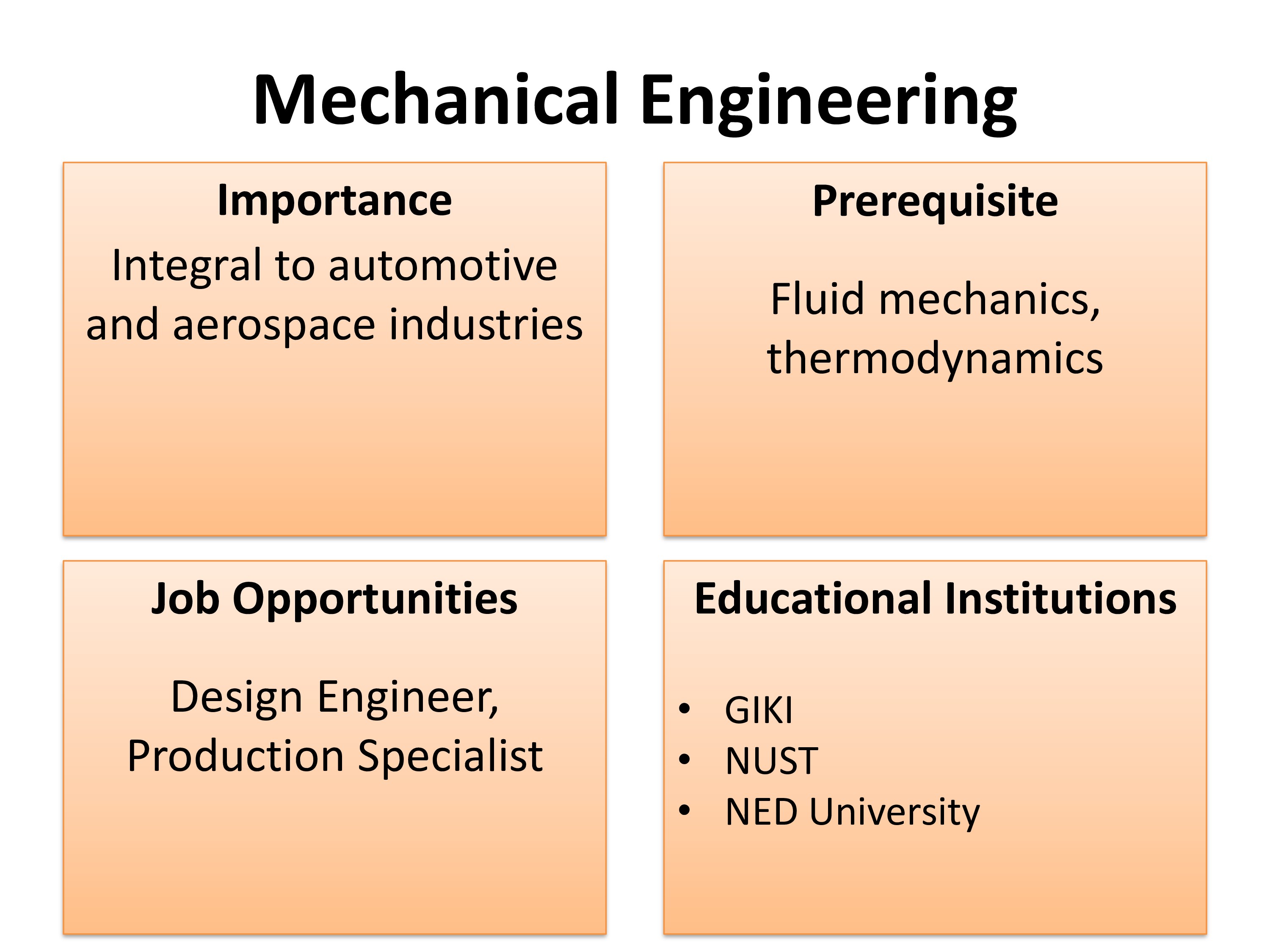
Question: Recent Research Areas & Top International Companies:
Answer: ⬇
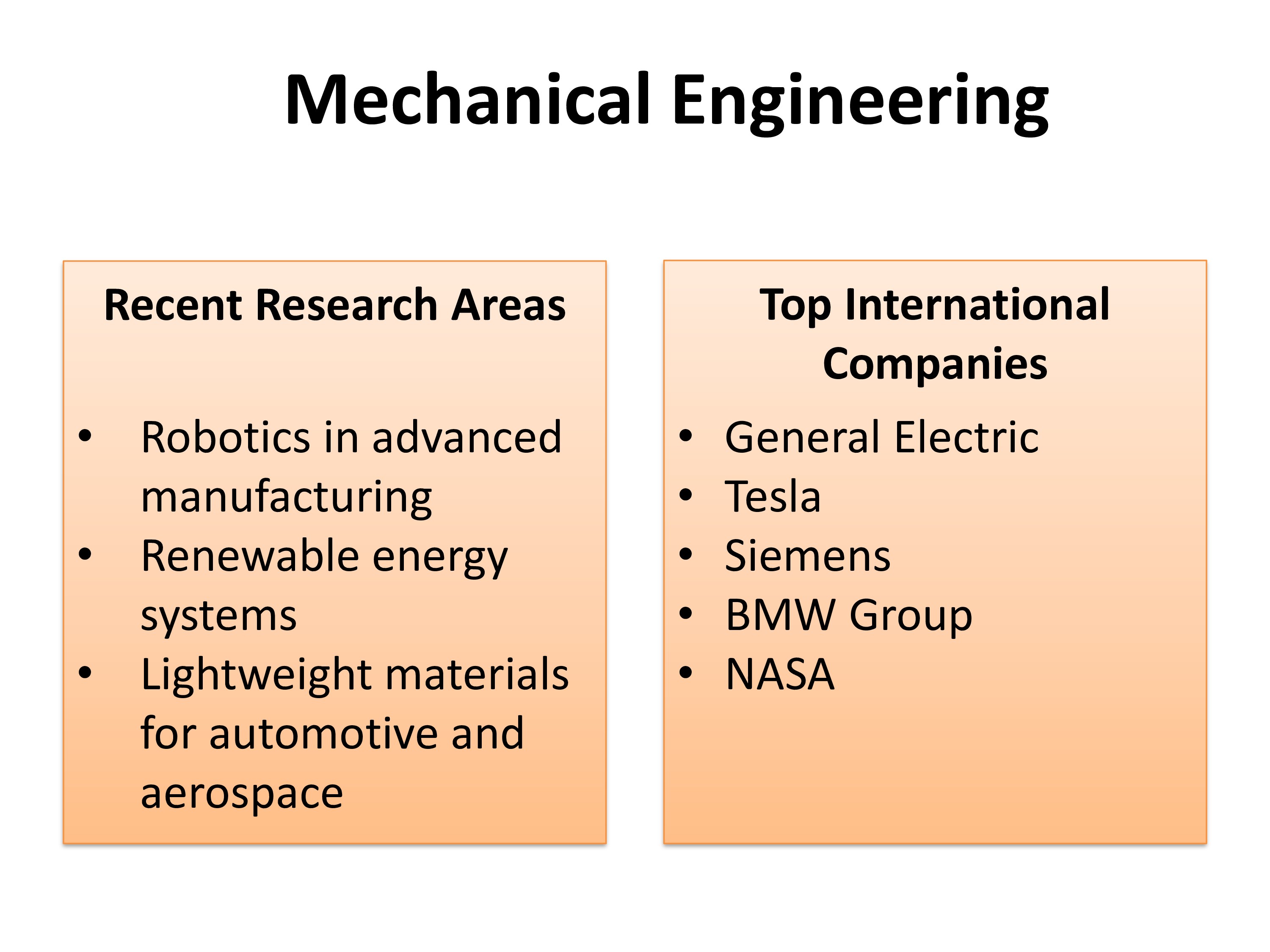
Question: Importance or Significance of the Subject Nationally/Internationally:
Answer: Helps develop skill sets and knowledge required in automobile, aviation, process, manufacturing industries
Question: Subsections of This Field and Their Utilization:
Answer: Refrigeration and cooling – Utilization in design of HVAC systems. Internal combustion engines – utilisation in design of automobile engines. Thermodynamics and fluid mechanics – utilisation in design of aircrafts. Design of machine elements – utilisation in the same
Question: Opportunity Areas for Jobs and Business:
Answer: Opportunities in process, automobile, aviation and manufacturing industries
Question: Students’ Career Growth and Comparison with Other Fields:
Answer: Students’ career growth is fast paced as the skill set acquired can be applied to numerous fields of work and industries
Question: Financial Attraction and Comparison with Other Fields:
Answer: Payscale can vary depending on the industry where the students are employed
Question: Research Work and Future Offshoots:
Answer: Mechatronics, fluid mechanics, thermodynamics
Question: Best Educational Institutions:
Answer: GIKI
Question: Scope of job in government, private sector, multinational companies or at international level:
Answer: Scope of job is huge in all sectors as the skill set acquired can be applied to numerous fields of work and industries
Question: Recommendation Considering Pakistan’s Economic Conditions:
Answer: Yes
Question: Importance, Pre-Requisites, Job Opportunities and Educational Institutes:
Answer: ⬇
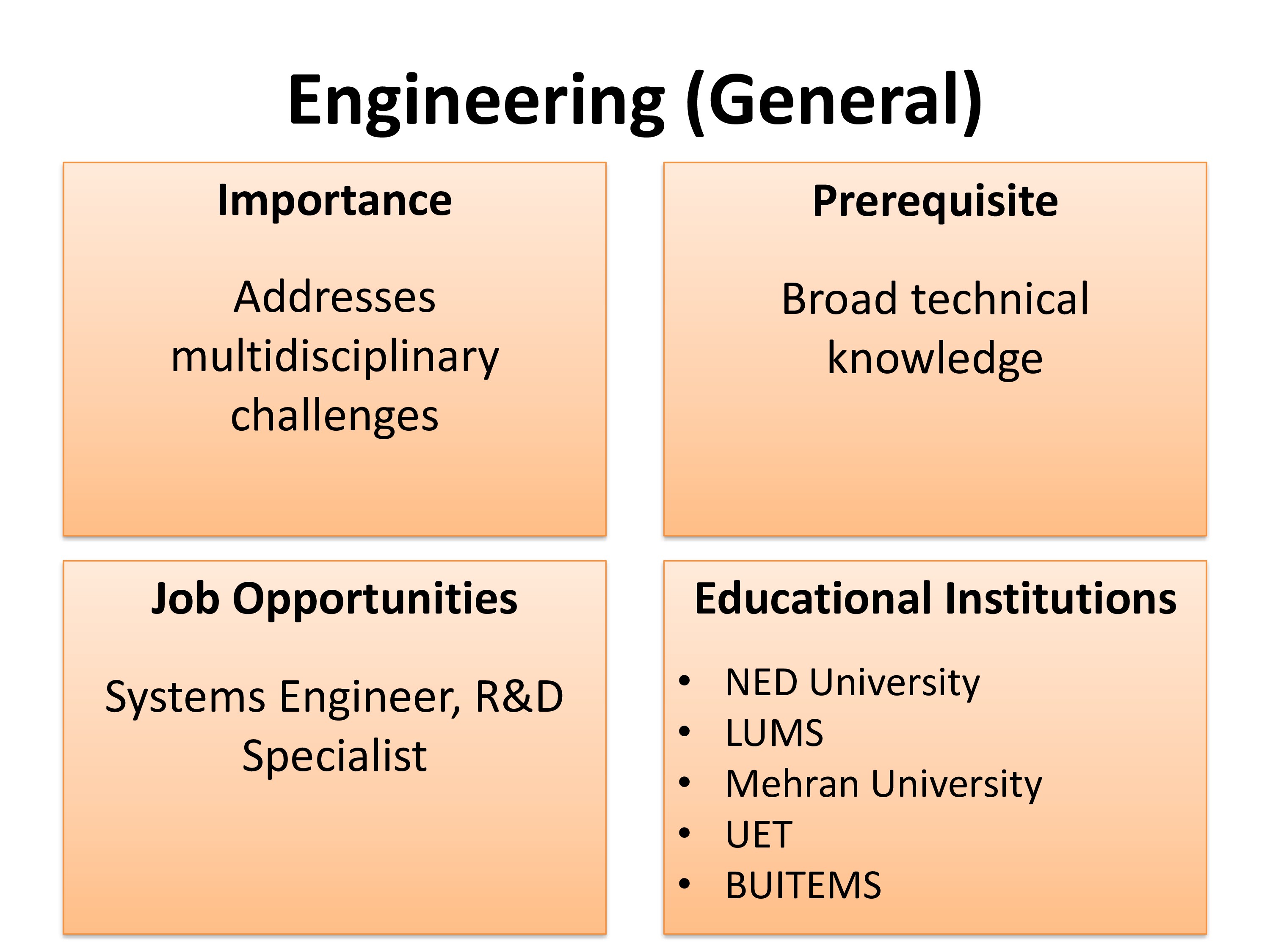
Question: Recent Research Areas & Top International Companies:
Answer: ⬇
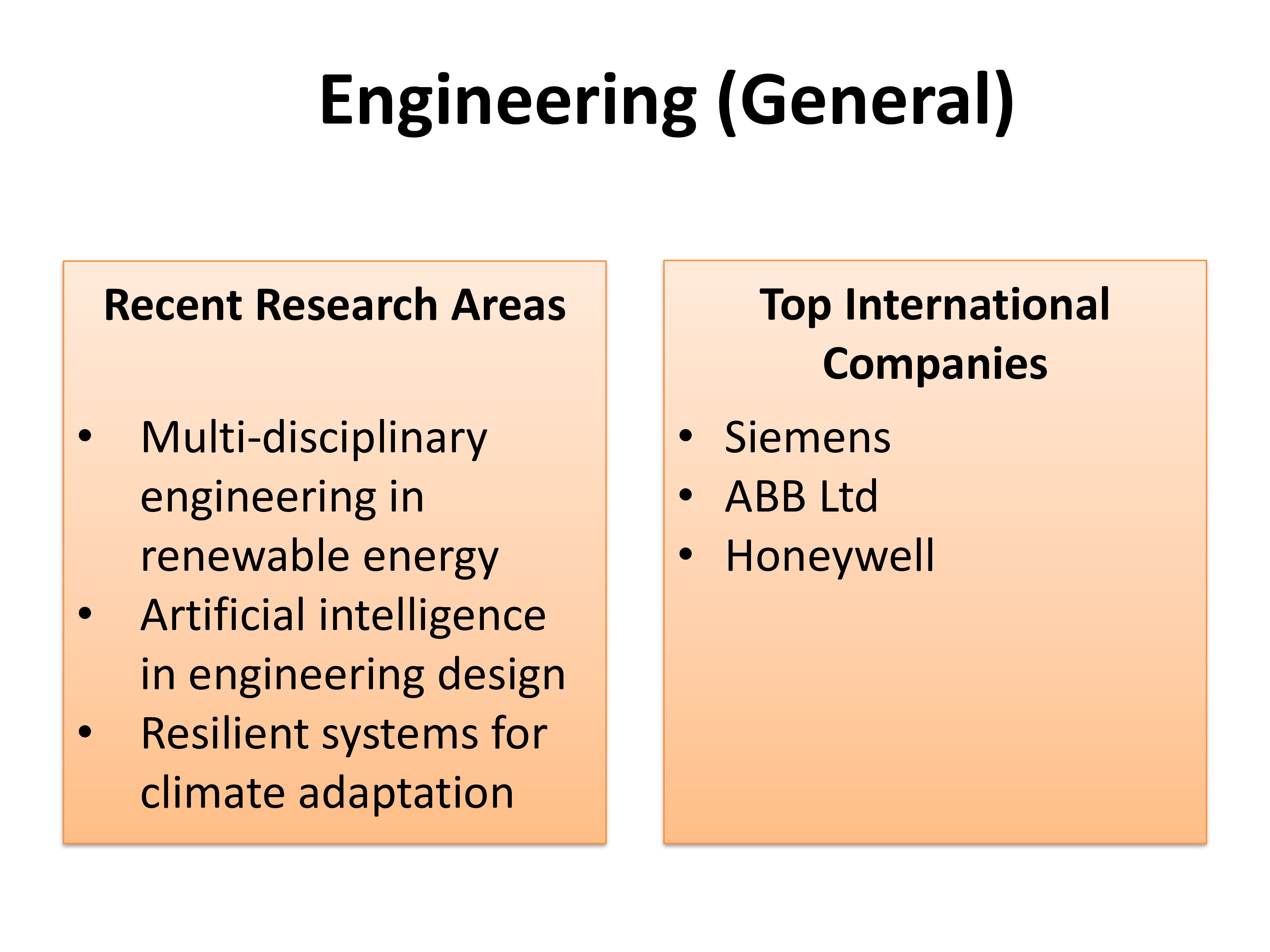
Question: Importance or Significance of the Subject Nationally/Internationally:
Answer: Engineering is pivotal for the industrial development both at national and international level. Engineering shapes the society by developing socioeconomic solutions for the betterment of human kind. There are numerous engineering applications that makes engineering important for development.
Question: Implication in Society and Corporate Sector:
Answer: Engineering affect almost all areas of life. Some common examples are construction industry, communication, automotive, mechanical, power, etc. The society is heavily influenced by the engineering solutions in different area of life. Engineering also plays an important role in the corporate sector as no industry can survive without relevant engineering expertise.
Question: Subsections of This Field and Their Utilization:
Answer: There are many subsection of engineering filed Some common examples include: 1. Civil/construction/urban engineering that deals with the construction & infrastructure development, urban planning and advancement 2. Electrical/electronic engineering that deals with the power generation, distribution and control. Moreover, it also deals with the industrial innovation and electronic solutions. 3. Mechanical/manufacturing/automotive engineering is extremely important for all types of process industries 4. Computer/software engineering deals with development of hardware and software solutions in the filed of computers. 5. Textile engineering deals with the processes associated with the textile industry 6. In addition to the abovementioned fields there are number of specialized engineering disciplines focusing on the relevant industries. The examples of such disciplines include petroleum engineering, telecommunications engineering, biomedical engineering, polymer engineering, material engineering, metallurgical engineering etc.
Question: Opportunity Areas for Jobs and Business:
Answer: Engineering education leads to the job prospects in the relevant industries both at national and international levels.
Question: Students’ Career Growth and Comparison with Other Fields:
Answer: Engineering filed is associated with significant career growth based on the skills and experience. In addition to the job prospectus engineering profession has significant potential for growth as entrepreneur and startups.
Question: Financial Attraction and Comparison with Other Fields:
Answer: The engineering field is associated with reasonable financial benefits. Just for comparison purpose the engineers start their job in grade 17 for the government jobs. In private sector, the financial benefits sometimes exceed that of governmental jobs.
Question: Other Attractions Besides Financial Benefits:
Answer: In addition to the financial benefits, there can be opportunities to engage in the research and development activities. Other attractions include innovation, global impact, flexibility, diverse career paths, engaging problem-solving, and entrepreneurship opportunities.
Question: Research Work and Future Offshoots:
Answer: All engineering fields are associated with research and development activities. In addition to the discipline specific research, there is huge potential for interdisciplinary research. The emerging fields in the areas of engineering have significant research potential.
Question: Best Educational Institutions:
Answer: There are many good institutions for engineering education in Pakistan. Focusing on the public sector institution following can be reasonable choice based on their locations • NED University, Karachi • Mehran University, Jamshoro • UET, Lahore • UET, Taxila • UET, Peshawar • BUITEMS, Quetta • NUST, Islamabad
Question: Scope of job in government, private sector, multinational companies or at international level:
Answer: Engineering jobs are available in all the sectors including private industries, governmental bodies, multinational companies etc. The nature of jobs generally depends on the chosen engineering field. Moreover, engineers generally take up managerial positions in the industry.
Question: Recommendation Considering Pakistan’s Economic Conditions:
Answer: Yes. Highly recommended
Question: Importance, Pre-Requisites, Job Opportunities and Educational Institutes:
Answer: ⬇
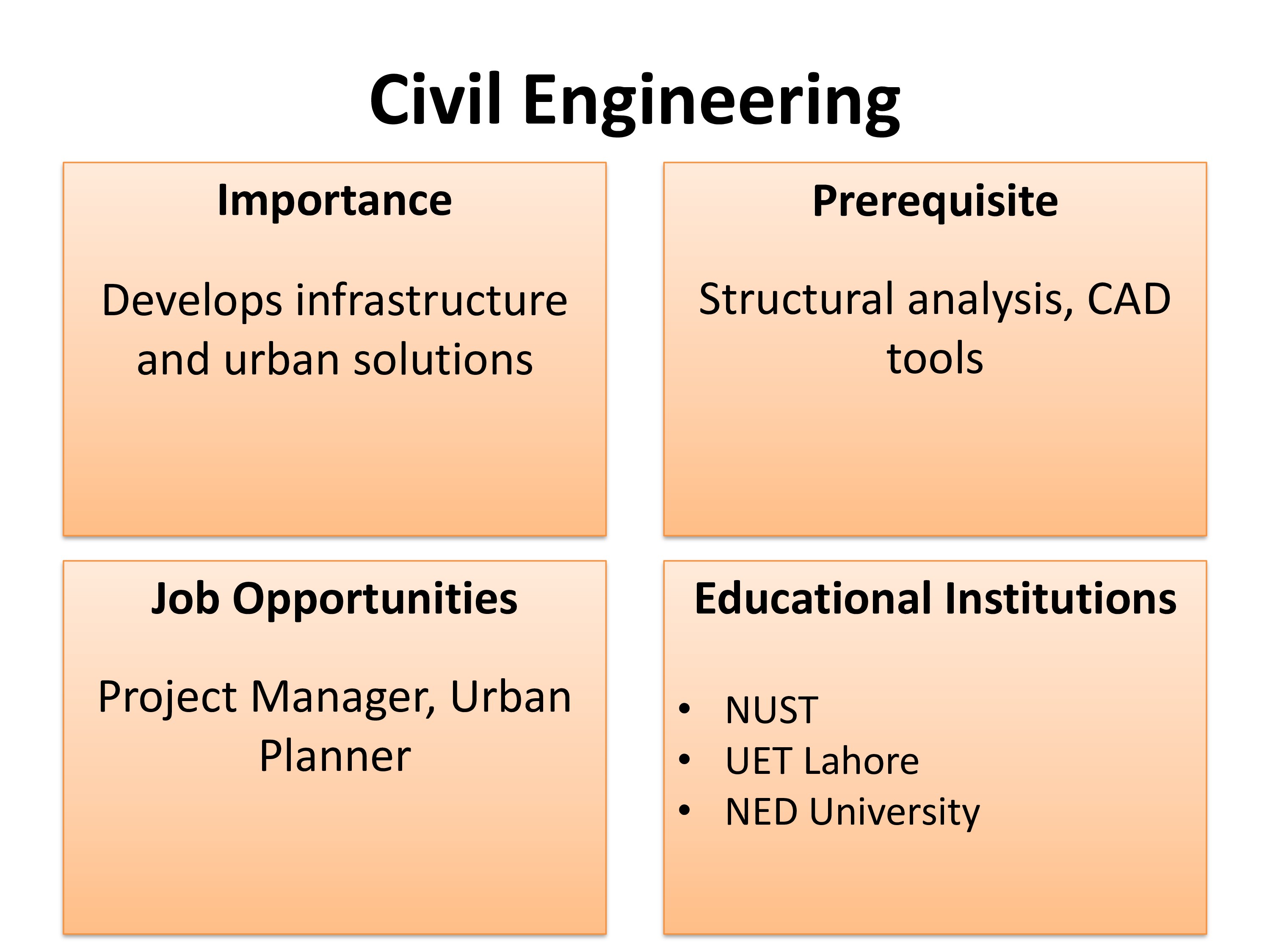
Question: Recent Research Areas & Top International Companies:
Answer: ⬇
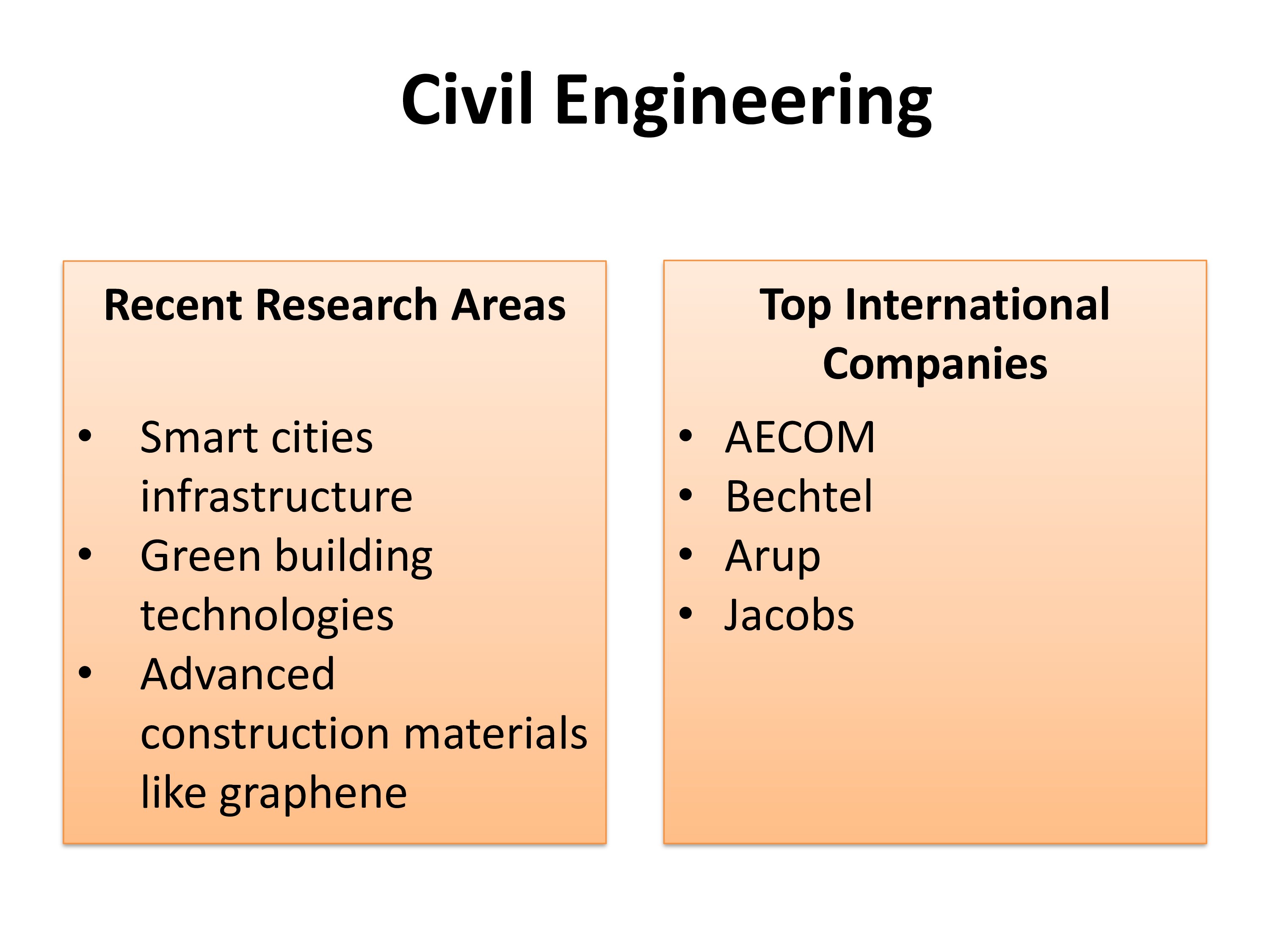
Question: Importance or Significance of the Subject Nationally/Internationally:
Answer: Civil engineering is crucial both nationally and internationally as it forms the backbone of infrastructure development. In Pakistan, civil engineering is essential for addressing the country's growing needs for transportation networks, water supply systems, energy projects, and urban development. Globally, civil engineers play a pivotal role in developing sustainable cities, improving disaster resilience, and advancing construction technologies.
Question: Implication in Society and Corporate Sector:
Answer: Civil engineering directly impacts society by improving living standards through infrastructure development, such as roads, bridges, dams, and public buildings. In the corporate sector, civil engineers are critical in planning and executing large-scale construction projects, ensuring safety, efficiency, and environmental compliance.
Question: Subsections of This Field and Their Utilization:
Answer: Civil engineering is divided into several subsections, some of them are: Structural Engineering: Focuses on designing and analyzing buildings, bridges, and other structures to ensure they can withstand loads and forces. Geotechnical Engineering: Involves the study of soil and rock behavior to design foundations, retaining walls, and other sub-surface structures. Transportation Engineering: Deals with the planning, design, and management of transportation systems like roads, highways, airports, and railways. Water Resources Engineering: Concentrates on the management of water resources, including the design of dams, canals, and water supply systems. Environmental Engineering: Focuses on sustainable design and managing environmental issues like waste disposal, pollution control, and water treatment.
Question: Opportunity Areas for Jobs and Business:
Answer: There are numerous opportunities in civil engineering for both jobs and entrepreneurship in Pakistan: Jobs: Government infrastructure projects, private construction companies, consultancy firms, and international organizations like the World Bank and the Asian Development Bank. Business: Starting a construction company, consultancy firm, or materials supply business are viable options.
Question: Students’ Career Growth and Comparison with Other Fields:
Answer: Career growth in civil engineering can be robust, with opportunities for rapid advancement through project management, specialization, or further education. Compared to fields like IT or finance, civil engineering may have slower initial growth, but it offers long-term stability and significant growth potential, especially with experience.
Question: Financial Attraction and Comparison with Other Fields:
Answer: Civil engineering can be financially rewarding, particularly in large-scale projects or in management roles. Compared to IT or business management, starting salaries may be lower, but experienced civil engineers can earn competitive salaries, especially in roles requiring specialized skills or overseas projects.
Question: Other Attractions Besides Financial Benefits:
Answer: Civil engineering offers the satisfaction of contributing to society by building infrastructure that improves people's lives. The field also provides opportunities to work on diverse projects, travel, and solve real-world problems, which can be intellectually stimulating and fulfilling.
Question: Research Work and Future Offshoots:
Answer: Research in civil engineering is focused on sustainable construction materials, earthquake-resistant designs, smart cities, and infrastructure resilience. Future offshoots could include advancements in green building technologies, 3D printing in construction, and AI-driven project management.
Question: Best Educational Institutions:
Answer: Some of the best institutions in Pakistan for civil engineering include: National University of Sciences and Technology (NUST), Islamabad University of Engineering and Technology (UET), Lahore NED University of Engineering and Technology, Karachi
Question: Scope of job in government, private sector, multinational companies or at international level:
Answer: Civil engineers have a broad scope of employment: Government: Infrastructure development projects, public works departments, and regulatory bodies. Private Sector: Construction firms, consultancy firms, and real estate developers. Multinational Companies: Engineering firms, construction giants, and international NGOs. Internationally: Opportunities in the Middle East, Europe, and North America, particularly in project management and specialized engineering roles.
Question: Recommendation Considering Pakistan’s Economic Conditions:
Answer: Given the current economic conditions in Pakistan, civil engineering remains a viable and promising field, especially considering the ongoing infrastructure development needs. However, students should be prepared for the challenges of the job market and may need to consider further specialization or international opportunities.
Question: Additional Information or Advice for the students pursuing this field:
Answer: Skill Development: Focus on developing technical skills, project management, and proficiency in software like AutoCAD, Revit, and Primavera. Networking: Build a strong professional network through internships, industry conferences, and professional societies. Continuing Education: Consider pursuing further studies or certifications in areas like structural engineering, environmental management, or construction management to stay competitive in the job market.
Question: Importance, Pre-Requisites, Job Opportunities and Educational Institutes:
Answer: ⬇
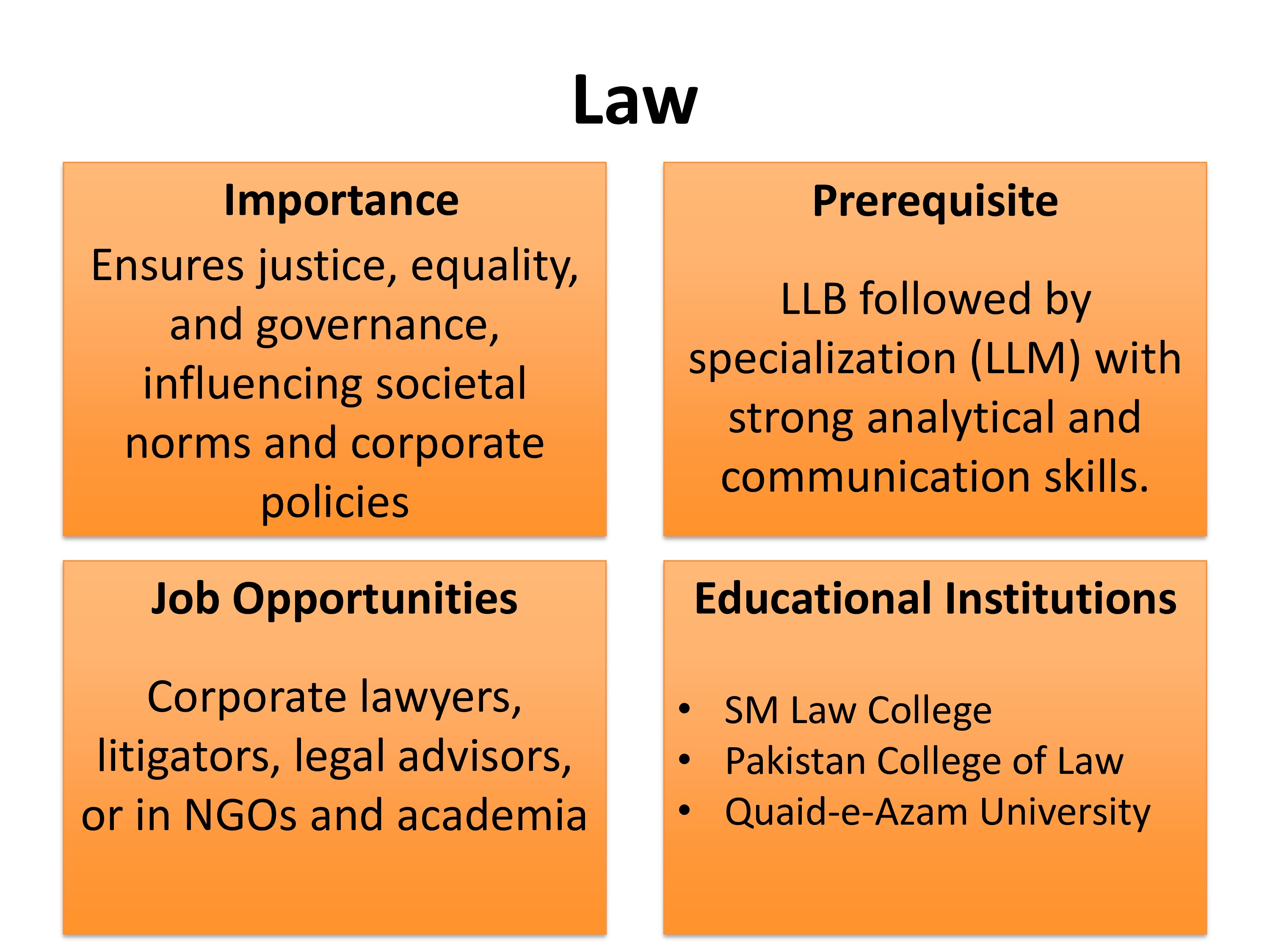
Question: Recent Research Areas & Top International Companies:
Answer: ⬇
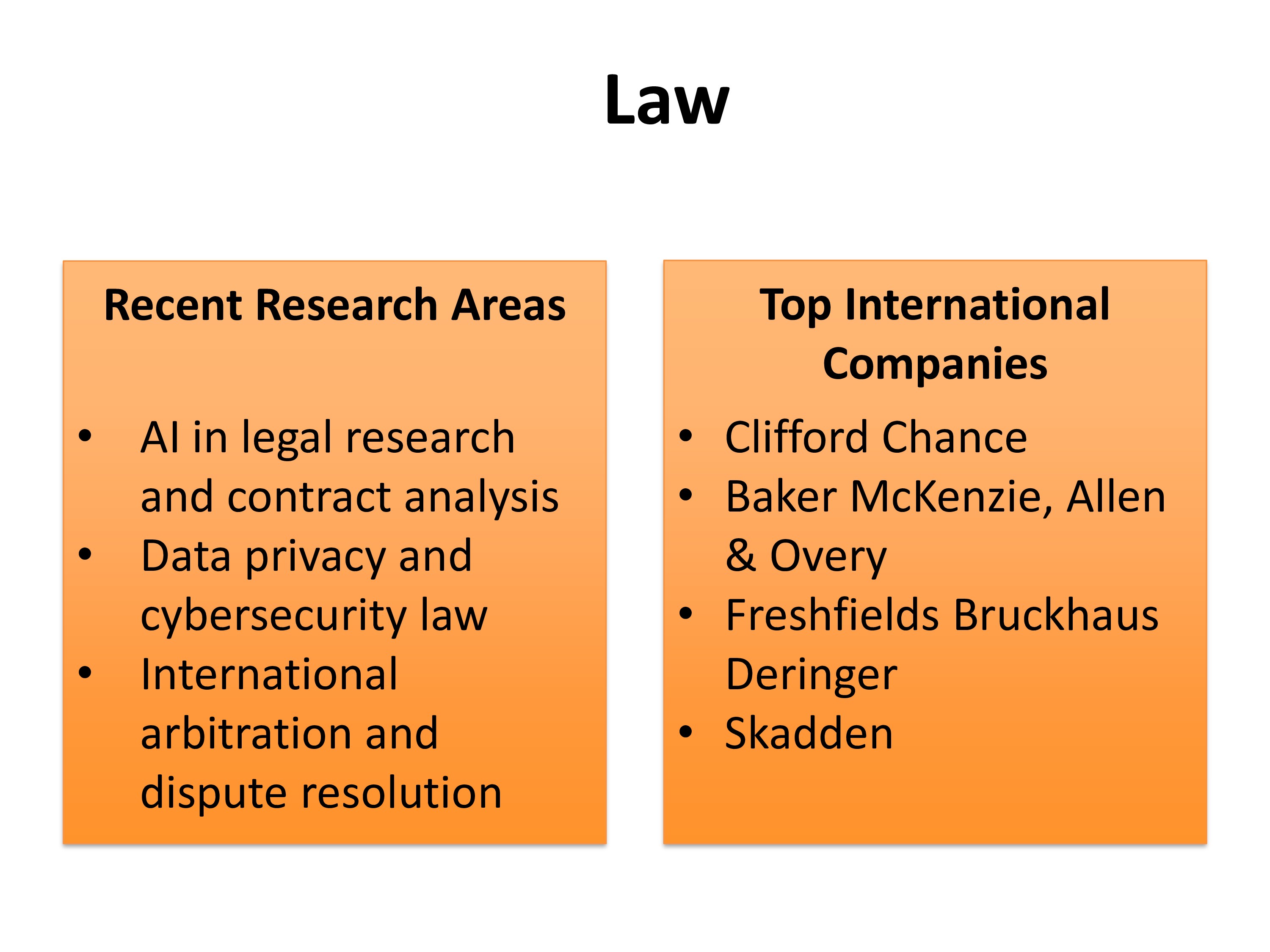
Question: Importance or Significance of the Subject Nationally/Internationally:
Answer: Law is a very fundamental aspect of ensuring peace and harmony in society. For as long as people and companies exist, there will be conflicts which would require application of law to resolve them. By choosing law as a subject, one can build knowledge to either become a corporate lawyer, litigator or in-house lawyer.
Question: Implication in Society and Corporate Sector:
Answer: There are great advantages of studying law for the society. One can contribute through being a human rights lawyer and help the underprivileged segment of society. As far as corporate sector is concerned, there are rules and regulations that companies need to abide by and there are disputes that may arise which require a lawyer to liaison with regulatory authorities and plead cases in courts.
Question: Subsections of This Field and Their Utilization:
Answer: There are no sub sections as such. Rather, there are different types of laws that one can specialize under and there are three different types of lawyers one can become which are corporate lawyer, litigator and in-house lawyer.
Question: Opportunity Areas for Jobs and Business:
Answer: There are many jobs available for lawyers from working at law firms to NGOs to companies and nowadays remotely as well. It is not necessary that one has to be a practicing lawyer after studying law. A lot of people choose teaching as their career path or at times as a part-time job alongside their full-time job.
Question: Students’ Career Growth and Comparison with Other Fields:
Answer: In Pakistan, it is getting more and more difficult to secure jobs as a fresh graduate due to limited career opportunities. There are very few positions in law firms and companies. I cannot compare law with other fields because that would amount to generalisations and also because I lack knowledge about other fields.
Question: Financial Attraction and Comparison with Other Fields:
Answer: Initially, junior lawyers earn a very meagre salary especially at law firms. It takes almost ten years to become a partner and that is when you start earning decent money. If a law graduate joins a company and becomes in-house lawyer then entry level salary is much better than at law firms. I would refrain from comparison with other fields because of the same reason mentioned above.
Question: Other Attractions Besides Financial Benefits:
Answer: If you like helping people, then a career as a human rights lawyer is very fulfilling. Law is a very interesting field and intellectually incredibly rewarding. You can even become a judge and make a huge difference in the society by passing sound judgments.
Question: Research Work and Future Offshoots:
Answer: In Pakistan, there are very few think tanks that are doing research work in the field of law. However, in near future, there is a possibility that NGOs conduct research work.
Question: Best Educational Institutions:
Answer: I would recommend studying from a good institution abroad which are many. However, if you cannot afford to study abroad, then LUMS in Lahore is a good option.
Question: Scope of job in government, private sector, multinational companies or at international level:
Answer: I am not sure of the scope in government sector but in private sector which includes multinational companies, there are very limited vacancies and the competition is fierce. Hence, one should not limit to working only for big companies and at times working for smaller companies can give you much more experience. Internationally, you need to be very careful which jurisdiction you plan to work as the laws and degree requirements vary from one country to another.
Question: Recommendation Considering Pakistan’s Economic Conditions:
Answer: Yes, I would recommend this course but only to those who are very serious about it and those who are ready to face very challenging environments in courts at the cost of very low salary in the beginning.
Question: Importance, Pre-Requisites, Job Opportunities and Educational Institutes:
Answer: ⬇
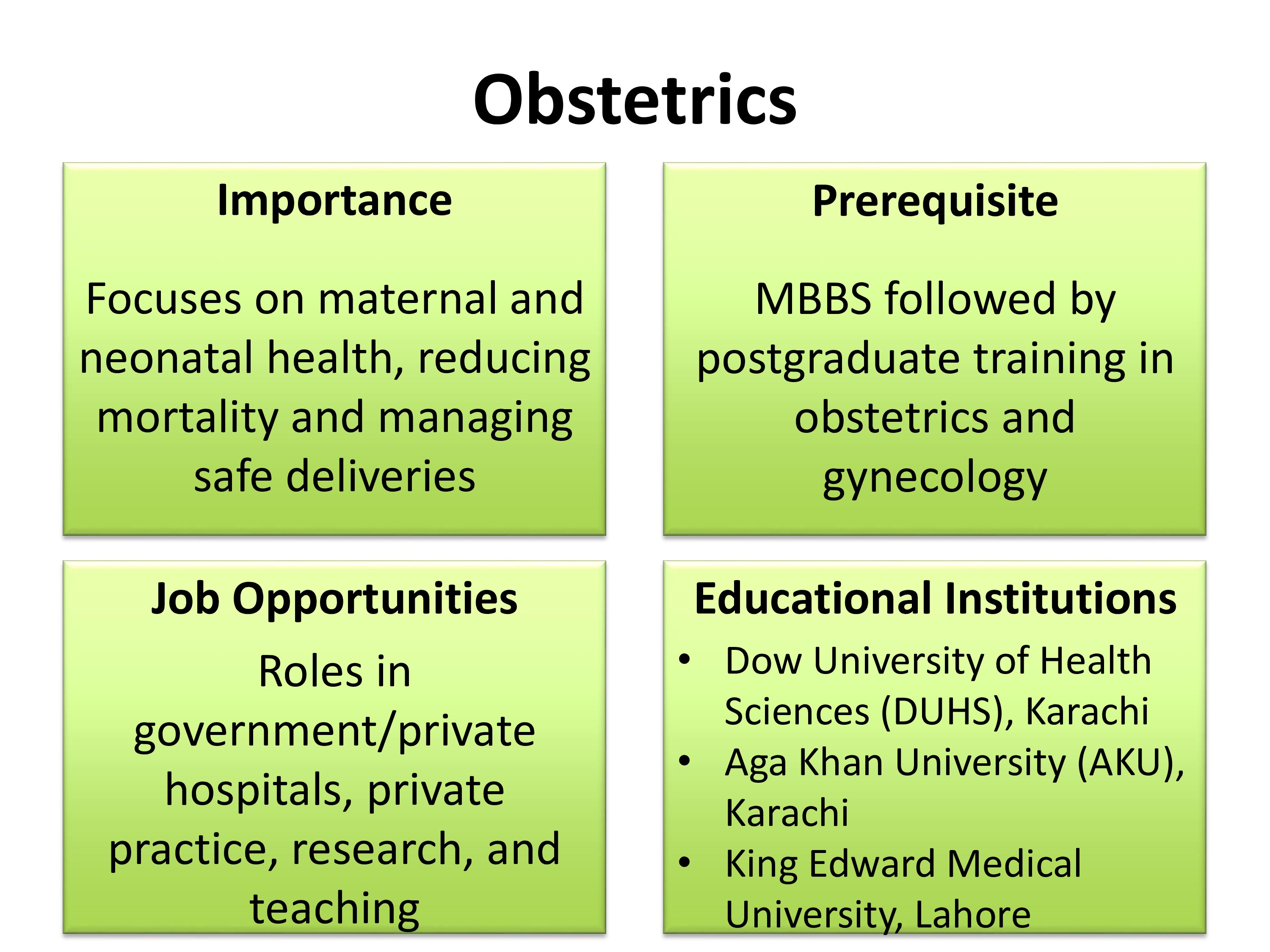
Question: Recent Research Areas & Top International Companies:
Answer: ⬇
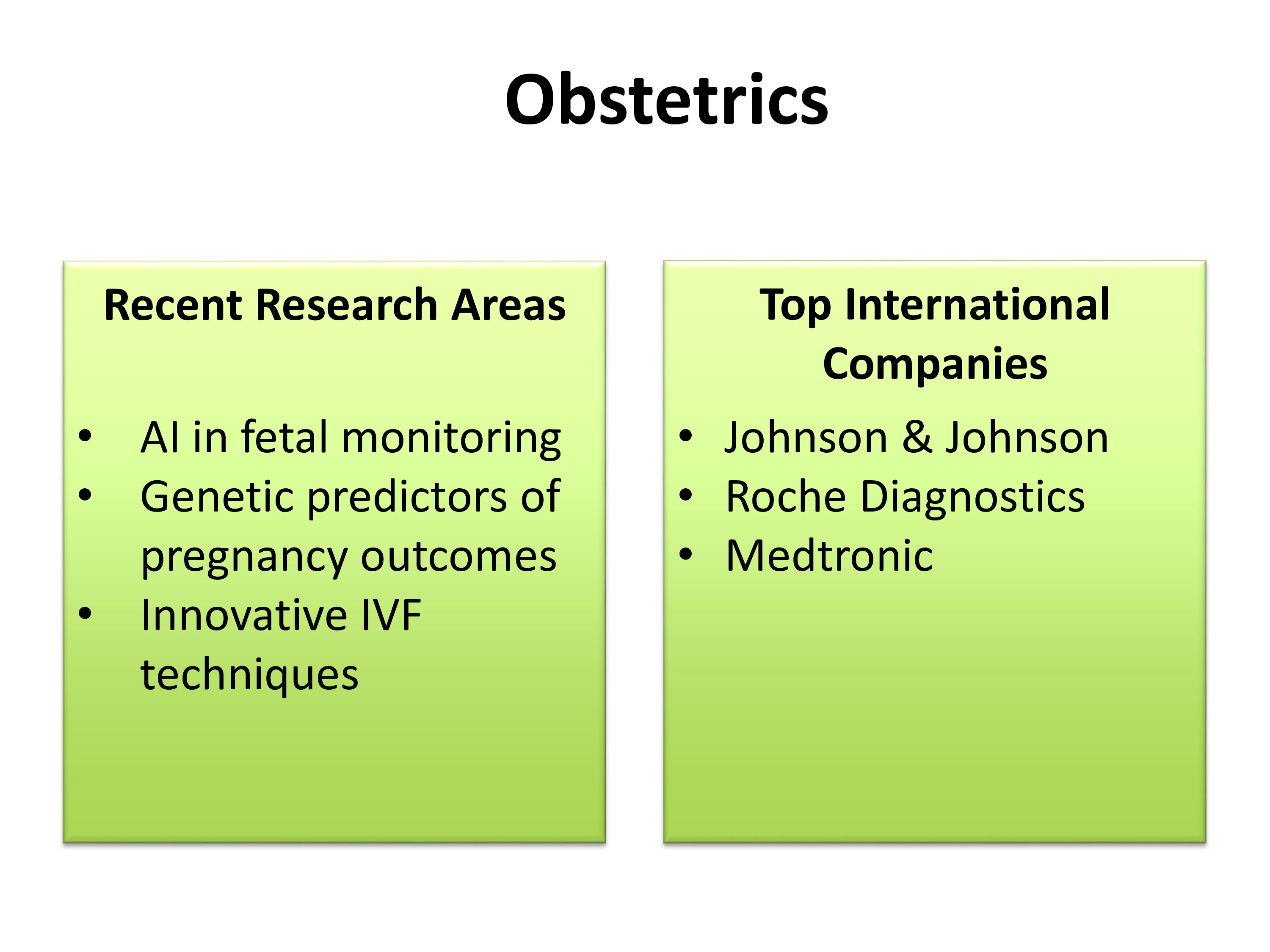
Question: Importance or Significance of the Subject Nationally/Internationally:
Answer: Being one of the most important fields of medicine, obstetrics deals with the health of a pregnant lady and her baby and is really significant for the outcome of pregnancy.
Question: Implication in Society and Corporate Sector:
Answer: we can implement our knowledge and understanding in this field to handle the complications that can possibly face by a pregnant patient during her pregnancy.
Question: Subsections of This Field and Their Utilization:
Answer: Gynecology can be considered its subsection which mainly deals with different surgeries and oncology.
Question: Opportunity Areas for Jobs and Business:
Answer: Govt and private hospitals and even private clinics and also job opportunities in abroad can be considered.
Question: Students’ Career Growth and Comparison with Other Fields:
Answer: Students after getting their mbbs done can study further higher like fcps, mrcog which i think open doors for better income opportunities which I think not possible in every other field.
Question: Financial Attraction and Comparison with Other Fields:
Answer: Financial attractions depends on the level of grade we are posted in different hospitals and also number of jobs a doctor doing.
Question: Other Attractions Besides Financial Benefits:
Answer: Besides earning good a doctor can also get chance to present its field of interest in different areas of world.
Question: Research Work and Future Offshoots:
Answer: Research work allow to explore different other expects of this field like Invitro fertilization, oncology, health issues in puerperium so that maximum benefit can be obtain after applying those researched options in this field.
Question: Best Educational Institutions:
Answer: Down, smc for doing mbbs and civil, jinnah, and agha khan hospitals are considered best for fcps training.
Question: Scope of job in government, private sector, multinational companies or at international level:
Answer: Due to saturation of seats in govt hospitals, that’s really difficult to find jobs there as compare to private hospitals.
Question: Recommendation Considering Pakistan’s Economic Conditions:
Answer: Yes, I do recommend this course.
Question: Additional Information or Advice for the students pursuing this field:
Answer: I must say if you are really keen of studying, then only you are welcome in this field as it demands a lot of sacrifices and hard work.